#basically i had the realization recently that 'a modern ghost story' to me feels less like. an actual ghost story.
Explore tagged Tumblr posts
Text
roach-centric 'a modern ghost story' thoughts:
there's still supernatural stuff happening, but i might take the void-walkers out of it and just let them run free.
the base premise is still the same. it's about a group of ghost hunters investigating a haunted house to help the family living there.
the ghost hunters are still: syd ambrose, yara key, oliver cox, and roach. the difference here is just that the story focuses more on roach (and oliver as well by extension) than the others.
syd and yara also still have their own storyline as well and don't just exist to further roach's, but the story itself is focused on roach.
the main thesis of "ghosts are just people who are afraid to let go" is still present.
however, even with all the supernatural stuff, the main focus is now on roach's journey, growth, and recovery, and the real "ghost story" is the shit they can't quite let go of.
the ghosts are real but so are these people's problems <3
#multi makes text posts#a modern ghost story#modern ghost story renaissance let's go#basically i had the realization recently that 'a modern ghost story' to me feels less like. an actual ghost story.#and more like a multi-lefaiye classic where i have someone's past come back to haunt them#and considering my plans for vulture. this makes sense.
7 notes
·
View notes
Text
How The Evans (+ Quicksilver) Would React To Yoplait’s New Gushers Yogurt
a/n: I don’t honestly know how I came up with this. I guess I just really liked the yogurt I bought (I have big Gilear Faeth vibes rn) and decided I wanted to share it with all the Evans and you guys. I hope you enjoy and, like, maybe go buy some if you’re intrigued.
Warnings: Mild language, very small non-graphic mention of murder, recreational drug usage (Tate is a stoner, sue me)
--------

Tate Langdon
Because he died as a teen in the early 90′s, Tate would be a big fan of the types of crazy, super processed and flashy snacks that came out of that era.
Tate pretty much lived on 3D Doritos and Crystal Pepsi before his death. He still misses Dunkaroos.
He also has the biggest appetite of any ghost in the house because when he smokes he gets phantom munchies, so he sneaks into the kitchen and steals snacks to fulfill his cravings.
His first encounter with gushers yogurt would be on a snack run for the two of you while you were both zooted to high hell.
He would return almost entirely snackless, fully fixated on the little yellow cup in his hand.
“What the hell is this?” “Uh, yogurt?” “No, it’s not just yogurt, it’s weird!”
You’d finally look up from your place on the bed to find Tate in the doorway, red eyed, giving the yogurt cup a thousand yard stare.
Tate would be extremely confused because as far as he knew gushers were filled fruit snacks and definitely did NOT belong inside yogurt.
“Does it have gushers in it or something? Because that sounds awful,” “Kind of? It’s like... well, it would be easier to show you than to explain it. Did you bring a spoon?”
Of course he hadn’t.
When he did return with a spoon the two of you shared it.
Unsurprisingly, Tate didn’t hate it. It was a little weird, but overall it reminded him of the rare good times he had when he was still alive and the house hadn’t fully sunk it’s claws into him yet.
His favorite flavor is green apple. It just matches his vibe.
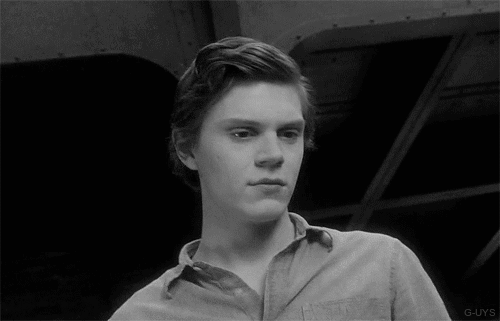
Kit Walker
Kit is a man with pretty old fashioned values. He’s the kind of person who believes that he should be able to provide for his family so you don’t have to work. He also thinks it’s important for you to spend time with the kids because he’s gone at work so much.
This whole situation combined with the fact that money was a little tight led to you taking Thomas and Julia with you whenever you had to run errands and they weren’t at school.
One such time you were grocery shopping. That’s when they found the gushers yogurt.
Kids have an eye for sweet things. Any food labelled like a dessert will make them go crazy, even if it’s just a flavored yogurt.
In the end you bought a few. They were cheap enough that they didn’t make a huge difference to your budget and they were perfect to go in the kids lunches.
Only the next morning did you realize that when you got the kids their yogurts you forgot to get Kit his own plain ones to put in his lunch. You mulled over your options and, in the end, decided to give Kit one of the gushers ones in his lunch pail for work. it’s just flavored yogurt, what could go wrong?
A lot, apparently.
At around lunch time you got a call from Kit at the shop.
“Mrs. Walka’, I believe I might have picked up the wrong lunch today,”
You’d immediately ask him what was wrong before remembering the yogurt.
“Nope, that’s yours Kit,” “Sweetheart, you’re killing me,” “Did I forget a spoon?”
Kit would explain, after some laughter, that the guys at the auto shop were giving him shit about the ‘kids yogurt’ in his lunch.
If you tried to apologize he’d stop you. It was all the same to him, he just wanted to make sure he hadn’t taken one of the kid’s lunches accidentally.
You’d laugh about it later as a bright spot in what ended up to be a long and tedious day for the both of you.
Besides that one occasion Kit wouldn’t eat gushers yogurt often, but sometimes if he was home during breakfast he’d have a cup of it with his cereal or toast.
He’s a fan of the classics, so his favorite flavor is tropical punch.

Kyle Spencer
Before his death, Kyle wouldn’t have any strong feelings towards gushers yogurt besides liking that it was a cheap snack that went on sale a lot.
As a broke college student with a calcium deficiency, he would appreciate it for what it was, a sweet means to an end.
After his death, though, it would be a different story.
Franken-Kyle had to re-learn all of his basic life skills from the ground up after the accident, which meant chewing food and not choking weren’t things he knew how to do automatically
In the time while he still couldn’t eat by himself, you fed him a lot of yogurt.
Most of the time it was cheaper and more pleasant that the baby food or health puree alternatives. It also was a food he had eaten pretty regularly when he was alive, so you thought it might make him happy to have some sense of normalcy in his new world.
He enjoyed the gushers yogurt particularly for a few reasons.
For one, it had fun colors! The bright reds, blues, and greens were entertaining and more mentally stimulating than the normal neutral colors of his food. It was also sweet, kind of like a dessert instead of a meal.
The big selling point, though, was the popping bubbles inside.
For a while after his death all Kyle ate were smooth semi-liquid foods he couldn’t possibly choke on while he re-learned how to feed himself. Gushers yogurt, though, had little popping bubbles that added texture while also not being large enough to choke on.
It was a win-win for both of you.
Even once Kyle had regained his ability to chew and eat normally, he still liked to have gushers yogurt with his breakfast.
“Bu...bbles,” “Huh?” “I want....bubbles” “Oh! You want the yogurt with the bubbles, Ky? I’ll get it in a second,”
He wouldn’t have the words to express it, but the real reason Kyle likes gushers yogurt and continues to eat it is that it reminds him of you and the time you spent together while you taught him how to live again.
His favorite is blue raspberry by a large margin. He enjoys tropical punch too, but he dislikes green apple.

Jimmy Darling
Jimmy has very few opinions when it comes to food. To him, eating is just something he has to do to keep himself alive and performing, so he doesn’t put much thought into what and when he eats, even at the diner.
When you first met him, he was barely eating one good meal a day just because he was so busy.
So, one of the things you started to do when you and Jimmy got closer was bring him little snacks throughout the day he could eat quickly to keep him going.
They weren’t huge things, just an apple here and a sandwich there, but Jimmy really appreciated you putting in the effort to search him out and keep him healthy.
The gushers yogurt would be introduced, once again, because it’s super inexpensive.
You were out shopping for Jimmy’s snacks when you found it on sale, 20 for $10. It was a great deal, and Jimmy’s diet was severely lacking in calcium, so you bought a bunch of different flavors and brought one to him as a trial-run the next day after a performance.
“Hey dollface, you got something for me?” “I just might,”
Only after he swept you up into a crushing hug would you be able to offer him the yogurt, which he’d take gratefully and eat in less than a minute.
You took this as a good sign, and ended up buying some for Jimmy whenever it was on sale.
He asked you about why you bought them once and you genuinely couldn’t give him an answer. You just thought they were an easy snack and found they were on sale a lot more often than other things were.
Jimmy doesn’t have a favorite flavor, but if you asked him he’d just respond with whatever your favorite was.

James Patrick March
James Patrick March doesn’t usually have strong feelings about trivial things. As a serial killer and a ghost, small strange details of life in the 21st century just aren’t important enough for him to care about. Even modern foods with all of their artificial dyes and preservatives don’t tend to bother him. Well, all except one...
He fully believes that gushers yogurt is the worst, most evil thing that man has ever created in history, including himself.
It is entirely irrational how much he hates it.
The weirdest part is that he doesn’t mind how it tastes, he just has a random grudge against it by principle.
The first time he saw it was after Liz picked some up for you while she was out getting some groceries for the hotel.
James had come into the habit of asking you to make him grocery lists so the hotel had foods you enjoyed ever since the hoover stew incident. This time you had asked for something sweet you could eat as a snack between meals. Liz ended up picking out the gushers yogurts along with a few other little snacks
When you ran down to the kitchen to help Liz and Iris put the groceries away you grabbed a cup and ended up taking it upstairs so you could eat something while you were reading in bed.
It just so happens that James was finishing up with some office work and walked into your room right as you ate a spoonful of the bright blue yogurt.
He was, to say the very least, concerned.
Why was it that color? Food is not supposed to be that color???? And what were those little lumps?
While he fussed over your health, you held out your spoon and offered him a bite. He was skeptical at first, and his fears were only confirmed when he accepted the bite.
His delicate 1920′s tastebuds couldn’t take it.
“Darling, how do you eat that slop?” “James, it’s just yogurt!” “That is not yogurt, it’s an affront to the universe,”
Never one to back down in the face of James, you asked Liz to keep buying them every time she went out for groceries
Things were quiet until, a few months later, you found James standing over a recent kill eating a gushers yogurt.
“Darling, this isn’t what it looks like,” “I think it’s exactly what it looks like,” “There wasn’t anything else in the fridge,” “James, you’re dead. You don’t have to eat,” “...drat,”
James is adamant that he doesn’t have a favorite flavor because he hates it.... but its actually tropical punch.

Rory Monahan
Rory normally wouldn’t feel any which way about gushers yogurt.
Don’t get me wrong, he’s a goof and has nothing against eating fun little dessert yogurt, there’s just no reason for him or you to buy and eat it.
But if he got a brand deal with Yoplait to advertise it?
Count him in.
You’re eating gushers yogurt with every meal while he vlogs.
Breakfast? Yup. Lunch? Yup. Dinner? Yup.
Oh, you’re getting a snack? Well the only snack Rory bought when he ran out to the store is gushers yogurt.
It’s all over his social media.
He ends up becoming the face of Yoplait and does quite a few primetime commercials, which surprisingly help out with his career. Think what Shaq is the The General Auto Insurance.
“Now with new popping bubbles that gush with roarin’ fruity flavor,” “pffffft!” “What! It’s paying our bills!”
Despite being surrounded by gushers yogurt, Rory wouldn’t actually have a favorite flavor. Once you eat that much yogurt it all tastes exactly the same.
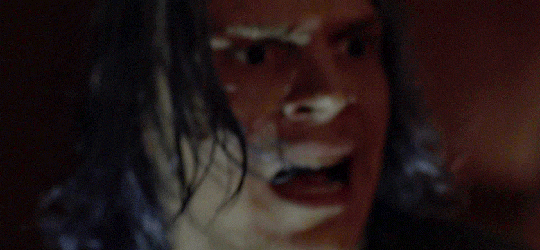
Kai Anderson
Kai... well Kai is a tough one, as usual.
He’s not someone who likes to be perceived as weak, and what’s weaker than a man who’s seen eating flavored yogurt made for kids?
Well, a lot of things, but Kai’s toxic masculinity doesn’t let him see that.
In his eyes, gushers yogurt is simply not befitting of the divine ruler.
If you were close enough to him to offer some in a private moment, he’d probably find some way to use it in a weird, extended metaphor about the world in the hopes of manipulating you.
“In this world there’s people like me, like this yogurt, and people like you, fragile bubbles waiting to burst and spread your issues to the people who can still be saved. People like me cushion-” “Oh shut up and eat your yogurt, Kai,”
Kai doesn’t have a favorite flavor, but kind of like James he’s only being pretentious. Who knew divine rulers are above picking favorite flavors?
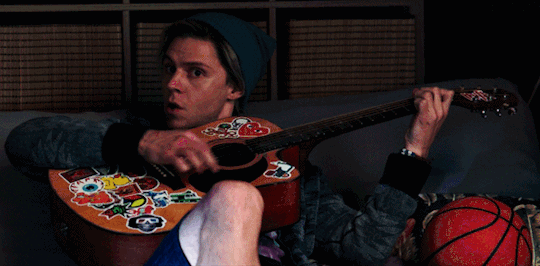
Peter Maximoff
Peter would be the most on-board of anybody on the gushers yogurt trend. Like, even more on board than Kyle.
This man uses a loooot of energy while he’s running around, so he needs super sugary foods like twinkies to be around for his inevitable snackfests at random hours of the day.
He also loves junk food. At one point you started wondering whether the X-gene prevented Peter from getting cavities, because he eats more sugar than anybody else you know.
You like to go shopping with Peter because it keeps him from stealing (well, keeps him from stealing as much, but that’s beside the point) and even though he acts like a literal child whenever you make him come with you, he appreciates slowing down and spending time doing something you like.
Usually he gets bored easily in the “healthy food” aisles at the grocery store, meaning anything that isn’t the soda, chips, or snack aisles, but during a random trip to the store he suddenly rushed off out of your sight while you were in the dairy aisle picking up cottage cheese.
When he came back a second later, his arms were full of yogurt.
“Peter, what are you doing?” “Have you seen these? Look at the flavors! They have starburst, and key lime pie, and gushers with popping beads!!!! Popping! Beads!”
You would try to insist that he didn’t need to buy that much yogurt, especially because he hadn’t tried it before and didn’t know if he’d like it, but Peter would give you his world famous puppy dog eyes and you’d give in.
From then on he’d have gushers yogurt (and starburst yogurt, to be honest) in his mini-fridge most of the time.
You didn’t mind. Technically it was healthier than his twinkie addiction, so as long as your speedster was getting calcium in his diet you weren’t about to complain.
He probably has stronger bones than Wolverine with all the yogurt he eats.
His favorite flavor is green apple, but he’d say it’s blue raspberry to go with his aesthetic.
#evan peters#evan peters x reader#tate langdon#tate langdon x reader#kit walker#kit walker x reader#kyle spencer#kyle spencer x reader#jimmy darling#jimmy darling x reader#james march#james patrick march#james march x reader#james patrick march x reader#rory monahan#rory monahan x reader#kai anderson#kai anderson x reader#peter maximoff#peter maximoff x reader#evan peters imagine
163 notes
·
View notes
Text
WIP Check-In
MiHello my dear followers! I know I’ve been MIA recently (aside from some random meme reblogs) but I’m hoping my life gets a little less crazy and I can make some room in my schedule for tumblr/reading/writing/etc. In anticipation for that, I’ve got a list and some info about some WIPs I have going. Please please please feel free to message about any that intrigue you - talking about them might help me get the gumption to write and/or we might come up with some new plot ideas!
Check under the cut and message me here :) Feel free to ask for more info or for sneak peeks at anything.
In no particular order:
Whiskey Straight (Jack Daniels x F!Reader) I promise I’m still working on this! My current plan is that I will rewrite what exists, finish the whole thing, and then remove what exists when I’m reading to repost. Once it’s done, it will be a weekly posting.
Untitled Professor Marcus Moreno smut Lord give me the motivation to finish this one. I’ve been working on it for so long and I think there are a lot of people on here who want to read about subby Marcus being such a good boy... It’s basically subby Professor Moreno getting his world rocked by his wife when she comes to visit him in his office. What more could you want?
Untitled Oberyn x F!OC x Ellaria, reincarnation multi-fic This story haunts me to the point where I’ve considered if I should create all original characters and try to publish it as an original story, but every time I’ve thought about taking Oberyn and Ellaria out of it, my brain just goes “nope, not happening then.” This could be considered a soulmate fic in some ways. The first half takes places in Dorne but then the second half is modern day reincarnations of the three characters, the universe bringing them back together again. The thoughts I’ve come up with for modern day Ellaria and Oberyn are just so much fun. (A fashion model who is starting to get recognized for her work, and her independently wealthy, untamable long-term fiance/agent.) It’s so self indulgent. It’s hurt/comfort, smut, angst, slow burn hopefully...
Attraction and Other Subjectivities 2 (Jonathan Levy x Reader) I’ve had ideas for a second installment of this fic since I wrote it. Mira gets involved, Jonathan gets pissy, reader gets hurt- it’s angsty for sure. Not sure yet if it gets a happy ending (or maybe a third part that has happiness? Hmm...)
Memories (Frankie x Ghost!Reader) I’ve been slowly working on this since last Halloween. I hope to have it ready for this year’s... Frankie loses his pilot license. Job hunting leads him to a graveyard shift - literally. He starts working as a night guard/groundskeeper for a cemetary. A young woman spooks him one night, and she disappears when he tells her no one should be inside... but she’s there again the next night, and the next- finally, he realizes she’s not “among us” and needs help to cross over.
Nose Art (Por Dameron x Reader) This is borderline crack fic, but it stems from the idea of the nose art/pin up girls that would be painted on old fighter planes. It essentially boils down to Reader posing for pin-up art and Poe being a big, big fan of it.
Catfished (Frankie x Miller!OC) Frankie meets Will and Benny’s little sister and they decide to mess with the older, overbearing brothers... but also, maybe it’s not just for the sake of her brothers? This is a meet-cute with the beginnings of feels more so than an actual romance.
Untitled Oberyn x Reader A/B/O Smut (possible Ellaria as well? Not sure yet...) This is smut. 100% pure A/B/O dynamics smut. Reader is mated with Oberyn and has her first Spring heat since the mating. I’ve always loved reading A/B/O but have never written it. I just know Oberyn would be a good alpha and would be able to keep up with whatever his omega needed. I’ve barely even started writing the smut of it, just the lead up, and I’m already loving the shit out of it!!!
There are more, but these are the ones I’m most excited about/been trying to work on lately. I’d love to chat with y’all about them!!
2 notes
·
View notes
Note
What would a spider man: life story look like for the shadow?
Now that I've actually read Spider-Man: Life Story I can give this one a response. I'm gonna obsess about this question for a while because man what a ride Life Story was.
To those not in the know, the premise of Spider-Man: Life Story is: "In 1962, in AMAZING FANTASY #15, 15-year-old Peter Parker was bitten by a radioactive spider and became the Amazing Spider-Man! Fifty-seven years have passed in the real world since that event — so what would have happened if the same amount of time passed for Peter as well?" and basically it tells the story of Spider-Man as one continuous narrative spanning 57 years, from his beginnings to a potential future, allowing Peter Parker and his cast and world to age in real time and factor in elements from the character's major stories over the decades.
And it's got a lot into it that the premise doesn't convey and there is no way I can even begin tackling a project like this for the 90 goddamn years of The Shadow's history without seriously just writing an entirely different fanfic continuity (and I already have 5, plus multiverses, possibly more) and tipping off way too much about my own plans for the character. Even I have my limits.
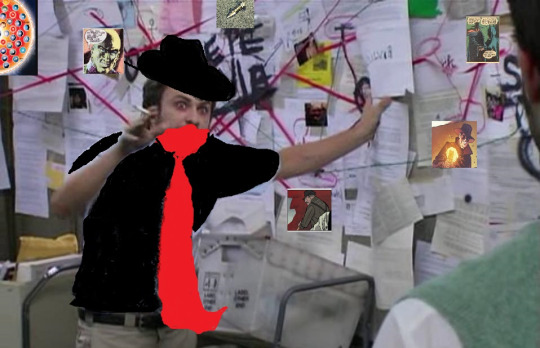
So instead, what I'm gonna do is go over the broad strokes of The Shadow's history as it would look like if you could try and condense it all under a consistent narrative, if you could focus on each decade's highs and lows, what kind of story would arise if a deranged Shadow maniac like me were to try and build a basic skeleton for a The Shadow: Life Story story.
Basic rules first: I'm sticking to the idea of Life Story and spanning every decade from the beginning of the character's life to the end of it. The aging and death parts are important so I’m sticking to those. The character's canonical birth date is 1892, so he's not making it intact to the 2000s. We're capping this off in the 90s, although it doesn't mean no further stories can be told. I will avoid mentioning specific historical events like Vietnam and 9/11 for this post to instead focus on The Shadow's trajectory. I will also not be including other characters, only somewhat referencing whatever aspects I deem relevant. I'm not sticking to any continuity, I'm pulling literally everything I can for this one
And putting this one below the cut
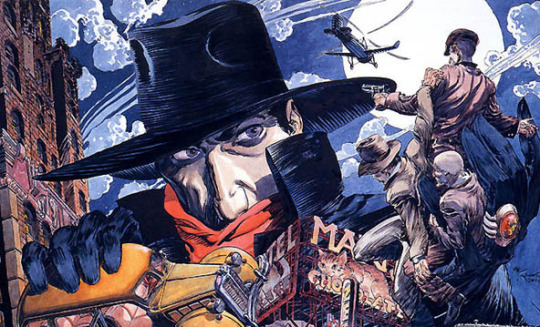
The 1930s: The golden years. In 1930, after a long line of life experiences in the Great War and traveling around the world under dozens of names, the man formerly known as Kent Allard has taken to fighting crime in the Great Depression. This chapter would be more of a standard narrative showcasing the trajectory of The Shadow's 30s career, how he's started off as a urban myth fighting gangsters and then progressed to urban avenger with dozens of allies fighting spies and supervillains. Despite being in his home element, he is restless. Another war is on the horizon. We gotta know where he starts, to get a clue of where he's going.

The 1940s: Despite it being the "family friendly American hero" Shadow era, shit gets very, very chaotic in the 40s, way more so than The Shadow could have anticipated. The pulps were relatively tame for this period, by this point instead you have the radio with it's constantly rotating writers and sensibilities, and comics that had far less reservations about either being really boring or really wacky. Far more encounters with the supernatural than before and with supervillains like Devil Kyoti and Monstradamus and Solaris, plus Khan is still around. The Shadow is forced to spend a lot more time traveling the world to deal with the war, spending a prolonged period establishing headquarters in Japan to aid Japanese underground organizations opposing the military. The agents perform rescue missions on concentration camps, and this is the period where you could have the "real" Lamont Cranston start filling in for The Shadow a bit while he's overseas.

There's a particular blurb that got released during this period that explains The Shadow acquired the power to cloud men's minds not by training, but by journeying to Tibet in an unrecorded adventure that forced him to beg the monks to grant him assistance in saving the world. I have some very mixed feelings on this whole backstory but I think there's something to this idea. Some shit went down in the 40s that was way beyond what The Shadow could have anticipated, and to protect the world from it he had to tap into forces that perhaps should have been left untouched.

The 1950s: The Shadow has dissappeared from America alltogether. He gathered up his agents and announced he wouldn't return for at least a decade, and left them with enough money to last a lifetime and retire should they feel like it. Burbank and Cliff Marsland dissappeared with him, and this chapter would probably be told from the Agents's perspective as they face the 50s while we get snippets from Marsland on what The Shadow's been up to. Some of it involves The Shadow helping protect Tibet after Mao's takeover of China. The real Lamont Cranston doesn't put on the costume anymore and instead operates as a fairly regular detective, although he's training on the skills and powers he's picked up overseas. Whatever fantasy madness haunted the 1940s is all but gone.
The 50s had basically nothing in Shadow content other than the last legs of the radio show, which are 200 episodes from 1950 to 1954 that currently don't exist anymore outside of a few scripts. During this time, The Shadow's sole appearence in US content was a parody in MAD Magazine. Overseas however, there were original Shadow novels published in Norway (a story for another day), as well as a Mexican radio and film series, which also featured Cliff Marsland. I have little information on either.
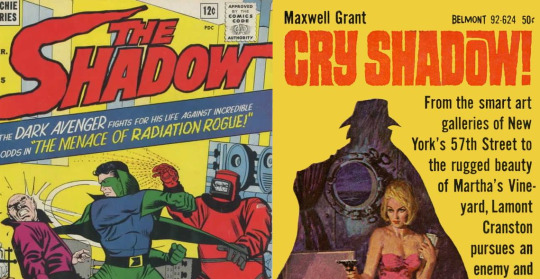
The 1960s: The OG Shadow is still embroiled in conflicts overseas, but the rise of the criminal organization CYPHER forces him to mobilize Burbank and agents old and new alike to deflect CYPHER away from where he's at, although most of them have retired by now. He still cannot return, but he has been secretly instructing Lamont Cranston on furthering along his own latent abilities if he intends to take over in his stead, and Cranston's powers have grown and developed to a point that, although he is pushing 60, he is able to do things even the original Shadow could not. He also invests a lot in merchandising and costume changes, which...doesn't pan out. Nothing in this era really pans out. It's just a really, really frustrating period of bad luck and supervillains that the aging superpowered detective Cranston is able to stop. Lamont Cranston seems to die in this decade.
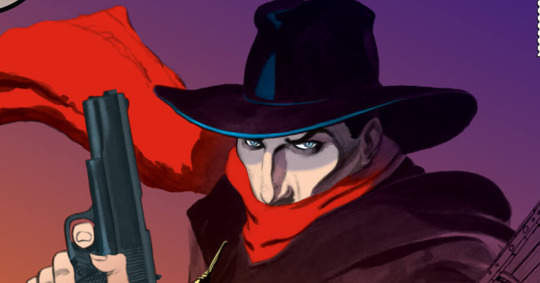
The 1970s: Inspired by The Shadow's DC series, and most importantly Michael Kaluta's spiffy redesign.
The original Shadow returns to a crime-torn America, intent on starting anew, and sets to rebuilding his network. But something is off about him. He's leaner, meaner, less compassionate and trusting. Just as what happened the first time he returned to America following years abroad, what happened in his sojourns overseas has fostered something inhuman in him, another sacrifice of his own identity for the sake of a world where the weed of crime has only proven more insidiuous. His powers have grown and so have his resources, but despite that, he's bordering on 80 years old by now, and cumulative trauma deep within his bones hampers his effectiveness. He's doing a lot better than he should, by any rights, but he can't keep this up and he knows it. And so, as before, he starts planning for it.
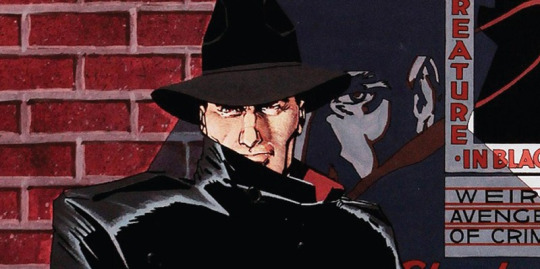
The 1980s: This was the decade where Walter Gibson died with his final Shadow story incomplete, all the movie plans from the 70s were canned, and Howard Chaykin happened, plus the other DC runs. It's the SHIT decade, basically, where everything goes to hell. Whatever plans The Shadow had blew up, dipshit copycats start ruining everything, his network crumbles, and this is probably the ideal decade to kill off Kent Allard.
But this is also the decade where something weird started happening outside of the story: The Ghost of Gay Street hauntings, where visitors on the hotel Gibson wrote the stories in repeteadly claimed to see a ghostly visitor looking exactly like Lamont Cranston, and Gibson himself claimed that to be a tulpa he created by accident.
Kent Allard may have died. But death can never claim The Shadow.
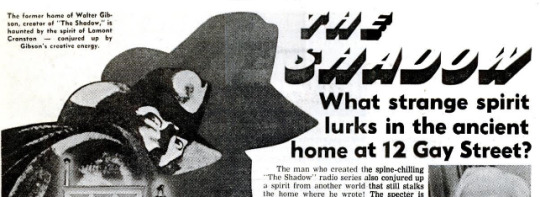
The 1990s-onwards: Somehow, The Shadow is still active. Still elderly, in a much more limited fashion, but still as sharp as ever if not more so. His powers have grown more so than ever before, even blossoming into a limited form of telekinesis. Is he a ghost? Did he somehow survive the events of the previous decade? Somehow, both Lamont Cranston and The Shadow linger on, but is it Kent Allard or Lamont Cranston? Is it someone else?
Who knows?
This is the decade in particular where he's going to be interacting with more prominently with a new generation, whether it's descendants of the original agents, or new heroes that have found themselves in his orbit. Inspired mainly by the Dark Horse Shadow comics, Ghost and The Shadow, and Peter Straub's Mystery and modern takes on the character like Batman x Shadow and the 2017 mini that play up the miserable immortal and ghost teacher aspects, also inspired by my recent realization that The Shadow's ideal future in-universe may be getting to age and mentor the next generation in some capacity.
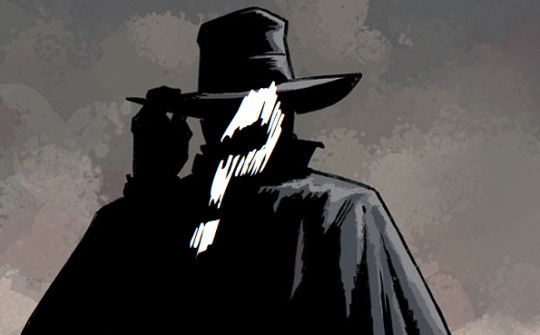
Anything beyond that, only The Shadow Knows.
#replies tag#pulp heroes#the shadow#pulp fiction#visual art#comic books#lamont cranston#kent allard#spider-man life story
18 notes
·
View notes
Text
So a BL Chinese novel?
So I started watching and reading Scumbag System or Scum Villain’s Self-Saving System in the last day because I saw a really adorable nendo of Shen Qingqiu and was like, “OMG What is this cute little thing and why is it freaking out at a screen?” Found the first ep of the series on Youtube on the WeTV channel and got hooked. Googled for the original novel, and I’m I think like 15 chapters in. It’s SO GOOD though.
I was really surprised and intrigued about the premise because I got into reading some Chinese novels lately, but of the romance fare, but the intro and like the frustration Shen Yuan has over some of the writing even though I’m not reading a stallion novel (cuz that doesn’t appeal to me) I just related to because I feel that frustration for some of the developments that happen in the romance novels I was reading.
Like a bit of a tangent, but Thorny First Marriage turned into a shit show the last few chapters where the main character suddenly got really stupid and like threw what she had out the window and basically lost everything, and then it hasn’t had new chapters added to it in weeks even though it still says “To be continued”. It’s just so frustratingly dissatisfying right now and I don’t know how they’ll write themselves out of the hole they made and I’m not really that interested. The Bossy Ghost Husband one got better-ish, but the main character is still stupid and I like predict plot points several chapters before she even thinks of it and it’s painfully slow on the MC realizing it.
But that tangent just to say, I understand the MC of SVSSS’s frustration. I think his is worse because that “original work” he talks about sounds like a huge frickin’ shit show, but the story of him trying to fix it is so good because I can relate to being frustrated with character’s shitty decisions that don’t make sense.
Also, Shen Qingqiu is kind of cute.... Like I dunno, why but I have an odd weakness for his look in general for some reason that probably dates back to old movies I used to watch with my Dad when I was growing up. Kind of saddening that the premise of him is that he originally was a huge asshole with a pretty outside but awful, pretentious inside.
But then this is also apparently a BL novel? Like I’m early into the novel and it reads like a totally normal story, which is great for me since I’m ace and I kind of don’t really like so much how Japanese BL manga tends to shove the sexual stuff down your throat almost immediately a lot of the time. Every time I’ve ever seen it, but I don’t dabble in BL often and I have a small sample set so I’m giving the benefit of the doubt that there’s probably a few out there that have a slow burn too and actually develop the relationship, which is so nice.
Like I’m not normally into BL at all, just because of the overt sexualization kind of makes it more similar to trash smut than a good story, and I’d rather read a good story that happens to also be BL. It seems few and far between. Recently I took a bit of an interest in Titan’s Bride because I thought the premise was interesting, but even checking that out the MC in the manga gets pantsed in the first chapter just to highlight how he has a huge dick and he jacks off when he gets transported into the other world. Like apparently the two characters gradually get to know each other and all, but they like jumped into the sex part like immediately. The story is still better than most fare to an extent, but I mean, do you need to jump into it that quickly? Not to mention in a way that’s like not exactly consensual?
So given that, I’m finding SVSSS to just be way more delightful and the starting premise where the MC has to try to change the hero’s opinion of him so that he doesn’t die being the impetus for their relationship developing is just so fascinating and also sweet. You can like literally see the little things that Binghe notices as their closeness starts to develop, and it doesn’t really seem like there’s going to be anything that starts out non-consensual.
I have a lot of questions though. It’s probably because I’m Asian but grew up in the West. Like in some ways it’s really nice that Asian cultures are more open and accepting of representation of same sex relationships in media and literature, but for Japanese BL it is a bit disturbing that it’s so hyper sexualized cuz homosexuality is just about love. Like there’s a hint of deviance in it and that’s saddening. I know Japanese BL has a specific social purpose too for it being a representation of equal relationship fantasy rather than being faithful literature representing same sex relationships, but it comes on SO STRONG that I’ve always been really concerned about the messaging and kind of uncomfortable with things like Yaoi con and stuff just because it’s like the glorification of something that objectifies same sex relationships more as a commodity than a representation of love and a caring relationship between two people who happen to have the same sex. Still, I remember in my studies that homophobia is more of a Western idea since Confucianism back in the day technically glorified homosexual relationships in some ways and the modern condemnation is more of an import idea reflecting Western Judeo-Christian ideals. In that respect the contrast on a society level and how we got to the situation we have now in modern times is interesting and baffling when you see prominent politicians in like Japan condemn it. But I mean, also from living in Japan it’s kind of interesting in that before arriving I was told many things about how Japan is more sexist, but like in Asian countries in general including Japan girls can cut their hair into cute bobs and no men in their alives are entitled enough to publicly object to it because they are less sexualized with shorter hair. That happening back home was appalling to me because why are you even looking at young girls like that in the first place? It’s nice to be in an area where no one gives a shit about that.
I dunno if it just happened to be coincidence in some of the media I saw, but I saw some people even visit a restaurant in China owned by a couple and like, it seems even a bit more normalized? I usually don’t keep up on modern day Chinese social issues so I don’t really know how it’s thought of there, but it kind of seems like it’s a bit more normalized, which is nice.
But then that also leaves me to the questions I have about SVSSS. Like I love the development of the relationship, but also I’m a bit confused about what the bigger meaning would be of the hero in the supposed original story having a harem solely of women, but with a few story changes starts a relationship with Shen Qingqiu? Like just in principle. I suppose he could be bi, but then wouldn’t his original self have had some men in his harem? I mean, the story is being rewritten so I suppose you could argue that there’s room for him discovering his fluidity or even turning out pan or something, but it seems just a bit different from the idea that you are born with a sexuality. We don’t really know what the original contents of the “original work” were though exactly. We just get snippets than Shen Yuan tells us about and of course it’s a ridiculous stallion novel as well, but I mean, I kind of feel like the ultimate kind would be that he’s such a stallion that even men admire him too? Instead it seems like the lousy original work was too hyper masculine so I suppose you could argue the original shit author was just not good enough to consider even the complexity of sexuality in his characters and that’s why he focused on the other males only being jealous, but still it kind of strikes me as a little uncomfortable to imply that anyone could “change” in the right circumstances instead of just being born that way.
That’s pretty much my only real concern as I embark on reading this story though. Everything else is much improved from my other experiences with BL. I guess the student teacher thing is also a little worrying because of age difference and power dynamics, but also the situation isn’t exactly that either cuz of the reality of the series being someone rewriting the story, but yeah.
The animated series sometimes has a bit of uncanny valley with some of the movements and the fact that the characters are more like 3D versions of a Chinese painting rather than more photorealistic, but it’s beautiful. The parts that it did in 2D animation though were a bit more comfortable with the no uncanny valley triggering.
Anyway, this is basically what’s been on my mind regarding this in the last day. It’s literally been a day since I started this journey and these are my first impressions.
3 notes
·
View notes
Text
Cowboys And Cavemen
This one’s gonna meander, but it’s about cavemen and cowboys and dinosaurs, so some of you may wanna stick around…
. . .
Recently watched the colorized version of One Million B.C. with Victor mature, Carole Landis, and Lon Chaney Jr.
I remember frequently watching the original black & white version of this as a kid; it popped up on local Early Shows a lot primarily because it could be chopped down to fit an hour’s running time without losing too much of the story (Early Shows were afternoon movies with a local host that typically ran only 90 minutes from 4:30-6pm; with commercials and host segments there wasn’t much room for uncut films and as a result they featured a lot of B-movies with 65 minute running times, or else cut out sequences from longer films not germane to the plot).
The colorized version surprised me in a couple of ways.
First, I’d forgotten just how well done One Million B.C. is in basic film making terms: Once past the opening scene, in which an archeologist explains some cave drawings to a group of mountaineers who then imagine themselves in prehistoric times, there’s no recognizable dialog; the film is told in purely visual terms.
Second, the colorization was incredibly sloppy: There’s a lot of weird blue artifacting going on that lays a strange mist-like quality over several scenes, and in several places the colorists inexplicably either colored the actors’ bare legs blue or else overlooked the mistake in the final color correction.
Third, the sloppy colorization doesn’t matter: If anything, it adds to the weird dream-like quality of the film. As an attempt to realistically recreate the prehistoric past, it’s gawdawful; taken as the imaginings of an average contemporary 1940s person with no real knowledge of prehistoric times (viz the prolog), and it’s pretty entertaining.
Technically the movie is a mixed bag. The special effects are pretty seamless (yeah, you can tell when something is a rear screen shot, but then again rear screen shots in every film of that era were obvious)). A travelling matte shot of a hapless cavewoman buried under a flood of lava is particularly well done and as amazing today as it was then (though the colorists dropped the ball and didn’t tint it a vivid red or orange in the colorized version).
There’s a lot of monsters, but they range from well done to just plaine…well…
The best are a woolly mammoth (i.e., an elephant in shaggy fur costume) and a baby triceratops (a large pig in costume) that really seem to capture the essence pf those creatures.
The worst is a guy in an allosaurus suit who kinda just shuffles along like a grandparent going to the bathroom, and in the middle are various lizards dressed up with fins and horns.
The lizards bother me more and more over the years. At first it was because they were disappointing -- they don’t look like dinosaurs, dammit, but like lizards with fins and horns glued on -- but now it’s because I realize they were goaded by their handlers into fights and reactions shots.
That’s plain ol’ animal cruelty, even if they are reptiles and not mammals.
There’s an armadillo and a koala-like animal that appear thousands of times their normal size. The koala-like critter (sorry, but I don’t know what it actually is) is passable as a giant cave bear or sloth, but the armadillo is just an armadillo (there was something about armadillos that 1930s audience found creepy; they’re waddling all over the Count’s hiding place in the original Dracula).
One Million B.C. was produced by Hal Roach and Hal Roach Jr. The senior Roach goes all the way back to the silent era, so this was not a huge stretch for him.
Originally D.W. Griffith was to direct the film, but while he did a lot of pre-production work including screen and wardrobe tests, he either dropped out or was replaced on the eve of production. (Reportedly he wanted the cave tribes to speak recognizable English and left when Roach refused.)
The special effects wound up in a ton of movies and TV shows over the ensuing decades; modern audiences are more familiar with the film through 1950s sci-fi than its original version.
All else aside, the picture is carried by stars Victor Mature and Carole Landis. Ms Landis in particular is a spunky, charming cave gal with a blonde-fro and while Mature would never be an Oscar contender, he at least has the physicality and screen presence to get his character across.
The scene where he thinks Landis has died in a volcanic eruption may be corny, but you can feel his character’s grief.
. . .
A quarter of a century later it was remade as One Million Years B.C. with John Richardson in the Victor mature role and Raquel Welch in the Landis role.
No disrespect to Welch, who by all accounts is a nice person, but she never showed one iota the acting chops of Carole Landis. Welch is beautiful, and as a generic pin-up model cast as a film’s “sexy lamp” (look it up), she presented appealing eye-candy. She appeared in one good sci-fi film (Fantastic Voyage), one campy monster movie (i.e., One Million Years B.C.), two incredibly campy WTF-were-they-thinking movies (The Magic Christian and Myra Breckenridge), and a host of instantly forgettable spy films and Westerns. The best movies she appeared in were Fuzz, based on the 87th Precinct novels by Ed McBain (a.k.a. Evan Hunter nee Salvatore Lombino), where she did an acceptable supporting turn as a police detective, and Kansas City Bomber, a roller derby movie that many consider her best role.
Landis never enjoyed the same level of fame (or notoriety, depending on your POV) that Welch did, but holy cow, could the gal act. It’s a pity Hollywood is crowded with talented, beautiful people because she certainly deserved a bigger career capstone than One Million B.C..
Welch’s personal life certainly proved less traumatic than Landis’, however. When actor Rex Harrison broken off his affair with her rather than divorce his wife, Landis committed suicide.
The scandal exiled Harrison temporarily back to England. A few years later One Million B.C. and Landis’ other films started playing on television.
Who knows what opportunities may have opened for her in that medium?
. . .
The original One Million B.C. is vastly superior in all areas but one (well, two -- mustn’t leave out the catfight between Welch and Martine Beswick): Ray Harryhausen’s stop motion dinosaurs
Mind you, most of the dino scenes in One Million Years B.C. are underwhelming. To stretch the budget the producers used close ups of spiders and an iguana to simulate giant monsters, a brontosaurus does a walk through in one scene and never appears again, and the first big dino moment has cave gals poking sharp sticks at a big sea turtle.
On the other hand, the remaining trio of dino scenes are the aces and vastly superior to their corresponding scenes in One Million B.C.. The latter film’s allosaur attack is one of the best dino scenes ever animated, and the ceratosaurus vs triceratops battle followed by the pteranodon grabbing Welch are almost as good.
Both versions of the film had an interesting influence on films that followed. One Million Years B.C. was followed by a host of prehistoric films, most of which existed only to cast voluptuous actresses in fur bikinis although When Dinosaurs Ruled The Earth, a direct follow-up, offered more monsters and a better story.
While One Million B.C. wasn’t the first film to sub real life lizards for dinos, it certainly told budget conscious producers that such substitutions were okay.
The 1959 version of Journey To The Center Of The Earth cast iguanas with glued on fins as dimetrodons, and for once the impersonation proved successful as the two species do bear certain similarities.
Producer Irwin Allen (he of Lost In Space and Towering Inferno fame) hired Willis O;Brien (the animator behind the original King Kong) and his then assistant Ray Harryhausen to do accurate-for-the-era stop motion dinosaurs for The Animal World documentary but apparently frustrated by the time it took to get results opted for lizards in his version of The Lost World (which, ironically, O’Brien worked on in a non-animation capacity despite having done the original silent version of the film with stop motion dinosaurs).
I saw Allen’s Lost World as a little boy and felt grossly disappointed by the obvious lizards, especially since the script identified them as belong to specific dinosaur species when they quite clearly didn’t (had the script said they evolved from such creatures, the way the most recent version of King Kong did, it would have been less egregious).
Allen’s lizards popped up in several TV shows he did, most notably the TV version of Voyage To The Bottom Of The Sea. That show’s co-star David Hedison played a supporting role in The Lost World so once a season they found some excuse to get him out of his Navy uniform and into a safari jacket in order to match footage with stock shots from the movie.
The Animal World wasn’t the first time O’Brien and Harryhausen worked together, and Harryhausen followed up One Million Years B.C. with The Valley Of Gwangi, an O’Brien project that the older effects artist never got off the ground.
. . .
Let’s back up a bit to discuss “O’Bie” (as his fans refer to him).
O’Brien was a former cowboy-turned-cartoonist around the early 20th century who became interested in animation.
Movies were in their infancy then, and O’Bie shot a short test reel of two clay boxers duking it out.
This got him financing to do a series of short films ala The Flintstones with titles like Rural Delivery, One Million B.C. (the titles were often longer than the films).
These shorts featured cartoony puppets, no actual actors. O’Bie followed it up with The Ghost Of Slumber Mountain which was the first time dinosaurs were animated in an attempt to make them look real, and that was followed by The Lost World in which O’Bie combined live action with special effects, climaxing the film with a brontosaurus running amok in London.
O’Bie wanted to follow it up with a film called Creation but that got deep sixed. However, producer Merian C. Cooper saw O’Bie’s test footage for Creation and hired him to do the effects for the legendary King Kong.
While O’Bie followed that success with the quickie Son Of Kong he never got to work on a dinosaur film of such scope again.
War Eagles (a lost-civilization-with-dinos story) was supposed to have been a big follow up epic, but the Depression and the growing threat of WWII caused it to be cancelled in pre-production.
During the 1940s O’Bie pitched a number of stories to studios involving dinosaurs or other monsters encountering cowboys, one of which was Gwangi (he also pitched King Kong vs Frankenstein which eventually got made as King Kong vs Godzilla using two guys in rubber suits, not his beloved stop motion effects).
Gwangi had cowboys discovering a lost canyon inhabited by dinosaurs, chief of which being Gwangi, an allosaurus. O’Bie never got Gwangi off the ground but decades later Harryhausen did with Valley Of Gwangi.
. . .
I never cared for Valley Of Gwangi and much preferred One Million Years B.C. over it (and, no, not because of Ms Welch).
Growing up in the 1950s and early 1960s, I enjoyed cowboys as much as dinosaurs.
I’ve posted elsewhere how my interest in dinosaurs led me to dinosaur movies which led to monster movies which led to science fiction movies which led to literary science fiction which led to science fiction fandom which led to my writing career, but my genre of choice before age 10 was Westerns.
As others point out, most Westerns are actually crime stories, what with bandits robbing stagecoaches and banks, rustlers making off with cattle, etc. The climax usually involves a lawman (or a vigilante who carries the weight of the law) confronting the evil doers and bringing them to justice.
Sometimes these vigilantes wore masks (Zorro and the Lone Ranger). Sometimes those they pursued wore masks, and sometimes those masked villains pretended to be ghosts or phantoms.
They weren’t, and were invariably exposed as frauds.
Westerns based themselves in a rational world.
Other times a criminal in a Western would be after some invention that could bring either a great boon (say an energy source) or great harm (a death ray) to the world, and wanted it for their own selfish ends.
The story would invariably use the invention as a mcguffin device, maybe letting it figure into the villain’s eventual comeuppance, but never really influencing the outcome of the plot.
Westerns and fantasy genres (including science fiction) don’t mix well, The Wild Wild West not withstanding (and The Wild Wild West was not a Western per se but rather what we would now call a steampunk commentary on James Bond filtered through the lens of traditional American Westerns).
(And don’t bring up Gene Autry And The Phantom Empire, just…don’t…)
Dinosaurs and cowboys don’t really go together.
That didn’t stop O’Bie from trying.
In addition to Gwangi, O’Bie had two other projects that he did get off the ground: The Brave One and The Beast From Hollow Mountain.
The Beast From Hollow Mountain is a standard Western about mysterious cattle disappearances and quarrels over who might be responsible, only to discover in the end it’s really -- surprise! surprise! -- a solitary tyrannosaurus that somehow survived since prehistoric times.
The movie is constructed in such a way that had the dinosaur element not panned out, they could have removed it and substituted a more conventional ending.
While O’Bie didn’t work directly on the film after he sold the story, it did feature a variant of stop motion animation known as replacement animation. Instead of building a realistic looking puppet with rubber skin and posable limbs, the dino in Beast was more solid and featured interchangeable limbs that could stretch and squash in a more realistic manner (rather, the movement looked more realistic, the dino sculpture no so much…).
The Brave One started life as a story about a young Mexican boy who raises a prize bull for the ring, only to have the bull face an allosaurus in the ring instead of a matador.
The producers who bought that idea hired blacklisted screenwriter Dalton Trumbo to turn it into something filmable, and Trumbo sensibly jettisoned the dino to focus the story on the boy and his bull, much to the film’s advantage (it won an Oscar for best story when released, but Trumbo’s heirs had to wait decades before the award could be recognized as due their father).
The Valley Of Gwangi was yet another variant on the same basic idea, more expansive than the other two in terms of dinosaurs, and with at least a nod in the direction of trying to explain them (a “lost canyon” giving them shelter instead of a mountain plateau or remote island).
It never connected with me, despite having more extensive dino sequences than One Million Years B.C..
O’Bie animated stop motion cowboys fighting a giant ape in the original version of Mighty Joe Young but the context proved different. The cowboys’ presence in Africa is acknowledge in the film itself as a publicity gimmick, and therefore not a true blend of the American West with a fantastic element.
Mr. Joseph Young of Africa himself, a 12-foot tall gorilla, was also presented as an exceptionally large but otherwise natural gorilla, not a throwback to a prehistoric era.
. . .
Before there were action figures, but long after there were tin soldiers, we had plastic play sets.
They came in all eras and varieties, but among the most popular were Wild West sets, Civil War, World War Two, and dinosaurs.
My father took a business trip to Chicago when I was four, and when he came back I remember eagerly crowding around the suitcase with my mother, grandmother, and aunt as he opened it and brought out souvenirs for us.
I forget what they got, but I remember feeling disappointed and forgotten since their stuff was on top.
But, underneath everything else, sat a large cardboard box, and in that box was a Marx Prehistoric Times playset.
It’s hard to adequately describe the joy that filled my heart when I opened it; it was one of the best presents I’ve ever received.
And while I later acquired a Civil War set and a World War Two set and a bag of what we then called cowboy and Indian figures, the dinosaurs remained my most favorite.
I bring this up because I think the Marx playsets explain the origins of two comics books, Turok, Son Of Stone (an on-again / off-again series from 1954 to 1982 from Dell / Gold Key) and The War That Time Forgot (1960-68 from DC).
In both cases, I’m sure somebody from each company saw some kid combing their Wild West or their World War Two playsets with their dinos and realized there was story gold to be found there.
The War That Time Forgot felt much more my speed, a lost island inhabited by dinosaurs and visited by American and Japanese forces during World War Two.
World War Two effectively ended any hope of their being a lost island with prehistoric monsters; pretty much the entire planet was scouted either on foot or by air.
Turok, Son Of Stone didn’t connect with me. For one thing, it was too much like a Western in concept; for another, Turok and his brother Andar, being pre-Columbian Native Americans, were already from a neolithic culture, and the various cavemen and Neanderthals they encountered in their lost valley seemed more drab and colorless than their tribal background.
The dinosaurs they encountered always came across as large, dangerous, but wholly natural animals, different only from bears and wolves and bison by size and appearance.
Despite my indifference to Turok, I can absolutely understand why others love it and disdain The War That Time Forgot.
Different strokes for different folks.
. . .
We can’t close this without taking a look at The Flintstones, and we can’t consider The Flintstones without first examining Tex Avery’s The First Bad Man in order to bring this post full circle.
There’s a long history (har!) of contemporary satire using a prehistoric lens. The Flintstones started life as a knockoff of Jackie Gleason’s The Honeymooners told in a prehistoric setting; the series made no attempt to present itself as realistic in any shape, fashion, or form.
Among the many cartoons and short subjects that preceded it (including Chuck Jones’ Daffy Duck And The Dinosaur) is The First Bad Man by Tex Avery, an MGM theatrical cartoon.
Tex told the story of Dinosaur Dan, the world’s first outlaw, using Western tropes told through a prehistoric lens.
It works, because it’s a parody of the Western form, not a sincere effort to blend it with the caveman genre. It works because it’s a jarring clash of genres, not despite it.
The caveman genre itself has fallen on fallow times. Despite films like The Quest For Fire and Clan Of The Cave Bear attempting to do realistic takes on the topic, most people seem to prefer more fanciful approaches, best exemplified by the movie Caveman which sent up the entire genre while not skimping on the stop motion dinos.
With sword & sorcery / Tolkienesque fantasies finally acceptable to mass audiences and thus providing a venue for humans to directly fight giant monsters, there doesn’t seem to be a huge demand for a return to the glories of One Million B.C.
© Buzz Dixon
#Compare And Contrast#One Million BC#One Million Years BC#Ray Harryhausen#Willis OBrien#Victor Mature#Carole Landis#Raquel Welch#Hal Roach#DW Griffith#cavemen#cowboys#dinosaurs#sci-fi
12 notes
·
View notes
Text
Why I’m Excited for “Crisis On Infinite Earths”
With the premier of the “Crisis On Infinite Earths” fast approaching, I recently began to reflect on why I’m so excited for it. Sure, I’m an avid Superman and DC comics fan and Crisis is an iconic story, but it’s more than that.
If you were to ask me “When did you know you were a Superman fan?” I would say, “Somewhere between 7 and 8 years old when my upstairs neighbor gave me his copy of The Death of Superman trade paperback.” Of course, at that age, I didn’t know what a “trade paperback” was. To me, it was a comic book; and like so many other children have done with their favorite comics, books, and toys, I carried it everywhere and read it to the point that I nearly had it memorized. I still have it. It’s beat to hell; but it’s bagged, boarded and stored in a safe place.
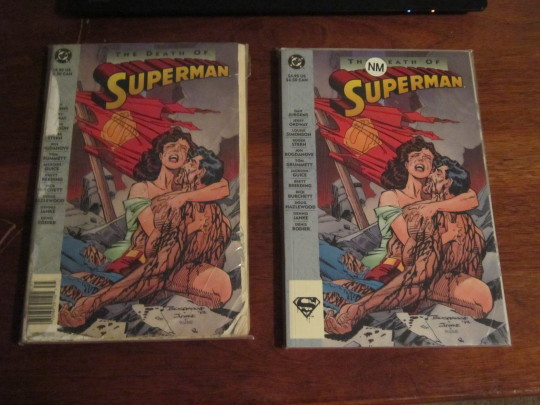
My copies of The Death of Superman TPBs. The one on the left I took everywhere with me when I was a boy.
If you asked me when I became a serious Superman fan and collector I would tell you “My 14th birthday, February 2000.”
My Aunt Susan gave me the Superman Masterpiece Collection for my birthday that year. The set came with a reprinted copy of Superman #1 (printed to the exact specifications of the comic books of that era), a hardcover book chronicling Superman’s Golden Age, and a limited edition statue designed by Alex Ross, made available only with that set.
I still have that, too. It’s a little worn along the edges and corners, but otherwise in excellent shape. I keep it on top of my bookcase. It’s one of my favorite pieces of memorabilia.
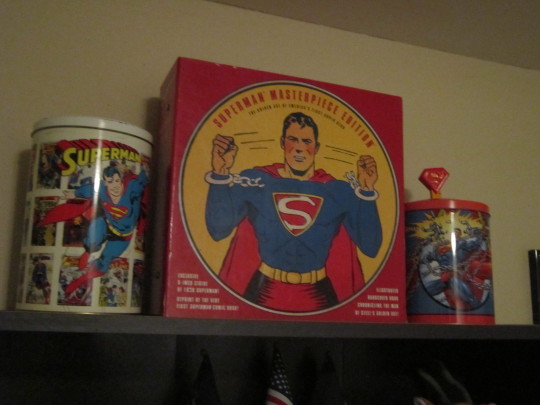
Even then, as much as I enjoyed comic books, I only saw them as a form of escapism; another way to keep people entertained. With explosions, science fiction, action, adventure, and romance; it was the modern version of the Greek mythology stories I read as a boy. They were a great way to keep myself entertained but not much else.
That perception changed when shortly after I graduated high school in 2004. I had received, among many other gifts, Barnes and Noble gift cards at my graduation party; and when I redeemed them, there were only two books I had my eye on:
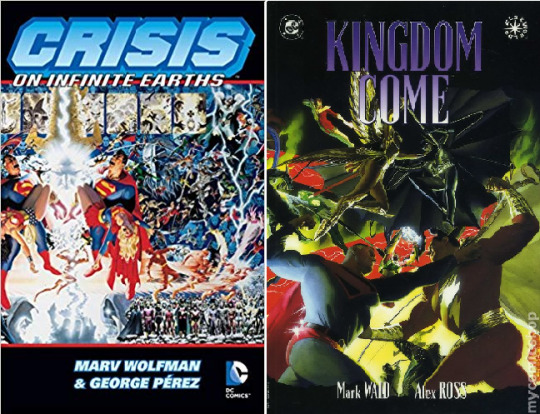
Crisis On Infinite Earths (1985) and Kingdom Come (1996)
Crisis on Infinite Earths brought a new perception to these fictional characters that I had never before considered. There was depth, drama, and serious world-ending – in this case universe-ending – stakes. Universes were literally obliterated from existence , beloved characters were killed off, and the DC Universe was never the same again.
George Perez even introduced a character, Pariah, whose sole purpose was to witness the destruction of every universe, particularly every Earth, with no way to warn or save anyone. I even remember my jaw dropping at the beginning of the story when Earth 3, the home of the Crime Syndicate of Amerika – evil alternate versions of the Justice League, kicked off the story by being destroyed.
Crisis on Infinite Earths saw the teaming up of characters of the same name from different Earths with similar, but still different, backstories and abilities. The Superman of Earth 2, for example, was the Golden Age Superman; who’s abilities are limited to that of early Superman stories, “faster than a speeding bullet, more powerful than a locomotive, able to leap tall buildings in a single bound.” While the Earth 1 Superman was the modern incarnation with all of the abilities we are familiar with today, namely flight.
What made Crisis so successful, however, wasn’t just that there were variations of the same characters fighting side-by-side to save the multiverse from being wiped from existence, but that no one is safe. One of the most iconic covers of all-time is Crisis on Infinite Earths #7.
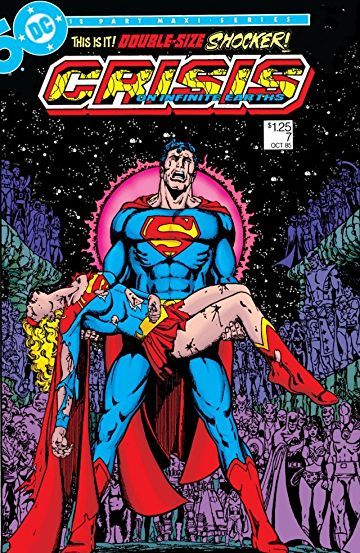
Cover of Crisis On Infinite Earths #7.
That basic design, a hero holding the body of a partner/friend/lover, has been used all throughout comic books; but Crisis on Infinite Earths #7 remains iconic not just because it features the world’s most powerful hero holding the dead body of his cousin, who’s abilities are nearly equal to his, reduced to a groveling mess, but because it was proof that absolutely no one was safe. By issue 7, everyone knew the stakes, and the heat was on.
What made Supergirl’s death so memorable and iconic, however, wasn’t just that she died in battle, but that she sacrificed herself, knowing what she was doing would kill her.
Following Crisis, DC rebooted the entire universe and in that reboot, they intended the Superman to be the last Kryptonian rather than the last son. So rather than letting Supergirl become another faceless casualty, she received a hero’s farewell by protecting her cousin - the entire reason she was sent to Earth in the first place.
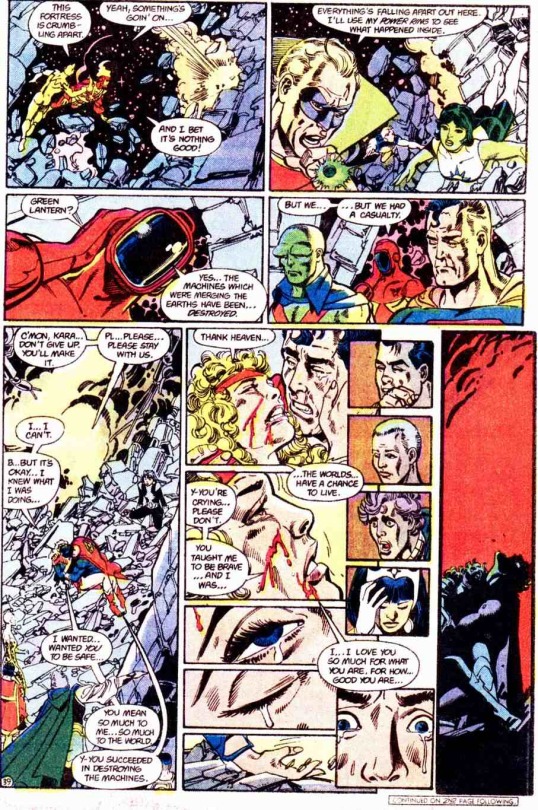
The death of Kara Zor-El.
The story didn’t slow down there, either, the following issue saw the death of Barry Allen, A.K.A. The Flash. While the cover isn’t nearly as iconic as the previous, Barry’s death is because it, again, involves self-sacrifice.
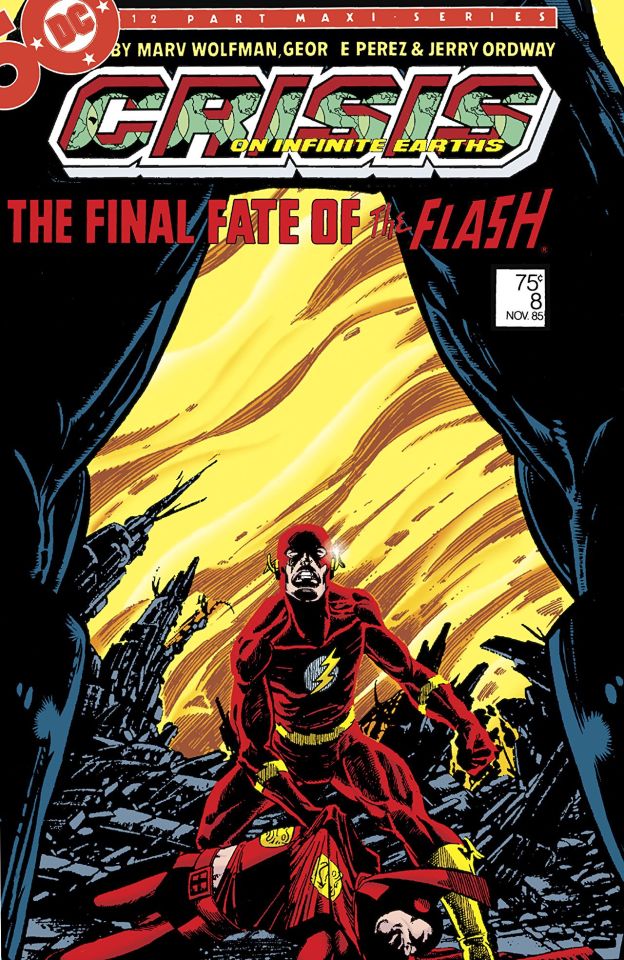
Cover of Crisis On Infinite Earths #8.
Throughout the story, Barry’s “ghost” would occasionally pop up, looking less and less ghastly each time; and that was finally explained in issue #8 when Barry ran to create a speed vortex that would draw power from the weapon designed to destroy Earth. The power became too much for his body to handle and he literally ran backwards in time until he disintegrated and became the very lightning bolt that gave him his abilities.
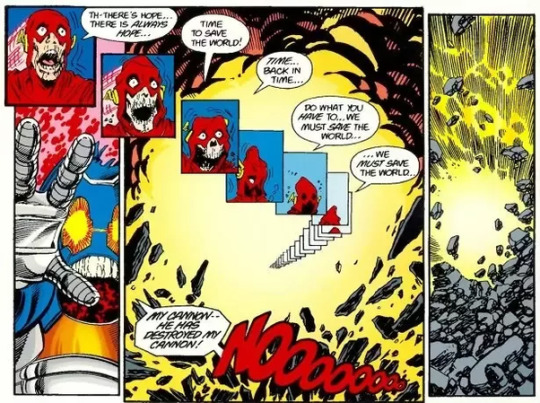
The Death of Barry Allen.
Crisis On Infinite Earths upped the ante in comic book storytelling. It showed that just because the characters aren’t real doesn’t mean they’re immortal and, more importantly, it shows that we can feel connected to them just like we get with a character in our favorite TV show. When I finished reading Crisis I began to take a deeper look at comic book characters and was able to identify what made each character great and different in their own way. Sure, Batman has the money, gadgets, and the car - but it doesn’t mean he won’t long for his parents anytime he sees Superman with Jonathan and Martha. There is much more to comic books than colorful costumes and wacky villains; and it was Crisis On Infinite Earths that helped me realize that.
After Crisis, I picked up Kingdom Come.
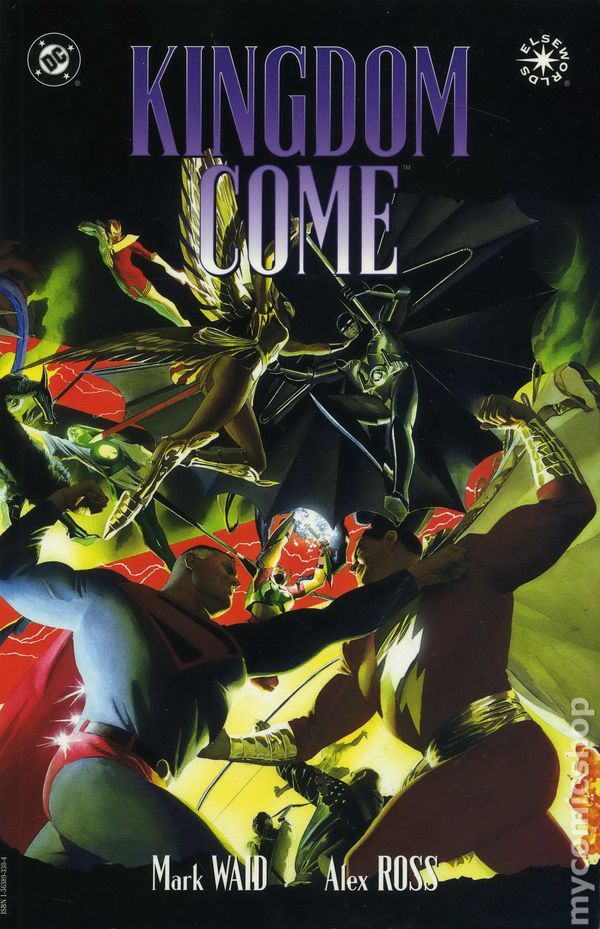
Wow.
Let me say that again.
Wow.
Putting aside the writing for now. The art alone is enough to sell the book. Alex Ross is a legend, and his art speaks for itself. I had only ever seen his work in single images, not in comic book panels and I was in awe with how well everything seamlessly flowed together. To this day, Alex Ross’ work in Kingdom Come is among my favorites and will always hold a very special place in my heart.
Now. The story.
Mark Waid could walk into a convention and my heart would stop.
He ranks among some of the very best comic book writers and when you read Kingdom Come, you’ll see why.
Like Crisis On Infinite Earths, Kingdom Come opened my eyes in comic book storytelling that I had never before considered; this time with politics. In my last YouTube video, I talked about how comic books have always been, in some way, political. As children we don’t notice it as much but when we grow, mature, and begin to notice how the world works, we finally become aware of topics we were blissfully unaware of as children. Politics in comic books is one of them.
With Kingdom Come the politics covers not only generational gaps between yesterday’s heroes and the story’s current heroes, but we also see the government get involved out of fear of the destruction the two groups of heroes could cause should they not resolve their differences. Within that narrative was the conflict occurring among the primary characters. Superman and Wonder Woman, while working together, did not see eye-to-eye, Batman wanted nothing to do with their efforts while (shockingly) assembling his own team in accordance with his own plan that involved Lex Luthor and other classic supervillains, and a brainwashed demigod as the wildcard.
Most of all, the story portrayed a war and how the biggest victims aren’t those fighting in it, but those they claim to be fighting for; the unintended casualties. Sure, we feel for the casualties of the war, but it wasn’t until an enraged Superman nearly brought the roof down on the government who did what they did not out of malice, but fear.
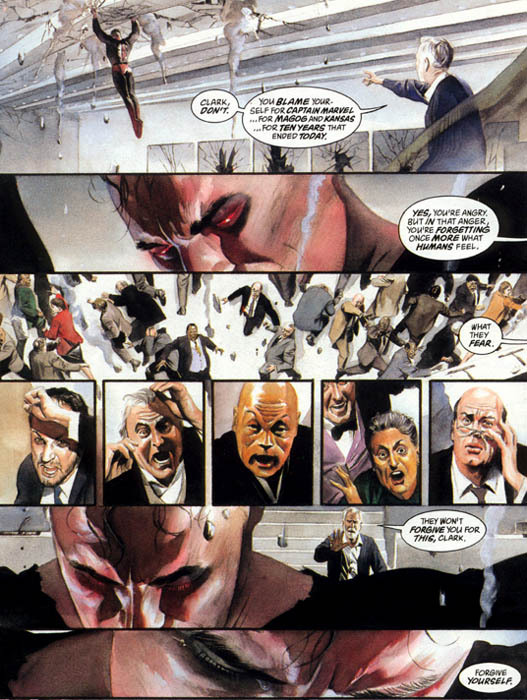
Superman nearly loses control in Kingdom Come #4.
Kingdom Come is easily one of the most powerful stories I have ever read and remains in my top 3 favorite stories. It’s one that I would recommend to anyone, even if they aren’t a comic book fan. Hell, the first Superman shirt I ever bought for myself was Kingdom Come.
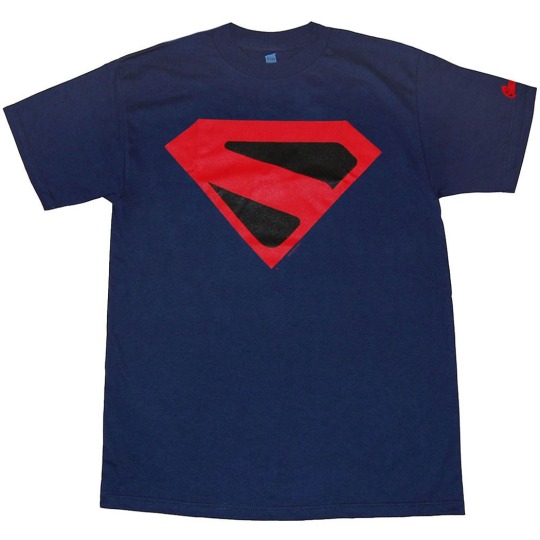
I need to get a new one.
Then there’s Brandon Routh.
Routh (rhymes with “south”) was cast to play Superman in 2006’s Superman Returns. While the movie itself was a bit of a disappointment and divisive amongst fans, Routh’s performance as the Man of Steel was not.
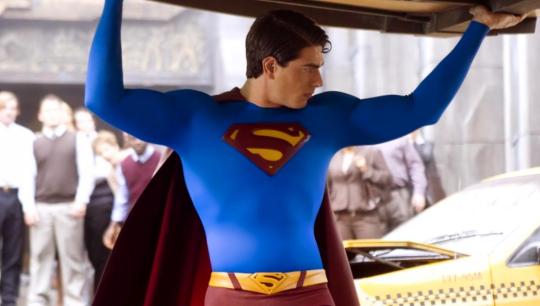
Brandon Routh as Superman in 2006’s Superman Returns.
I was 18 and in my first semester of college when the news of Routh’s casting hit. I was excited. Excited that he was an unknown actor. Excited that he was young and that a franchise could be built around him, excited that he grew up a Superman fan, excited that – like me – he grew up in a part of the country where Superman’s values are ingrained in everyday life. I was truly excited, even if other Superman fans weren’t.
Brandon Routh received, in my opinion, an unfair amount of criticism when he was cast, when pictures of him in the suit were released, when trailers were released, when the movie was released, and even to this day. Honestly, I feel fans and critics weren’t willing to give him a fair chance because he wasn’t Christopher Reeve and was compared to Reeve before the first picture of him in the suit was released. I was one of those fans who tirelessly defended him on the internet. I was insulted by fans, my family was insulted, called names, I was even accused of not being a “real Superman fan” because I was giving the movie my support. I was young, though, and didn’t realize then how pointless it was to argue over the internet; so I kept at it.
I was so excited for the movie I ordered my ticket for opening day the day tickets went on sale. I set out the Superman shirt I wanted to wear to the movie, drove an hour and a half from Limon, CO to Denver to see it, and arrived early to make sure I got a good seat. I had waited my entire life to see Superman on the silver screen and nothing was going to stop me from making it the best experience possible.
I’ll be honest. I enjoyed the movie. I was a bit underwhelmed because I had hoped for more action sequences and felt the story could have been stronger; but that didn’t stop me from walking out of the theater with a smile on my face, seeing it a second time, or looking forward to what the sequel had in store. Hell, at the time Superman Returns came out, I was an aspiring actor and I DREAMED of being cast as John Corben, also known as Metallo, in the Superman Returns sequel and going blow-to-blow with Routh’s Superman.
Ultimately, I think the premise had more to do with my excitement than anything else. I loved – LOVED – the idea of Superman being gone for 5 years and returning to a different world; especially with everything the world had been dealing with between 2000-2006.
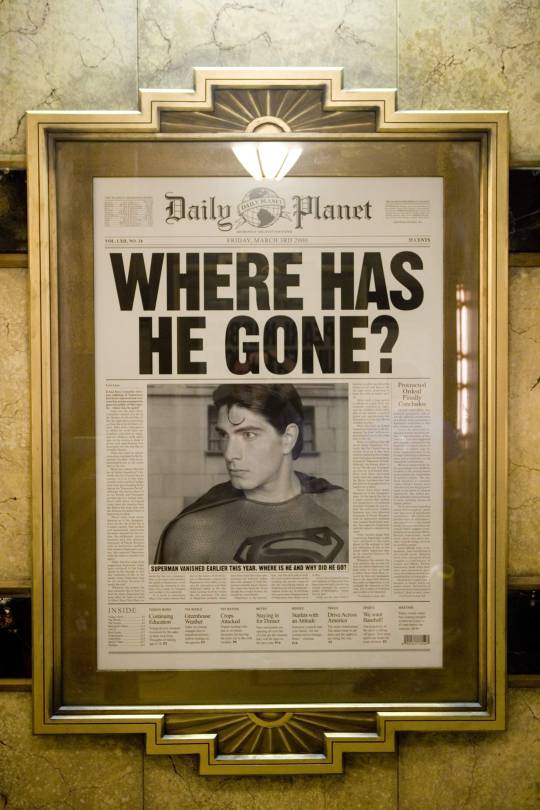
From Superman Returns. The date of the article is March 3, 2000.
What if we had Superman on 9/11? What would have been different? How many lives would have saved? Would he have stopped the second plane from hitting the south tower? Would he have prevented it altogether? There was so much that could have been done with that premise that, I feel, was left on the table.
To this day, I believe that instead of being a continuation of the Christopher Reeve films (a decision I supported at the time) I think Superman Returns should have featured a young Superman who fled back to Krypton when he heard the rumor it might still be there. Jason should have been Lois and Richard’s child, Martha should have died while Superman was away, Lex Luthor or Cadmus Labs (both?) should have been trying to clone their own Superman that would turn into Bizarro, Superman should have spent less time pining over his lost love with Lois, and I have always, and firmly, believed there should have been a scene of Clark sitting alone in the Daily Planet film room, glasses in hand and tears in his eyes, watching footage of the September 11th terrorist attacks. Those elements would not only have given Superman Returns a stronger story, it would have made him much more relatable to the casual moviegoer and still would have provided plenty of action for fans.
Despite all of that. I still enjoyed the movie. I enjoyed it so much that when it was available for pre-order on Amazon, I bought the Two-Disc Special Edition.

I still have it.
When Routh made an appearance at Rose City Comic Con in 2018, I made damn sure I met him.

He signed my copy of the Superman Returns comic book adaptation and I’m still geeking out about it.
Of everything I enjoyed in Superman Returns, the plane sequence, the bank robbery, Kevin Spacey’s Lex Luthor, Superman flying around saving the city; if I had to pick one thing that I enjoyed the most in the film, it would be Routh himself. While his portrayal of Clark Kent was clearly inspired by Christopher Reeve, his Superman is where he shined. He stood tall, walked and spoke with confidence, and could intimidate someone by his presence alone – until he smiled that warm Superman smile and said something that would calm even the most nervous person like he did with an upset Lois Lane on the roof of the Daily Planet.
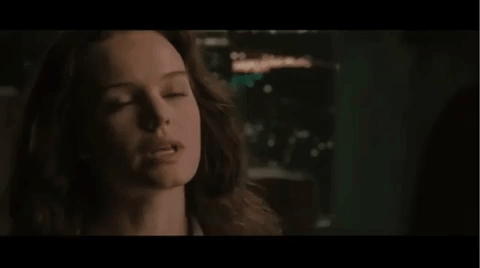
“Will I see you around?”
“I’m always around.”
Because Superman Returns didn’t fare as well in the box office as the studio had hoped, the sequel never happened and that was the end of Routh’s tenure as Superman. I was disappointed, but I understood. It’s a business. Making money comes first and Superman Returns, while profitable, didn’t make nearly enough.
Time marches on and we got more comic book adaptations. Smallville continued for another 5 seasons, ending its run after season 10 and inspiring a spin-off series about the Green Arrow, inspired by Justin Hartley’s popularity of the character in Smallville. Arrow, set apart from the Smallville series, came out swinging and quickly rose in popularity. Then in season 2, came future superheroes as recurring characters: Barry Allen, played by Grant Gustin, and Ray Palmer, played by Brandon Routh.
I was SO excited to see Routh back in the comic book medium. The only thing that would have made me happier was if they brought him back to play Superman; but alas, I knew it didn’t fit with Arrow’s reality.
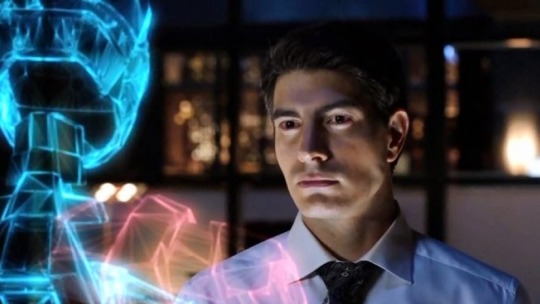
Routh’s performance as Ray Palmer was different than I expected. Ray always came off as a serious character in the stories I read, not as the “Aw shucks” kind of person Routh portrays him as. It made sense, though. Stephen Amell’s Oliver Queen had enough serious to go around for everyone; there needed to be a lighthearted superhero to balance that – like Superman is to Batman.
It worked too! Routh became popular on the show and before too long, was starring alongside other actors who portrayed those lesser known heroes in Legends of Tomorrow. As the Arrowverse continued to up the ante and bring in other shows and characters, so did the expectations; and like the comics the shows are based on, annual crossovers became a thing.
They started small with the first 2 being two-parters with The Flash and Arrow, then expanded across all four shows for Invasion! and Crisis on Earth X, dropped to a 3-parter with Elseworlds while also setting up the Batwoman series, to an epic five-part series based on one of the most iconic stories of all time that showed me how serious comic book storytelling could be.
Then there’s Brandon Routh.
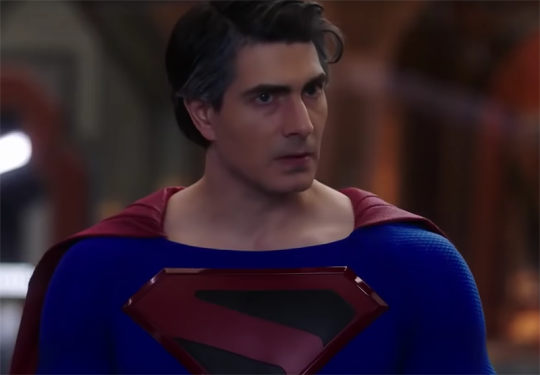
Not only is he returning to play Superman, he’s playing the Kingdom Come Superman!
I can’t take it anymore. Seriously.
The first actor I ever saw play Superman in theaters – the first Superman actor I have ever met in person, is playing the version of Superman that helped me realize the kind of message that comic books can tell, in an adaptation of an iconic story that showed how serious a comic book can get. Both of those stories, Kingdom Come and Crisis On Infinite Earths, made me into a comic book fan. Not just a Superman fan, but a comic book fan.
Now I have another comic book that I need to get signed by Routh the next time he visits the Pacific Northwest:

It’s gonna happen – and I’ll be sure to get a picture with him while wearing a Kingdom Come Superman shirt.
Fans can always remember what made them fans of their fandom. Crisis on Infinite Earths and Kingdom Come is that for me. Add the casting of Brandon Routh as Superman in Superman Returns shortly after reading those two iconic stories, and It was a done deal for me.
Seeing all of these impactful moments that helped mold my fandom being rolled together like this is, to say the least, emotional. Never in my life did I expect to see any type of live action adaptation of Kingdom Come or Crisis On Infinite Earths; and I certainly never imagined I’d see Brandon Routh play Superman again. It really is a fanboy’s dream come true.
The only thing that could make it better, for me anyway, would be if Routh’s final line as Superman is his best line as Superman:
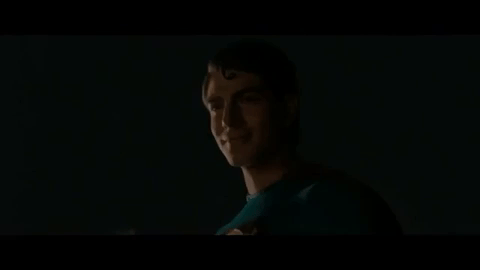
“I’m always around.”
#crisisoninfiniteearths#kingdomcome#superman#supermanreturns#arrowverse#arrow#flash#supergirl#legendsoftomorrow#brandonrouth#deathofsuperman#raypalmer#theatom#dccomics#cwtv#dctv#dcuniverse#dcmultiverse
2 notes
·
View notes
Note
E L S E W O R L D S ? ? ?
MY THOUGHTS ON THE WORLDS AND THEIR ELSE-ENING ARE MANY.
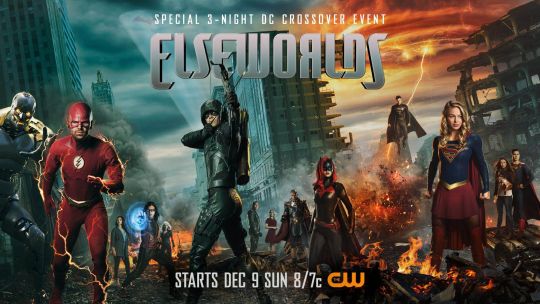
Gonna put most of this under a spoiler cut just in case, but right up front: I only regularly watch The Flash starting with Season 4 (along with seeing the first half-seasons of it and Supergirl, plus sporadic episodes of the other shows and Invasion!), and while there are absolutely standout episodes, it’s probably the most lukewarmly received piece of media I consume on a regular basis. So Elseworlds looked rad, and The Best Superman was coming back for it, but aside from hints that it was going all Final Crisis (which sadly weren’t realized) I was hardly outright ecstatic at the prospect of a Freaky Friday alone, even with Batwoman’s introduction in play. Basically I assumed it’d a bunch of fine stuff I’d get through so I could drink up the Superman content like a dying man in a desert.
This was my favorite live-action DC thing since The Dark Knight Rises if not in fact The Dark Knight itself, and in all honesty probably my favorite period of the non-Batman division. It was everything I want out of this sort of project and more.
I’mma break this down into a few categories: as a whole, Superman specifically because if you’re here you know what my deal is, THE ENDING, and a multitude of scattershot impressions and thoughts.
AS A WHOLE: Was this a masterwork of layered conceptual depth and calculated plotting tight as drum? Hardly - if nothing else, the sheer fact that the entire Superfamily is functionally and thematically superfluous precludes that upfront. But again, this is the perfect version of this kind of series, where clockwork precision is rarely the name of the game (aside from that dope episode of Flash with the bomb) so much as excitement and character-driven emotion, and in that regard this is the platonic ideal. Oliver and Barry hold the narrative together as Barry low-key relearns the value of his own kind of strength, and Oliver high-key learns to accept that he’s not living in a world defined by him anymore and he needs to be better, to the point where I may not even rag on him as Walmart Batman anymore every time I have cause to mention him, especially since that gets its own perfect sendoff. Batwoman functions as a perfect pilot capsule while still functioning as a chunk of a larger story, and Ruby Rose is on point. Supergirl gets some quality content even with her hands off the wheel (which is one of the lesser aspects given…well, given this is probably gonna be the last crossover like this and she really should have been the lead for one of them). It’s funny and thrilling and so damn weird, concerned above all else with making you giggle at doing stuff you’ve wanted to see for years and then making you give a shit about the emotional consequences of Barry Allen picking up some archery classes, and it earns what it reaches for.
Moreover, this episode represented a moment of maturation for me in terms of its status as a shared universe: Crisis on Earth-X was the culmination of what this world HAD been with its massive group shot aboard the Waverider, and that culmination was my going “wow, lookit that, they really did build something kinda functional out of what they had to work with”. It was a world that was comic book as all hell in the best way, but its own oddball strain made up of recognizable pieces broken off from a larger puzzle and rearranged into a new configuration. Here? From the moment the Monitor chases off 90s Flash on a desperate race from his dead world and the bodies of an army of superheroes to save all creation, into Superman taking his place as a central figure, Batman’s mythology unfurling out of nowhere at a beautifully shameless breakneck pace, the establishment of the Multiverse and Monitor mythology as the base level concept uniting the universe as a whole, and hotlinks to a half-dozen other major mythology elements I’d given up on ever seeing acknowledged, this really and profoundly feels like DC Comics.
SUPERMAN: Still so so good! I will say, this wasn’t nearly as much a breakthrough standout display for Hoechlin’s Clark as his prior Supergirl appearances, with a couple line readings where he’s maybe just a little too chill, and less opportunity to display range or depth given he’s in the back seat. And dude’s gotta practice pretending to be thrown back, however you do that, because that was pretty badly fakey-looking. If this had been his debut, I still would’ve loved him, but he’d be taking up third or fourth on my list of live-action Superman actors rather than sitting pretty at #1; I have to wonder if a lot of his energy simply went to his killer performance as Deegan, or if he’s still modulating his kinda-being-his-real-self-but-also-still-putting-on-the-Supermanness chunk of his performance given it’s with Kara and Lois that he really shines. If someone writes him off as a dime store Reeve though, they’re still wrong and also probably bad. Shoring up his cracks though is Elizabeth Tulloch, who’s already at least vying for a place on the Lois Lane Mount Rushmore. Reminded me heavily of the best of Erica Durance’s take, but with an additional straightforward bluntness that suits Lane incredibly well, and a talent for talking rings around Clark that does more than any other Lois to date to sell the idea that that’s a huge part of what he loves about her. Also she slaps around a mad god with the hammer for the cosmic anvil from All-Star Superman, because if there’s one thing Lois Lane steadfastly refuses to be in the business of, it’s in any way fucking around.

As for the big question: even aside from Tulloch making pretty clear in a recent interview that it’s something producers are talking about, yes, I absolutely think the Superman/Lois chunk of this was as fully intended to act as a backdoor pilot for them as the second act was for Batwoman. I know I’ve been certain on this in the past just as a matter of ‘they can use Superman so it would be foolish not to push that’, but then, well, nothing happened. But here, while the creators are clearly hedging their bets with providing them what could easily be a happily-ever-after, their appearance in this way in this context is bizarrely conspicuous and pointless if that wasn’t what was intended. They’re incidental to the plot (Deegan becoming Superman, while great fun that gives us an interesting new spin on the evil Superman concept, is basically just an aesthetic), the functionality of getting Clark away from National City had already been handled by the season premiere and never actually takes anything more than ‘he’s busy in space/plugging up a volcano/fighting Luthor’ as has already been done in the past, the guest spots and relevant emotional beats could have easily been contained to an episode of Supergirl rather than spilling out into an already stuffed three episodes, and if they could only be used in one crossover for some reason they’d obviously be saved for the next one. And they get a scene to themselves AFTER their role with our leads is wrapped up, with a moment that could have already come off-screen earlier but didn’t, purely to endear them to us in a way that would make us want to see more of them. I’m not saying a Superman show is now guaranteed, but unless there was some bizarre instruction that they suddenly once and for all needed to permanently get rid of him - yet permitted that to be accomplished via the delivery mechanism of more Superman, in a way that’s noted as impermanent in-universe and in a context that’s going to introduce him and Lois and push them as big deals to the maximum possible number of viewers - yeah, I think that’s what the people who made this must have been intending. And that the powers that be let them is incredibly encouraging. As Tulloch said, a lot of this is out of the hands of anyone but corporate, but Elseworlds got season highs so that’s a point in their favor; hopefully Cryer works out as Luthor, because I imagine that’s the other checkmark needing to be crossed off that comes down to the response of the viewership.
Also the proposal was perfect, and I am astonished that happening after the pregnancy was announced got to go through - ‘modern’ indeed, as Cat Grant would put it. I get it’s got precedent of a sort in Superman Returns, but on the other hand, that precedent was Superman Returns. I’m surprised I’m not already seeing thinkpieces on the degradation of American Values coming out of this.
FUCK:
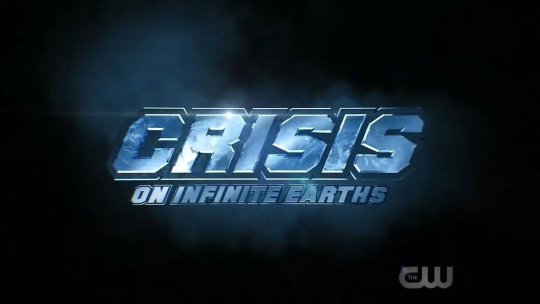
FUCK.
I really thought there was gonna be one more crossover before they dove all the way in. But nope, nope nope nope, instead by this time next year for-real live action Crisis on Infinite Earths with Flash, Supergirl, Superman, the Monitor, shadow demons, the Psycho Pirate, and assuredly a comprehensive collection of carefully curated cameos from the ghosts of DC TV past will be a thing out there in the world. Marv Wolfman sure must be having a nice day.
And boy, they are not in ANY kind of position to half-ass it. The name value alone would be enough, but if that was it they could at least maybe get away with Dean Cain and Brandon Routh showing up in their old working clothes to help beat up the Anti-Monitor on a cordoned-off Vancouver street, maybe a couple of the Legends folks biting it. But they‘ve been explicitly acknowledging it as a thing they’d build up to for five years, since episode one of their most popular show, and if I’m right and the writing in the book of Destiny was supposed to be the same kind of text that Nora’s writing, they’ve been actively setting up Chekhov’s guns within the shows themselves for at minimum two years. AND they’ve already done three other world-threatening multiversal crossovers, including a classic JLA/JSA-model Crisis, so they’ve already established a threshold of crossover event that this needs to plainly mark itself as an entirely different order of magnitude from, AND they’ve had a threat to the multiverse before in Zoom so just saying that again without really showing it isn’t going to measure up. Hell, the idea of massive status quo changes is reinforced as being just the much of the mission statement of this as the original via Psycho Pirate. They’ve apparently quite knowingly backed themselves into a corner where they actually have to Wreck Shit. At minimum one of the three leads has to die for keeps, and all have the symbolic weight behind them - Oliver included after Elseworlds, and really in the first place as the founder of this DCU - and have obvious enough successor shows waiting in the wings to feel like they’re legitimately in the line of fire.
My hope? One that unlike usual I’m not gonna bolster by drawing on evidence at hand and logical assumptions, but the way I simply feel it Should Go and think at this point has a legitimate chance of being the case? Crisis is its own miniseries in the fall in place of the return of the other four shows, a massive high-budget ensemble piece with room to breathe…and at the end pretty much everyone dies. Most of the Legends, some supporting cast members, and above all Oliver, Barry, and Kara ALL die grandiosely and nobly to save all creation, hidden from the audience successfully by way of a miniseries ‘putting off’ the actually nonexistent renewals of the existing series. Earths 1 and 38 are merged (hopefully without discarding the multiverse as a whole, and with the heroes remembering their pasts), and in the wake of this massive conclusion, the entire DCTV lineup is effectively relaunched. Batwoman comes in here, taking Arrow’s place, while Superman emerges (likely with a psuedo-Rebirth setup since Jon’s on the way - they can figure out a way to get him to the appropriate age) with him dealing with his family and his initial grief, The Flash is relaunched with Wally and/or Nora assuming the mantle, and Legends reconstituting itself, whether by its original title or as Legion of Superheroes or Justice League, with a new lineup made up in large part of the castoffs from the cancelled series. Again, obviously there’s nothing definitely pointing towards this being the case, but somehow it just feels right, especially with Batwoman and Superman shows clearly being gestured towards when Arrow and Supergirl are the shows that would definitely have to end or at least change names with the death of their leads. The strongest evidence against all this, I think, is that Supergirl wouldn’t quite have hit a hundred episodes and syndication yet. Though there may still be that Supergirl movie too, so that’s a factor.
A couple incidental thoughts on that front:
* Interesting that Flash vanishes in 2024 and is still gone in 2049, but the first crossover - made when ‘Flash vanishes’ was already a keystone mythology element, and given its place at such an important moment you’d think the writers would remember - makes clear there’s an old Barry around in 2056. I could see that coming up.
* Thawne’s role in this season of Flash feels at this point like it has to dovetail into everything, and I could see him taking up Psycho Pirates’ role in the original story even if the genuine article’s around.
* I wonder if Jon Cryer’s gonna play Alexander Luthor.
* If Kara and Barry do die, and likely make some post-death appearances, I wouldn’t mind if they for the sake of novelty reverse things so that it’s Kara who comes back for real in Final Crisis, while Barry’s the one who comes from the past unknowingly and tear-inducingly ala Whatever Happened From The Man Of Tomorrow? (that could easily be set up via the “three hardest days of your life” thing Johns did in his Flash run).
* Incidentally, do Final Crisis as the ultimate event the next wave of shows build up to like this was built up to, and make that the end of everything.
* If I’m all wrong about Superman and he’s just being set up as a lamb to the slaughter for Crisis to fill the Supergirl role (which would still by no means require him appearing in Elseworlds, especially given it’s not like he develops a relationship with Barry or Oliver, so I’ll say my points all still stand), I get the impulse is to do him dying in Kara’s arms. But if they do wanna go this way and finish his story, I really, really hope that instead they let him deal at least part of the killing blow and then somehow vanish into ‘Heaven’ with Lois and Jon. If you’re gonna homage a Superman bit from there to close him out, that’s the one to go with.
* If Ezra Miller wasn’t bullshitting and would be willing to put in a little appearance, this is the place.
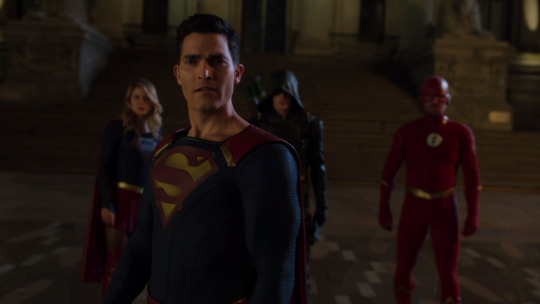
ASSORTED REACTIONS:
* “Oh Barry, what have you done this time?” Oliver’s wise to your shit, boy. He knows full well he’s pretty much in a ‘Barry fucks up with Flashpoint even further’ meme come to life.
* Barry freaking out that he knows kung fu is a delight, as is Oliver trying so dang hard to do this whole ‘Flash’ thing.
* Knocking out the pair of them is admittedly *a bit much*, but while some might correctly note that they’ve seen so much weird shit they should be able to accept this, I’d say it’d also be fair to note that they’ve seen so much weird shit they’re not wrong to think this is gonna snowball into some bullshit and it’d maybe be simplest to nip it in the bud and get things under control.
* Barry, I’m glad there are toilets in the Pipeline, but someday you’re going to think to ask ‘so Cisco, what are you feeding them down there?’, and then Vibe’s gonna go OH FRAK or some other nerd shit and they’re gonna find 5 seasons worth of corpses to clean up.
* Hahahahahahahahahahahahahaha they did fuckin’ KGBeast on Arrow. Was that who Dolph Lundgren played? Checking…no. Dang.
* I had heard there was gonna be a Remy Zero shout-out for Smallville, but I assumed someone would just ask for someone to save them or it would be playing on the radio, not that they’d hard swerve from vague orchestral stirrings to pseudo-Nickelback. Loved it.
* Clark’s doin’ Clark stuff and I love it, Lois is doin’ Lois stuff and I love it, she nearly kills the Flash and Green Arrow with a hammer (truly her weapon of choice!) and I love it.
* Oliver pathetically puffing out his chest, WHILE CLARK ISN’T EVEN BEING SUPERMAN, is as good as television gets.
* AMAZO. Aside from basic delight at his existence, I love that the ‘Mirakiru’ ties into the Ivo material I know was in early, pre-superhero Arrow. It’s as if when Smallville got to do Supergirl and Doomsday for real they went ahead and tied them back in to the weird proto versions of them they’d already set up not knowing what they’d be able to do later. Much as Mxyzptlk or Grodd or Muppet Legends (I also caught that shows’ midseason finale, it was delightful) are easy to point to as indicators of how far this universe has come, this underlined that in a very unique way.
* Harsh, Barry - and where did you get those crossbows? - but earned as the Superfamily probably put together when they heard Oliver yelling about how when HE shot Barry he totally had a good reason for it. And along with the sheer, savage power of “I don’t think you can go more than nine hours without some sappy motivational speech”, it sets up Barry’s more understated character arc relative to Oliver in questioning and then reaffirming that his brand of emotional strength is just as strong as what your cowled types draw on. And while Lois obviously had the killer moment, Clark’s little “well, you kinda had that coming” look when Barry floors Oliver is nicely done. Smart money says he was thinkin’ about Bruce.
* Continued into the porch conversation, where the show takes its first real step in rehabilitating CW Green Arrow into a character I may no longer refer to by default as Walmart Batman as the show continues to dunk on him but he begins to take it in stride and realize he’s gonna have to change things up a bit.
* “Cool. Who are you?” “A friend.” So choice. Is that very clearly Williams-evoking musical sting at the end there something that often shows up in Supergirl? And I can’t tell whether’s Clark’s grin is in response to what he’s about to do, or because he’s relishing the hilarity of meeting a normal dude for the first time in his adult life who doesn’t know who Superman is, but either way I love it. And since I found his previous introductory shirt-tear honestly a little sub-par, this was an appreciated moment of redemption.
* Amazo fight rules, obviously. I do like to imagine the headlines the next day mentioning “hey, another superhero teamup happened with Supergirl from that other Earth who helped out with those invasions, and this time a male partner of hers showed up, some kind of…Super-man?” as the one pubic mention of Superman in the history of what’s presented as a ‘main’ DC universe.
* Barry just casually addressing ‘Clark’ by his first name is the first moment where I really thought ‘oh wow, this IS the DC Universe now’. And that “You’re welcome” worked as a reminder where there otherwise wasn’t space that yeah, he’s a nice dude, but maybe don’t tug too hard on his cape.
* Even though it wasn’t overtly followed up on, Barry being reminded that following Oliver’s example as his source of strength isn’t what’s gonna win him the day in the long run in the way that matters is a pretty essential piece.
* Every moment of Total Bat-Bullshit in here was so cheap and I loved it all so much.
* Oliver-dunking takes on its glorious apotheosis here - you know the line I’m thinking of - but it’s a necessary aspect of his journey here.
* Ruby Rose is very good as the charismatic vaguely menacing but easily flirty businesswoman, and again later kicking ass and delivering the growl, which she honestly does better than any live action Batman to this point. Curious to have it elaborated what kind of role she had in Bruce’s operation, given she clearly knew and has her own friggin’ cave.
* And then Barry stands up to Oliver’s demons while Oliver realizes Barry’s.
* “You really do have a lot of tattoos.” Oh my, Kara.
* “You have real steel in you, my friend.” And there you go for Barry’s arc.
* Well, wow. Fan theory bullshit triumphs at last, and now I kind of have to imagine we’re gonna see some actual Lanterns down the line. Hope, likely in vain, we see Hal so he can pal around with them before Oliver and/or Barry bite it.
* Mar Novu, huh? Somea that Final Crisis bullshiiiiit, please do feel free to pursue that further. Mandrakk’s cousin or something I guess?
* That can’t really be the end of the 90s Flash, right? If nothing else, he needs to stick around so that if they decide not to disintegrate Grant Gustin after all he can be the one there to make the death run.
* Episode one: “The darkness…I feel it…it threatens…to…CONSUME me…” Episode three : “oh my GOD Oliver we broke a LAW I’m gonna THROW UP”
* Hoechlin plays the hell out of Scary Dickhead Superman, even if it’s odd that Deegan was defensive about making an arguably sexist choice of identity when he already openly fucking supports eugenics. But an anon asked me about this and suggested this is a top-tier evil Superman, and yeah, I’d agree with that. He’s not scary because’s a mad god, he’s scary because he’s a small, small man who’s lucked his way into being GTA mod Superman, all of the pluses with none of the minuses, all of the ego-assuaging praise and power without having to meaningfully hold up his end of the bargain. It’s an effective twist on Superman as a power fantasy, one that’s scary in a very different way than the idea of it going wrong usually is. Because instead of him letting us down, it’s one of us joining him in the sun and trying to kick him and the rest of us out because it’s all HIS now.
* Oh yeah, of course Superman totally knows about the Book of Destiny. All the REALLY cool superheroes got that that kind of experience in the bag.
* As I said, Supergirl takes a back seat, but Benoist really shines with swaying Alex Danvers - from the moment I saw she’d be in this from the trailer I thought “Kara swaying her can’t be done very believably, it would be convincing her of a whole other life instead of a minor alteration”, but damn if she didn’t sell it.
* I must admit, the Superman V Superman fight is Hoechlin’s low point; him losing the advantage because he’s saving people is perfect, but some of his good-Superman deliveries lack the necessary conviction, and whether due to the animation or his overexagerated tumbling, him getting knocked around the city looks notably fake in parts to an extent that breaks the immersion.
* I guess Superman fought Bizarro at some point, if that concept carried over (I know Supergirl fought a Bizarro too, but if Superman never fought one the average citizen wouldn’t make that comparison). I suppose it’s the Earth-1 Alex Danvers and James Olsen though?
* Similar note: Kara mentions that ‘maybe my pod didn’t make it here’, and given doppelgangers are a thing, it’s been noted there’s a Krypton in each universe, obviously at least one other major superhero carries over in Batman, and the degree of long-term planning clearly going on at this point with the multiverse stuff, I honestly wonder if they might be laying the seeds for something on why Superman and Supergirl never happened on Earth-1.
* I do like that Superman’s technically the one who beats the bad guy flat-out and saves the world from a broken history by sheer force of will, even if he’s not the one with the splashier more permanent win later (and even then he saves Lois).
* Fuck yes. Never liked Superman turning the world backwards, but now entirely worth it for how that shit comes back here in the most gleefully unhinged manner imaginable (even if Mach 7 wiping out Barry and Kara is absurd on the face of it).
* And Oliver comes full circle to realizing he’s no longer the center of his own universe, realizing he can be better while still proving he has it in him to make the hardest call. This dude still ain’t Ollie, but I guess I can acknowledge him as Green Arrow.
* And then it’s all Superman stuff and Crisis, which I discussed, though worth mentioning just how off-guard the Jon confirmation caught me. Thumbs up on that!
#Elseworlds#DCTV#Superman#Lois Lane#Crisis On Infinite Earths#Flash#Arrow#Supergirl#Analysis#Opinion
57 notes
·
View notes
Text
Essential Avengers: Avengers #173: Threshold of Oblivion!
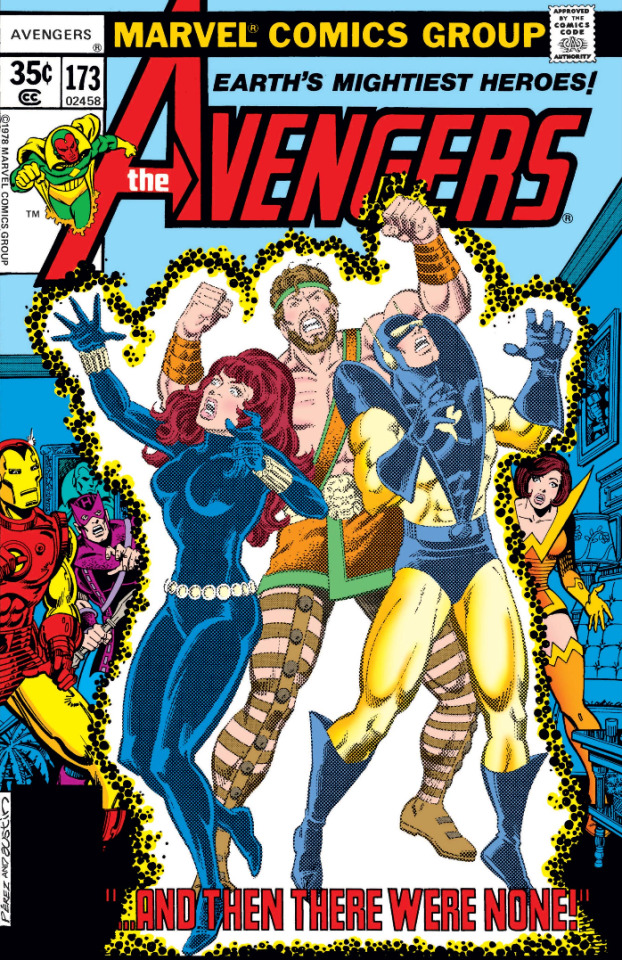
July, 1978
What the heck is up with Hercules’ shoes.
Oh also I guess Yellowjacket, Black Widow and Hercules are going to get kirby krackled? Maybe to death but considering the recent trend, its more likely that they’re going to get disappeared.
And though he has vanished, stern Vision is still with us in our hearts and also in the logo and in a picture in the background.
So last time: quite a bit of things. We’re in the middle of a saga so plot points are piling up. The Avengers met up with the future raccoon-less Guardians of the Galaxy who were afraid a cyborg named Korvac was going to kill Vance Astro when he was just a kid. So they’ve set up shop watching him. Meanwhile, Korvac has far grander plans like marrying a supermodel and chilling in short shorts in Forest Hills. He still killed but then resurrected Starhawk when the one who knows found him.
The Avengers have also been dealing with some disappearances. At first it was just people nobody would miss like Two-Gun Kid and Quicksilver but then beloved characters like Vision, Captain America, and Jocasta have vanished as well.
On top of all that nonsense Peter Henry Gyrich has taken away the Avengers priority status with the US government because of their shitty security. When it rains, it pours. And then it floods because you have consistently failed to plan for flooding in one-hundred and seventy-two issues of precipitation. Which is to say that in a large way the Avengers brought this on themselves and needed this kick in the ass.
But the most immediate threat is the vanishing Avengers so that’s where we start. With Iron Man assembling the best of the what’s left to try to figure this out.
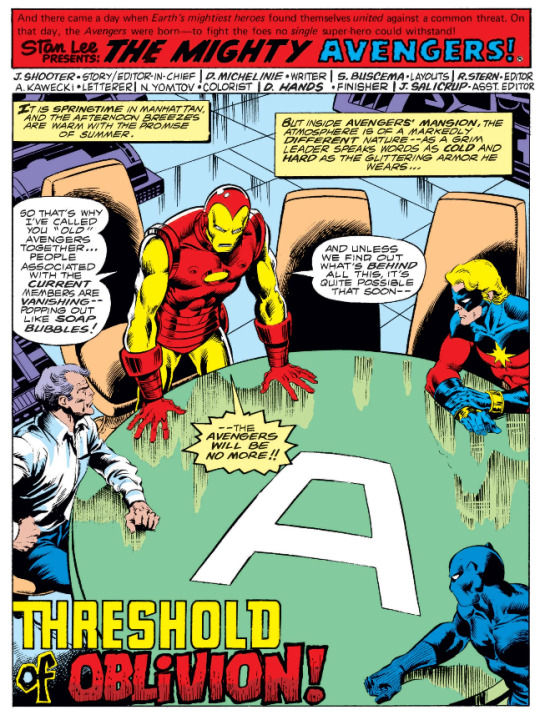
And by best I mean the Whizzer, Captain Marvel, and Black Panther. Two out of three ain’t bad.
But more help is on the way. Black Widow and Hercules arrive in New York via commercial airline (did they not repair the Champscraft after Iron Man broke it?). Black Widow and Hercules are Avengers adjacent characters so were called in by Yellowjacket and the Wasp.
Hercules is being an ass, flirting with a crowd of admiring women instead of disembarking, so Black Widow demonstrates the leadership skills that put her in charge despite being the non-powered person on a team with Hercules, Ghost Rider, Angel, and Iceman.
She shoots Hercules in the head.
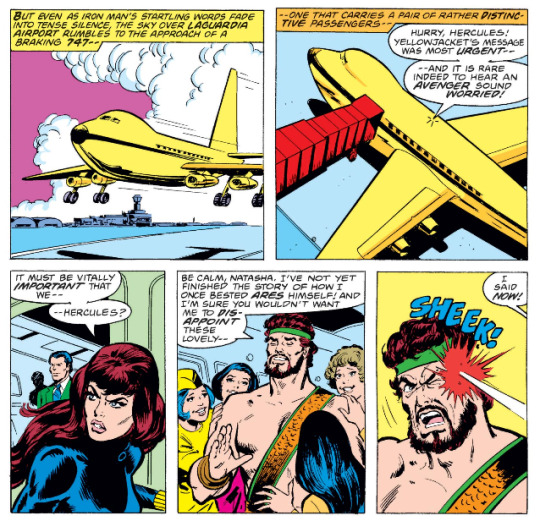
That’s her leadership style.
Hercules then shows why he’s not in charge of anything when he tears through the plane rather than go around the terminal and then smashes a helicopter when the pilot refuses to give them a ride since the Avengers priority status has been revoked.
That pilot is now destitute and will starve in the streets without his livelihood.
Anyway.
Hercules and Black Widow arrive at Avengers Mansion and join Iron Man’s round table from the opening splash page.
Iron Man still has no clue what technology might be behind the disappearances so he decides to work with SHIELD scientists to figure it- oh, nope.
Avengers are no longer authorized to contact SHIELD.
So Iron Man decides to do something perhaps a little sketchy and go over SHIELD’s head and contact Nick Fury directly using super secret emergency frequencies that he knows as Tony Stark.
But Nick Fury isn’t any help either (and Tony Stark is probably going to get an angry call in his future for sharing the frequencies (with himself)).
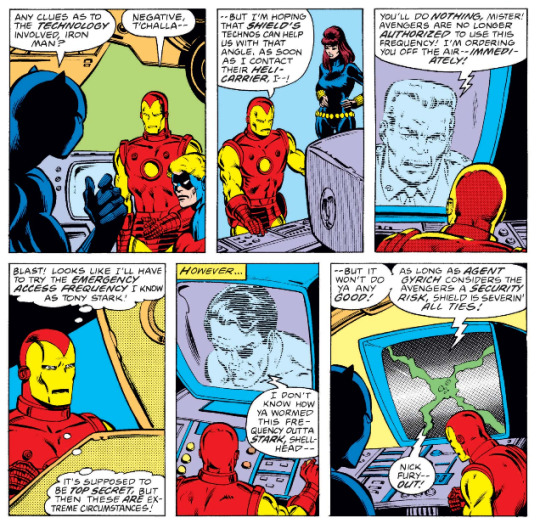
Nick Fury: “I don’t know how ya wormed this frequency outta Stark, Shellhead -- but it won’t do ya any good! As long as Agent Gyrich considers the Avengers a security risk, SHIELD is severin’ all ties! Nick Fury -- out!”
Dang.
Even Nick Fury won’t help them. And he’s as amoral and screw the rules as you can reasonably expect from the boss of an international spy organization. And this whole saga started off with them saving his satellite from a bigger satellite that was no threat to it.
No gratitude.
Anyway, in Forest Hills, Korvac spies on the Avengers.
Perhaps he’s bored.
Or rather, its part of an overall observation to make sure nobody is onto him, as he tells Carina when she comes in to offer him some cocoa.
And by the way, he turns her down. HE CAN JUST MANIFEST COCOA FROM NOTHINGNESS so screw your kind offer.
Kind of rude, Korvac.
Anyway, he also spies on the Guardians of the Galaxy, showing Karina through a kirby krackle viewing hole that they’re fully invested in guarding young Vance Astrovik with no thought to any other possible course of action.
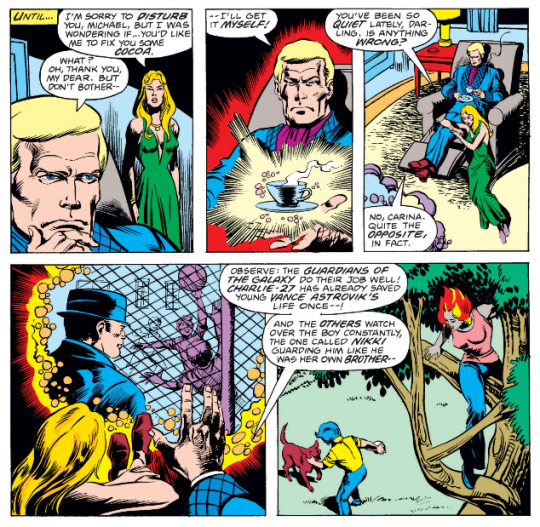
Korvac: “And none even suspect that they are acting on my will, as one of the myriad adjustments I must make in the cosmos to prepare it for my... proprietorship!”
I also want to note that its an incredibly bad idea for Nikki Gold to hide in a tree. Her hair is made of fire and trees are flammable.
But back to spying.
There are others that Korvac must spy on who are slighly less oblivious than the Avengers and Guardians so Korvac tells Carina to gtfo because he needs all his manly concentration and with none of her womanly distractions. Presumably.
So she leaves to go to her bedroom and cries because of Korvac’s cold indifference. Or perhaps because she’s secretly a spy and must now betray Korvac’s trust.
But as she goes to do... something? all with the crackling of energies, she stops.
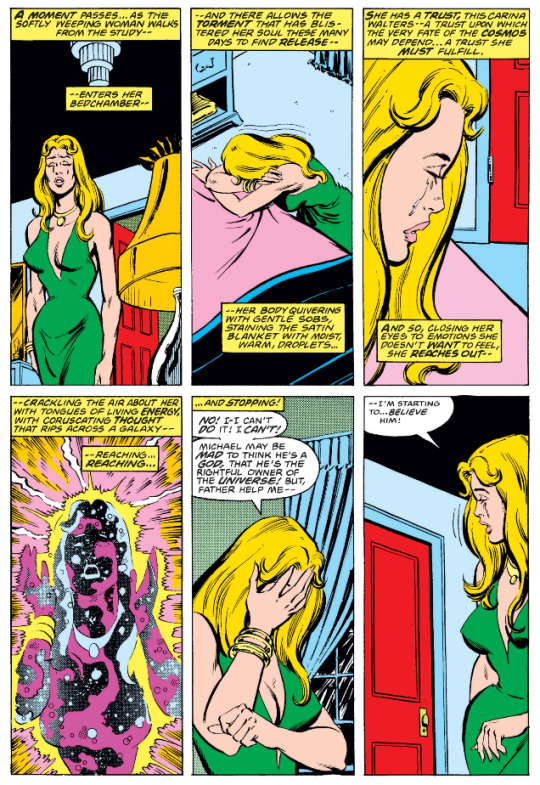
Carina: “No! I - I can’t do it! I can’t! Michael may be mad to think he’s a god, that he’s the rightful owner of the universe! But father help me -- i’m starting to believe him!”
It is perhaps my more modern sensibilities that has a problem with this. Korvac and Carina’s relationship has been almost entirely off-panel and in suggestion. One of the few times we’ve seen them relaxing together and he’s callously dismissive of her presence and her cocoa offer.
And yet their relationship and love for one another is a key facet of events going forward. So we have to take it on faith that these two love each other enough to motivate actions to come.
Even though Korvac is a typical example of emotionally unavailable take take take no give toxic masculinity.
So for this among other reasons, I will disagree with Korvac that he’s the rightful owner of the universe.
Mankind ills needs a savior such as him.
Anyway. I’m venting, somewhat. Hopefully this will make more sense to you later.
So. Korvac.
Using his PHENOMENAL COSMIC POWER he reaches out and watches the unbeknowst Watcher, peeps on Odin and Zeus, and spies on Mephisto’s brunch.
And satisfied that those great powers remain unaware of his schemey plans, he checks on Eternity. The big space weirdo that is actually the entire universe. Because comics are weird and so are Stan Lee and Steve Ditko.
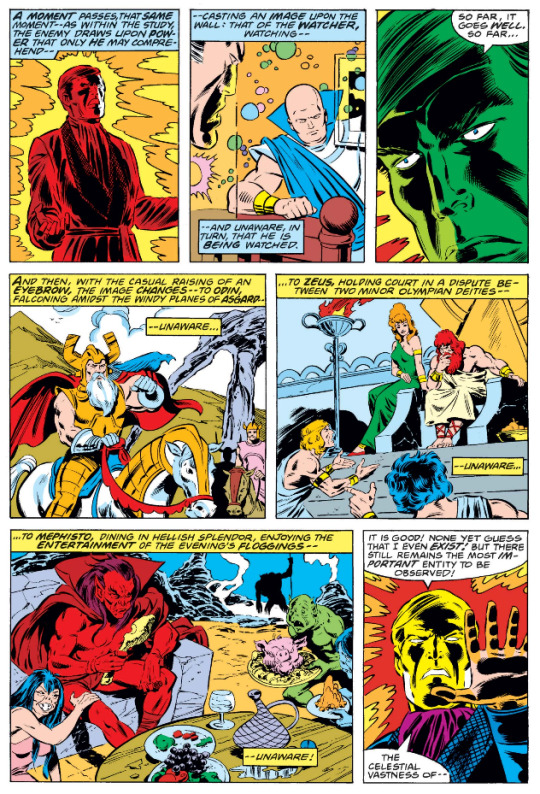
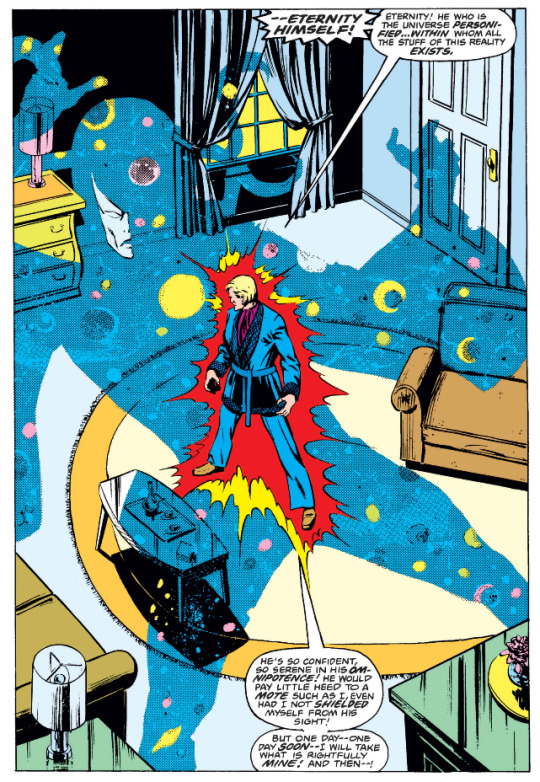
Korvac: “It is good! None yet guess that I even exist! But there still remains the most important entity to be observed! The celestial vastness of -- ETERNITY HIMSELF! Eternity! He who is the universe personified... within whom all the stuff of this reality exists. He’s so confident, so serene in his omnipotence! He would pay little heed to a mote such as I, even had I not shielded myself from his sight! But one day -- one day soon -- I will take what is rightfully mine!”
Korvac, you’re such an anime villain in so many ways. Scheming to usurp the universe and all...
However, with his senses outstretched or however you describe senses - like trying to hear harder? Senses are weird - Korvac feels something. A ripple in the cosmic fabric.
Coming from disturbingly nearby.
And he marches to Carina’s bedroom, slams the door open, and confronts her over her treachery.
But as he’s physically manhandling her, he looks into her eyes and sees only love.
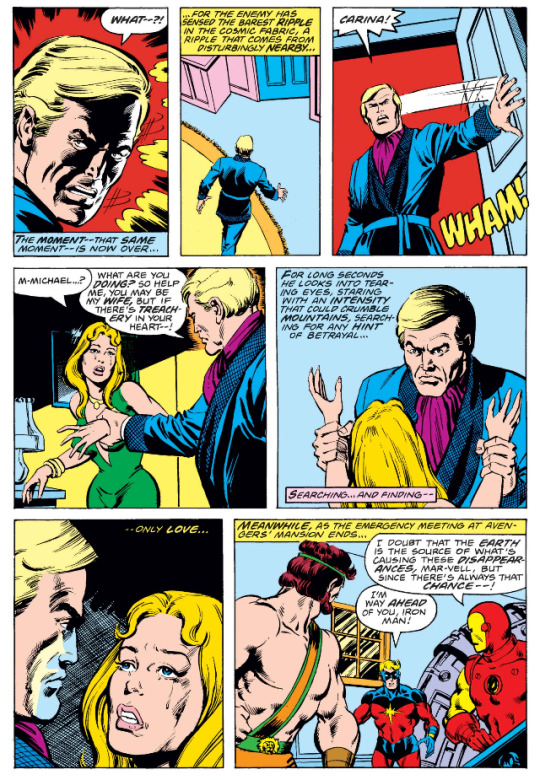
Remember: this is a love story.
Of sorts.
Anyway, back to the titular characters and their problems.
Captain Marvel flies off from Avengers Mansion to scour the world with his cosmic senses.
And since there’s nothing that Black Widow and Hercules can actually do at the moment (not even using her spy connections? Geez, Natasha. Geez), they go off to get their luggage from the airport.
On their way to the airport, Natasha and Hercules have Real Talk which is probably more relevant to the Champions book.
Basically Hercules says that since mortals live only a wink in the eye of a god “‘tis of little import how long one lives -- how well is what really matters!”
Which makes Natasha realize a thing or two about how Hercules sees her.
Anyway, back at the mansion again, Whizzer declines to help. After the Count Nefaria fiasco where his Old Man Nihilism helped save the day, he’s realized that he’s too old for this line of work.
And Hawkeye is not an ass for once. Instead he uses his bouquet of flowers arrow to try to cheer Scarlet Witch up. But with Vision and Quicksilver among the missing, she’s feeling some young woman nihilism. A simple trick arrow won’t be cheering her up.
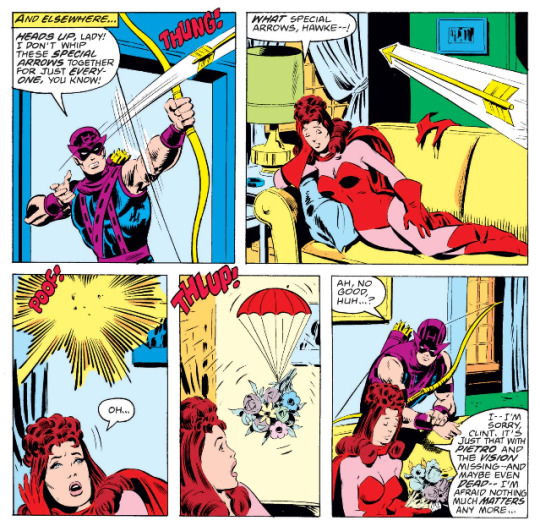
Although ‘simple’ is underselling it. How did he fit a bouquet of flowers in an arrow? WHAT ARROW SORCERY IS THIS?
I mean, he also invented anti-gravity to make an anti-gravity arrow that one time. Its possible that Hawkeye is actually a scientific genius who also happens to be a garbage fire. Or an actual arrow wizard. Who also happens to be a garbage fire.
Also, a Russian steamer slowly approaches New York carrying a weird old man who carves a doll of Scarlet Witch and is just reeking of foreshadowing. What is this guy’s deal? You’ll have to wait and see. Or just google it. Up to you.
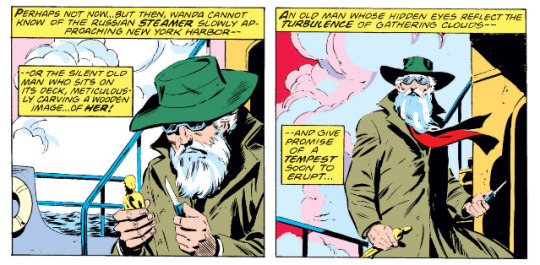
Meanwhile Thor returns from one of his Thor trips. But weirdly he doesn’t recognize Wonder Man. Or remember the battles against Graviton or Count Nefaria.
Something weird is going on, Thor-wise. He doesn’t even accept half of Wonder Man’s sandwich.
Although the sandwich wasn’t cut in half before Wonder Man started eating it so its kind of a weird offer.
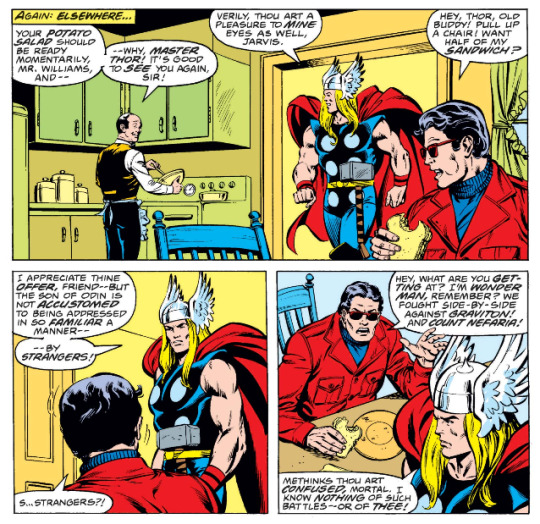
Meanwhile, in the Avengers laboratory. Yellowjacket is starting to feel like a character in an Agatha Christie novel. Perhaps like a giant bee alien that has been programmed to follow murder mysteries in times of stress.
The Avengers’ equipment isn’t sensitive enough to track the disappearances and none of the people they’ve reached out to have been willing to help them because of Peter Henry Gyrich taking away their priority status.
I have to wonder why they didn’t reach out to the Fantastic Four, honestly. Not even a call that ends with ‘sorry we have our own troubles.’ They just didn’t even try. Nor the X-Men nor the Defenders and their magic guy Mr. Weird.
Although in fairness, the Defenders are dicks. But why not the Fantastic Four?
Oh shared universe, sometimes you’re not so shared after all.
But Black Panther hits upon an obvious idea.
They’re in good with the Guardians of the Galaxy, right? And their Drydock space station is just hanging around not doing anything, right? With technology a thousand years in advance of the Avengers’? Why not just get in touch with them and get them to sort it out?
This idea is so good that Black Panther and Yellowjacket spontaneously cease to exist.
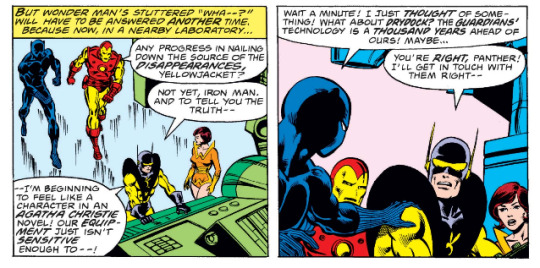
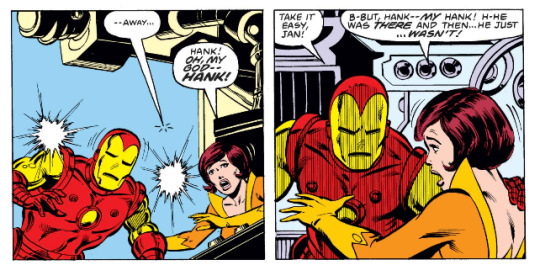
Or maybe they’ve been disappeared by the mysterious adversary.
And Scarlet Witch and Wonder Man were also taken, as Hawkeye and Thor run in to report.
Is it targeted? Or opportunistic?
Black Panther just came up with a good idea and Yellowjacket was about to put it into action when they were vanished. But nothing stops the non-disappeared members from just doing what Black Panther suggested.
And they do do that. Iron Man contacts Vance Astro aboard Drydock and he tells them that he has traced a radiation trail to an object three cubic meters in size orbiting Earth. Which Astro directly compares to the size of a phone box.
Curious and also more curious.
Was Doctor Who the villain all along?
Probably... probably...
Anyway, now that they know where has been causing this trouble, Iron Man asks Astro to teleport the Avengers to it.
He questions the sense of squeezing so many people into a phone box (he would have hated the 50s) but goes ahead and does it anyway.
Inside the bigger on the inside phone box shaped object with a function that allows it to go unnoticed, a chameleon circuit if you will, the mysterious shadowy foe from the end of last issue is gloating over his collection of Avengers in tubes.
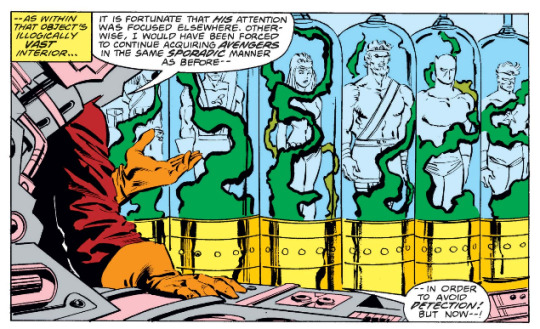
Mysterious shadowy foe from the end of last issue: “It is fortunate that his attention was focused elsewhere. Otherwise, I would have been forced to continue acquiring Avengers in the same sporadic manner as before -- in order to avoid detection!”
We also see that in addition to the ones explicitly yoinked (Wonder Man, Yellowjacket, Scarlet Witch, Black Panther) the mysterious shadowy foe from the end of last issue also snagged Black Widow, Hercules, and Captain Marvel.
Geez. Letting them go off unsupervised really didn’t pay off.
Anyway, the four remaining Avengers (Iron Man, Thor, Hawkeye, and the Wasp) loudly announce their presence instead of trying to keep the element of surprise. And by that I mean it was all on Hawkeye.
But the mysterious shadowy foe from the end of last issue isn’t upset to see the Avengers storming his not-TARDIS. In fact, he’s thrilled
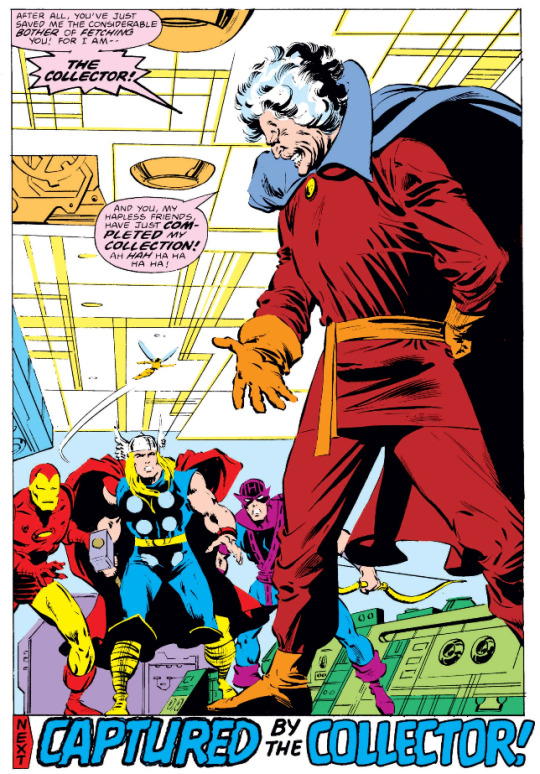
The Collector: “‘Cowering’? But my dear fellows, I’m absolutely delighted you’re here! After all, you’ve just saved me the considerable bother of fetching you! For I am -- THE COLLECTOR! And you, my hapless friends, have just completed my collection! Ah hah ha ha ha ha!”
Oh hey its this nerd again!
Good twist, good surprise villain! I love the Collector. Always with the attempted collecting of the Avengers for reasons. Always with being a huge nerd.
And this time he actually managed a scheme that wasn’t dumb. Instead of pretending to be Tom Fagan, he just kidnapped the Avengers with teleportation while invisibly hiding out in orbit in a not-TARDIS. And he would have and might still get away with it if it weren’t for that meddling Vance Astro!
Of course, this isn’t a typical the Collector story. Its part of the Korvac Saga and that leaves open the question of why. We have to assume that the distracted ‘he’ the Collector spoke of was Korvac and his inattentiveness scanning the great powers and yelling at his wife was what allowed the Collector to step up his kidnapping game.
But why? I guess we’ll find out
Next: Captured by the Collector!
Please follow @essential-avengers if you like these posts. Or even if you’re benevolently indifferent.
#Avengers#Iron Man#Black Panther#Thor#Scarlet Witch#Wonder Man#Hawkeye#the Wasp#Yellowjacket#Carina#Korvac#up to something#a mysterious shadowy foe from the end of the last issue#Essential Avengers#Essential marvel liveblogging#the avengers are super bad at problems they can't punch#Henry Gyrich undermines the Avengers more than any villain ever has#Korvac Saga
26 notes
·
View notes
Text
Ex-Aid review: Choh Superhero Taisen
Ex-Aid's spring movie, from a distance, just looked like the familiar Rider/Sentai crossover format doing its usual thing. But recently, a producer at Toei has confirmed that they will no longer be doing crossover movies in the spring, meaning that Ex-Aid - turns out - has given us our final "so-called spring movie" experience.
In this world where weird and questionably written crossovers may cease to exist, let's see if it at least went out with something akin to a bang.
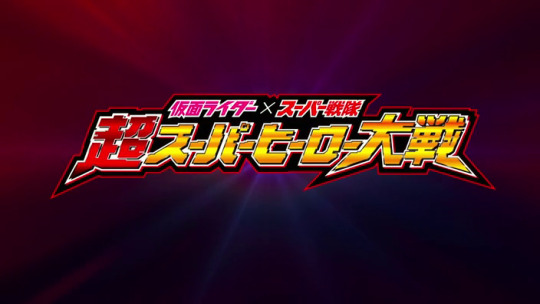
Choh Superhero Taisen is a bit of a silly name. I mean, it implies this is a SUPER version of the usual spring movie crossover, but to be a little more accurate, this movie is... kind of like a better version of the first couple swings they took at the Rider VS Sentai angle.
To recap, we got a Fourze-era crossover that did not really give a good first impression, then a Wizard-era crossover I can't remember a single thing about except Space Shocker. Gaim and Drive went the route of Rider VS Rider, both in kinda interesting but shaky executions, and Ghost had a focus on the original Kamen Rider making a modern day appearance.
Oh and just to quickly establish the timeline here, Maximum Gamer premiered in the show and Kuroto got what he deserved. Bit of a shame since I’m sure he’d have a lot to say about the kid in this movie. Anyway, let's begin!
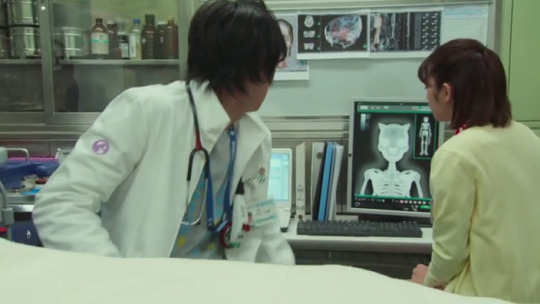
The movies opens up in Korea being attacked by the game Xevious. The Kyurangers send all of their attack stock footage at the invaders, which you would think the Cyber Rescue Center would know about but they are instead dealing with a strange patient who apparently has a tail. Oh hey, Zyuoh Tiger!
The way the movie plays out beyond this point is really weird. It feels like when Inoue wrote the OOO portion of Movie Taisen Core - things are oddly slow and somber for a series known for being bright and peppy.
It’s uncanny. Hiro literally proclaims he will operate on Zyuoh Tiger even if she's an animal and no one bats an eye at that comment. That’s how weird it is. And when they see the Kyuranger mech land in the middle of the city, it’s treated as a quiet ominous moment like something bad is about to go down.
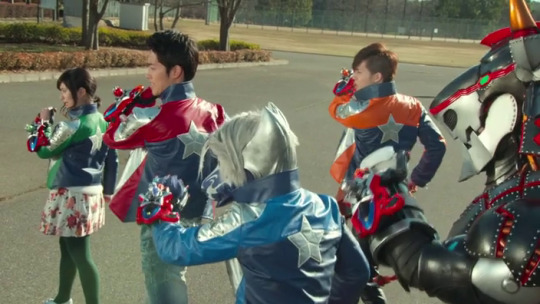
Okay, to be fair, that part is ominous because the Kyurangers are here for Poppy since they think this video game character is linked to other video games attacking reality - I guess since they have a lot of research at their disposal, because they know what Bugsters are!
But just as the Ex-Aid VS Kyuranger stuff begins, it quickly ends once Shishi Red... decides Kamen Riders are heroes because there's a game called Choh Superhero Taisen that Riders and Rangers are both part of. I mean, he's not wrong?
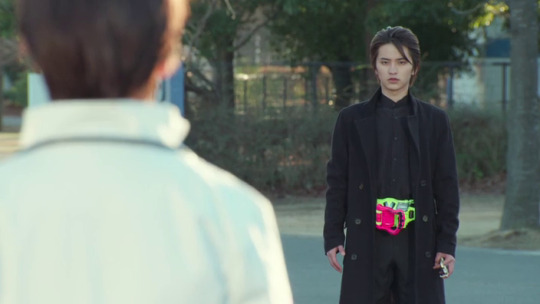
So yeah, that's a thing! Choh Superhero Taisen is a game that’s invaded this world and challenges Ex-Aid. Among its returning Riders/Rangers is an alternate version of Hiro, transforming into Kamen Rider True Brave.
I was VERY interested in learning the backstory of this character - is it an alternate universe thing, or what? Turns out, he's a video game character... and for story reasons, it’s a Hiro who took a different path in life.
It sorta makes sense, I promise.
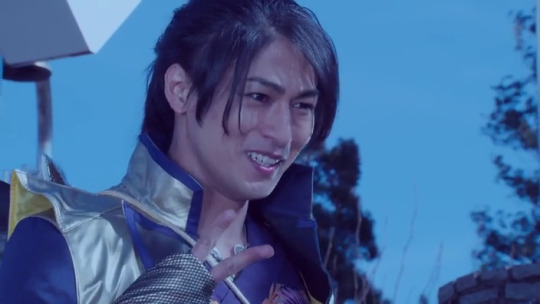
Things get interesting once Ex-Aid and Poppy enter the world of Choh Superhero Taisen, which is more or less a bunch of Toei's usual filming locations but with returning actors accompanying them!
The first being Kyoryu Gold from Kyoryuger, Utsusemimaru - or Utchy for short. I watched at least half of Kyoryuger so I can appreciate his cameo. He does his Brave Daze thing and he gets some good action.
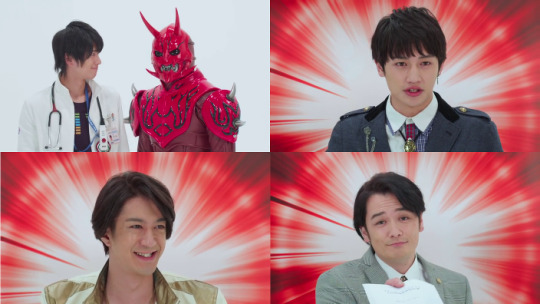
More importantly, you can't have a bunch of returning actors without Toei proving they can somehow keep getting all of the Imagin from Den-O. And I can understand someone being sick of them by now, even if you were a fan before, but the scene where Ex-Aid has to pick his team makes me smile. Although... considering ToQGer's premise, should Urataros really be flirting with one of the girls?
MOVING SWIFTLY ALONG, Emu chooses a "Gorider" team, with Momotaros being Pink - it's a pun. Ex-Aid uses Robot Action Gamer to cheat his way into the Red slot, which I kinda wish someone called him out on.
Ao Ninger makes an easy return as Blue, providing a nice callback to Ninninger as he basically takes charge and tell's Emu to pick his master, Magi Yellow, who taught him magic - but ends up calling Beet Buster from Go-Busters instead, because same actor. That was cute.
Lastly, filling out the team’s Green slot, the out-of-nowhere return of Zolda from Ryuki! I... y'know, it's best they didn't address his cancer since this is supposed to be the "game world" Zolda. Instead, they lean into his lawyer-ness - it felt very appropriate for him to dismiss the Gorider thing and only take part if they signed a contract. I also enjoy how he keeps referring to Momotaros as Goro-chan. It’s cute. I don’t have the heart to tell him Goro is in Zawame.
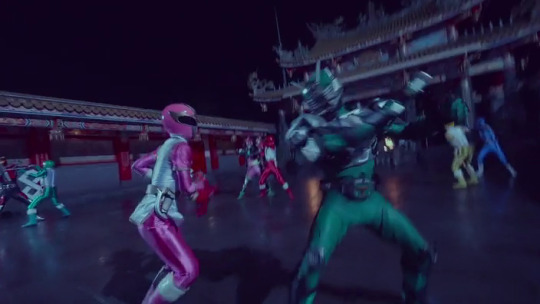
With a team decided upon, this starts to feel like an entirely different movie with Riders VS Rangers. My only gripe here was I could've used at least one more fight. You get a nice tournament chart that shows you all of the different fights happening offscreen, and to be quite honest I needed to see the Dandy team in action.
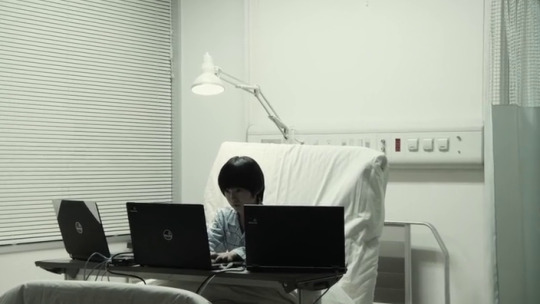
Right, so I should talk about the kid now. There's a patient Hiro was responsible for, who made the Choh Superhero Taisen game and disappeared afterwards. This is where things get interesting because Hiro has this logic of "I won't perform surgery on a patient unless they want it", which was used well in the show. Hiro presented the kid a chance to be cured, and he said no, so Hiro reluctantly accepted the kid’s choice.
Essentially, Alternate Hiro was made in this kid's game world as a personification of Hiro's guilt, and acts as his aide. It kind of works. But it kind of doesn't? Which is really a good way to describe spring movies as a whole.
However, I dig the alternate Hiro in concept. He isn't an evil version of the character like you'd expect - he has some sense of justice to him, he's protecting this kid after all, it's just that he's wrong in the eyes of the actual Hiro because it conflicts with his own ethics. This may be the best part of the movie, or at least the part with the most depth.
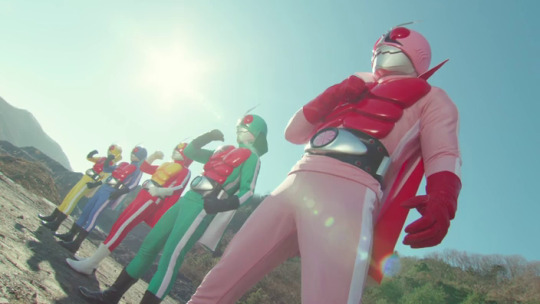
Oh right, so Ex-Aid and the others on his team become Kamen Sentai Gorider... which is a combination of the original Sentai and the original Kamen Rider... and it's about out of place as it sounds.
It feels right at home with all this chaos, I guess. But I don't have much to say about it beyond that. I still gotta watch the actual Gorider special.
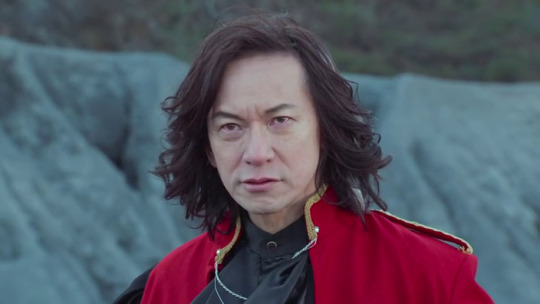
Not a shocker for something to feel out of place in one of these movies. You know what’s also out of place? Shocker! Yes, the original villains are back again, and this time-- they don't have a different name, but I'd like to call them Game Shocker, because it implies they're living on in yet another form.
They also have a new young leader, Shocker Leader III to be exact, which I was admittedly interested in learning more about. The actor made a big deal about how he thinks of Shocker as a group that admires the Kamen Riders, quoted saying "I want you to understand Shocker's feelings".
In all honesty, though, the character doesn't stand out to me as being any different than a generic Rider movie villain, and would have probably been better off in a different movie. A shame too, because I love the idea it sounded like he was hinting at.
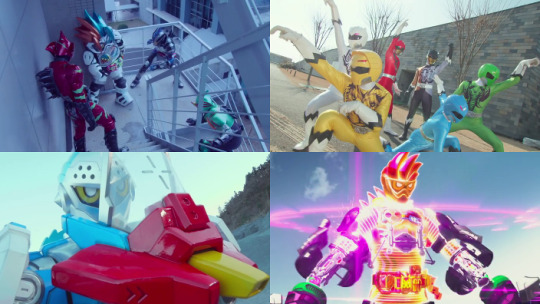
The movie is all over the place, and there's some things I wanna talk about but feel like I don't need to dedicate a whole screencap to. Let's go through these real quick...
Among the many cameos, we get the Kamen Rider Amazons crew, which includes Alpha, Omega and the then-new Neo! I haven't seen Amazons and this cameo taught me... they fight aggressively. I’ll be honest, I really felt nothing from this cameo. But I can appreciate how they added the dramatic lighting Amazons is known for. And Ex-Aid cleverly added some game logic to the fight by looking for a hidden power-up. He probably connects all of the pork chops in Castlevania.
The Zyuohgers make a cameo! That's pretty fun considering this is one show later. Unfortunately this cameo also made me realize Amu really did not have much to do with the story. I legit forgot about her while writing all this.
Brave uses Galaxian Quest Gamer, which wins the award for most pointless and rushed movie form debut. Like, I think he put on the armor and fought some dudes real quick and you never see it again. Galaxian played some part in the game world destruction earlier, but now that I think about it, you could replace that with Shocker to make them fit in better...
To end on a positive note, Ex-Aid uses a special giant Energy Item with Maximum Gamer to grow to Sentai mech size and fight alongside the Kyurangers' mech, which was a very fun visual since it involved a unique transformation in which Ex-Aid grows in size as the armor builds around him. This felt like a "They knew this was cool and wanted to take it a step further" moment.
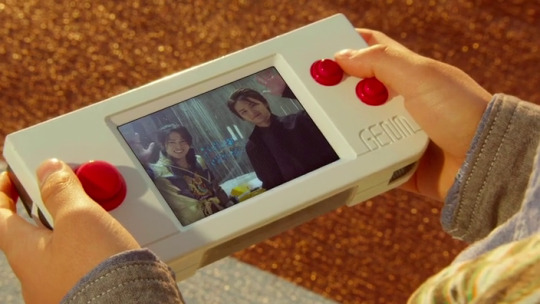
Since I sped through all of that, let's get to the ending.
There's a nice moment with the kid and Naga from the Kyurangers, as they both share the inability to properly express emotions, and I can appreciate how they made use of Naga even if I have little exposure to Kyuranger - that was nice and heartfelt.
Through a combination of Ex-Aid's previous efforts and Brave's current efforts (pretty cool having both of them involved there), the kid is saved, everyone who got sucked into the game world is back out, and the status quo returns to normal.
The credits roll with a nice collection of cards based on all the characters in the movie.
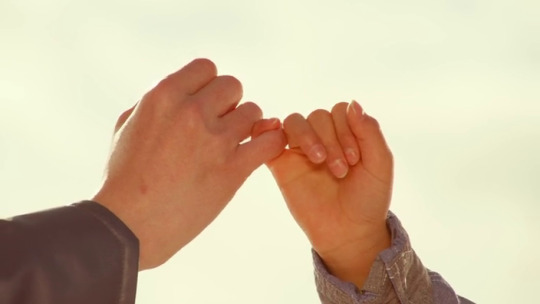
So how did this one turn out? Well, as a movie, pretty awful. As a toku movie, not great. As a Kamen Rider spring crossover movie, it's a'ight I guess? I feel like I'm a lot more forgiving of these than others - even though I'm not opposed to making fun of things like Tsukasa's bad hair day or Space Shocker, I do get something out of these, so that's why I watch them.
With the idea in mind that this is the final spring crossover movie we'll get out of Kamen Rider and Sentai - as the upcoming spring movie is gonna be about Amazons instead and the future beyond that is uncertain - I think they could have ended on a far more typical clusterfuck note. Arguably, they did? But I think among the far-too-many ideas this one had, some of the ideas were good. And for a movie trying to make heroes fight other heroes, it's doing so in a fun way by making use of Ex-Aid’s game motif.
I'm gonna miss these movies. They weren't great, but they were fun eye candy. I'm gonna be interested in seeing what they do with that spring movie slot - will Amazons be the last spring movie entirely, or will it be Toei's go-to for "We just wanna make some kind of thing" movie projects? Only time will tell!
I think you know what comes next, right? I’ve got the first winter movie reviewed, now the spring movie - so obviously spinoff material next. Or the summer movie! Whichever happens first.
9 notes
·
View notes
Text
So Attilan has less than 2,000 people living in it? Like when Black Bolt and Max Bolt are teenagers, it’s 1,400 people, so this is being generous. This is a lot of people having babies and no old people dying generous.
This is so tiny! So unbelievably tiny. Like, this makes it so much more egregious that Medusa didn’t realize Auran could just regenerate? How do you not know that? She’s one of forty people in the entire fucking dome in your age cohort, you’ve known each other since you were kids, and she’s been your bodyguard for years.
Also, how do you wind up with downtrodden masses when you’re the size of a high school? What the fuck are they even mining? I just went with it before, but now that they’ve established that the twenty or thirty royal guards who staged the coup with Max represent something like 2% of the population, I suddenly have so many questions about what the fuck the underclass could possibly be mining that’s of enough value to Attilan that it’s a continuous activity. I mean, you can’t mine for food? I think NASA would have noticed a lot of offgassing if they were mining fuel? It kind of looks like a coal mine, but that would require a natural history of the MCU’s moon to be so radically different from anything sane that I don’t even know how to begin addressing it.
Speaking of which, the guys helping Gorgon because he’s fighting for his king, and they had a king until Congress declared them a state? Dear writers: There has actually been a recent goddamned film about this. The Hawai’ian monarch deposed after we sent in the Marines was a queen. It would have taken ten seconds to look it up and fix the line. Also, I think those guys are pot farmers, which means that two separate Inhumans have gotten lost and blundered into two separate pot farms full of twitchy guys with guns willing to adopt weird strangers for no apparent reason. I mean, Hawaii could give a shit about pot, but Oahu’s 600 square miles. This seems statistically unlikely.
Though the teeny tiny size of the Inhuman homeland/city-state/postage stamp does cut them a little slack in terms of being ineffective.
“You’ve never seen anything like these elite warriors coming to fight me,” says Gorgon, to a bunch of guys who live in the same world as Ghost Rider, watched aliens fall out of a wormhole and fly around New York City on live tv, and ignored C-SPAN when a Congressman yelled at a dude with a super-public drinking problem for not letting the military also play with his robot rocket-armor.
The elite warriors coming to fight Gorgon: get distracted by the very existence of a forest.
The most effective members of the elite squad--which Gorgon trained himself, he’s quick to say--turn out to be Auran, because she seems to actually like hitting people or at least to really not like Gorgon personally, and Mordis, who’s basically Cyclops in a gimp suit instead of glasses and who doesn’t want to be on this stupid mission.
Also, I’d like to take a fucking second and talk about how Inhumans really doesn’t feel like part of the shared universe? And I mean that way beyond the basic problems of a lot of other stand-alone shows/movies, where you get awkward references to “the Incident” or the Avengers but you know Robert Downey Jr.’s never going to fucking fly in and blow up the bad guy with a cigar-sized rocket fired from his wrist launcher. Daredevil’s never going to turn around and find himself face to face with Loki, the Punisher’s not going to try to kill Spider-Man, Agents of SHIELD aren’t going to arrest Robert Redford. But they all go out of their way to assure us, the viewer, that they’re aware of these things, these people, these events. However clunkily they’re handled, there are ripples from one property into the next.
The closest we get here is a native Hawaiian with Inhuman ancestry and now-active powers asking if Black Bolt got bit by a radioactive bug, which sounds more like Deadpool making a Batman joke than universe texture, because it’s not like Spider-Man’s origin story is public knowledge. The guy makes it clear he was just some dude before his transformation, so it’s not like a government agent cracking jokes about how super-beings get their powers.
Basically, Inhumans shows us the royal family watching the news on their little in-pool monitor. Medusa knows what cars are, what traffic sounds like, in spite of never having been to earth. Black Bolt’s been sending special ops missions to rescue earth-bound Inhumans whose transformations have put them in danger from human governments. Everything seems to be taking place now--people are running around with smartphones and modern cars--meaning the royal family should all be aware that superpowered jackasses and weird science-magic gods and helicarriers are things.
But when Gorgon spouts off about the soldiers he’s with having no idea what’s coming, it doesn’t feel like arrogance--it feels like he’s talking about a world where he hasn’t watched the Hulk trash a skyscraper live on CNN, where he didn’t see replay after replay after replay of a flying dude with a magic hammer fight a levitating space-grub the size of a whale on the news, where an army of repulsor-powered malevolent super-robots didn’t fly off with an entire fucking city. It feels like the show’s taking place on a version of earth where Inhumans are more or less the weirdest things going on. Given how careful showrunners have otherwise been about keeping properties tangibly within the bounds of the shared universe, and the fact that Marvel gave the first two eps a theatrical release, it’s weird and vaguely offputting.
Bonus round: Karnak is captured by pot farmers, one of whom wants to kill him to keep from being discovered, and he ineffectively kicks a table over. The guy who wants to kill him looks at him and goes “What the fuck, dude, why’d you do that?” and one of the other pot farmers looks at the dude and goes “I don’t know, Chad, maybe he’s mad you just decided to murder him?” and there is nothing you can say to convince me that line wasn’t ad-libbed.
For those of you keeping score at home, the show’s three episodes in and has featured one of the three prominent female characters getting depowered, and both Asian actors’ characters being either killed or depowered. So, you know, not great, Bob.
So far the most realistic thing in the whole 2.5 hours of show has been the cops not fucking bothering to hand the guy who can’t speak a notepad and a pencil instead of carrying on like him not telling them his name is a goddamned affront to their authority. Like, it’s stupid, but also completely believable.
#inhumans#plus we're this far in and still have no idea what's going on with the fucking space agency#or even that down on Max#HOW DO YOU CAST RAMSAY BOLTON AND NOT BOTHER MAKING HIM THAT VILLAINOUS?#Maximus the Mad or you know Maximus the Creepy but Not Exceptionally Terrible by Attilan Standards I Guess whatever
6 notes
·
View notes
Photo
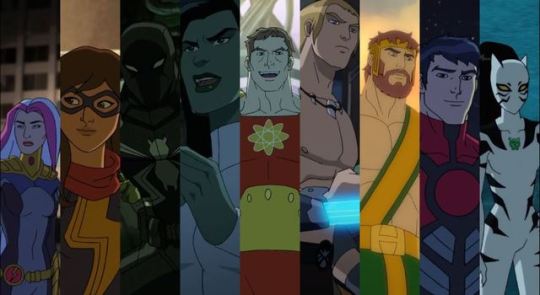
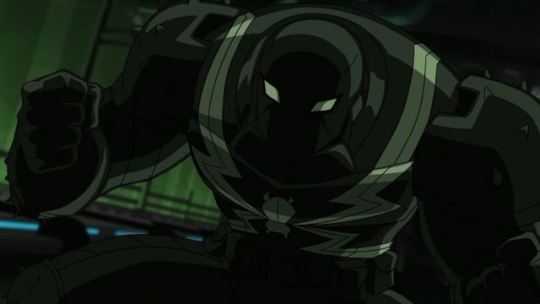

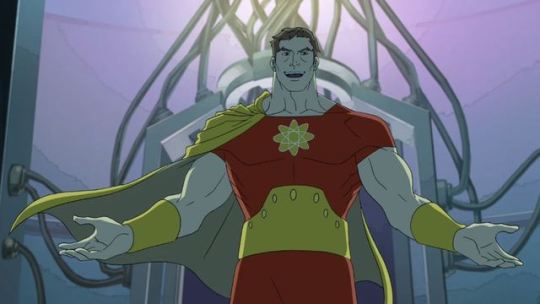

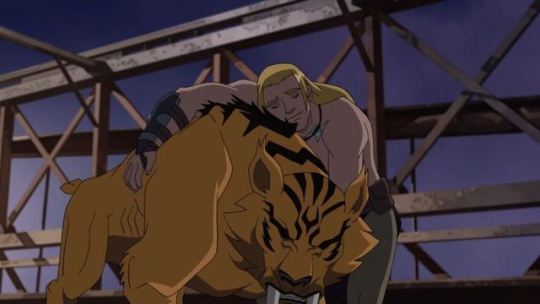
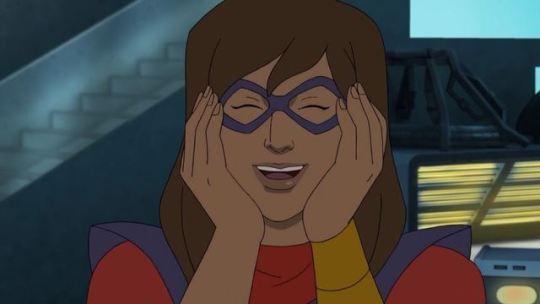
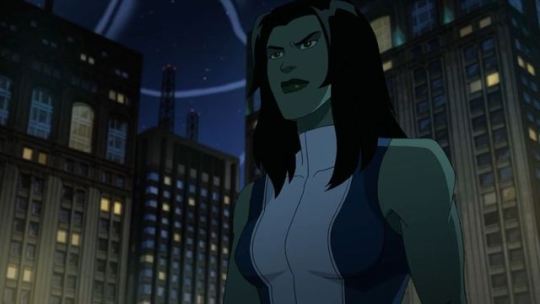
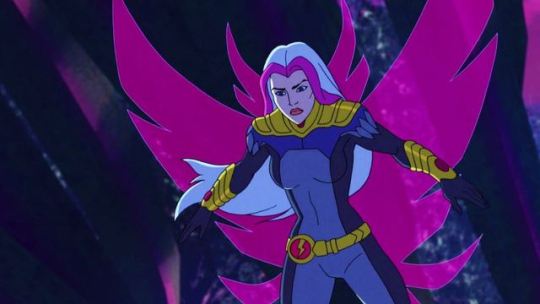
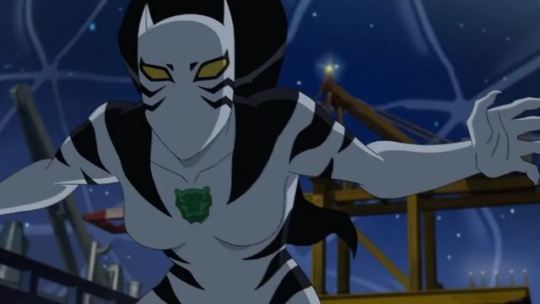
9 MARVEL CHARACTERS I WANT TO SEE IN THE CINEMATIC UNIVERSE
Just spitballing for fun here!
To celebrate September 9th, here are 9 Marvel Heroes I would like to see making their debut in the next phase of Marvel Cinematic Universe. By MCU, that means for the movies... NOT for TV. I'm not saying because the TV side is... bad (even if I do lean towards that conclusion, it would be a subjective opinion), but I just don't think TV would be able to do justice with these characters due to various constraints (budget, VFX quality, etc).
It's already widely reported that the 2019 "UNTITLED Avengers" will serve as the culmination of MCU since 2008. That means, the door to welcome new characters and IPs would be wide open. So these are the names I would like to see getting the spotlight, and perhaps, assemble into a new set of Avengers. One might easily notice that the names I'm including here are characters from the animated "Avengers Assemble" series. That's actually... INTENTIONAL. One, because that means Marvel Studios obviously has the rights to use them (or at least partially, like the Spider-Man characters). And two, because I want this post to have a similar look and feel. But I'm NOT leaving behind other characters who have yet to show up in that series. That's why there's a special 'Bonus' section afterwards... (^^)v
Now that the explanation is out of the way, let's start right away! Here they are, in alphabetical order:
Agent Venom
Coincidentally, the first one is already a tricky situation. Eugene "Flash" Thompson is a Spider-Man character, so the rights to him is owned by SONY. That company is already working on a "Venom" movie that might not (or might?) be part of the MCU, with Tom Hardy as the lead. On the other hand, a modern-bully version of Flash has already debuted in the MCU via this year's "Spider-Man: Homecoming", as brought to life by Tony Revolori. Of course, the prospect of seeing a talented actor like Revolori becoming a headlining hero, is just too good to ignore. Mind you, it might take him a very long time (until after the high school characters graduate?) before arriving in a possible bittersweet situation (in the comics, Flash had to lose his legs first). But overall, Marvel Studios has already sown the seed for Agent Venom's debut. I can only hope this idea will be realized somewhere in the future...
Hercules
Odd choice, huh? But hear me out. We haven't had a great Hercules movie for a long time (my favorite was still Disney's animated-musical version, and it differed massively from the mythology). So why not leave it to Marvel Studios to do justice for the figure, and make a HUGE name out of him? The comic version of Hercules Panhellenios is a struggling, washed-out, unemployed hero, who spends his time slacking around and being a disappointment to others. True to his metaphorical title as a fierce male lion, huh? This situation and condition would carry massive potentials to explore in the movies. He can also take over Thor Odinson's position to expand the MCU towards more Greek-based mythological stories. Would you like to see Herc fighting Cerberus or Hydra (the monster, not the NAZI organization) in live action? I sure do. Good ol' Herc has seen a return to spotlight recently, with his own solo comic series. So what an excellent time to promote him for his own movie too! Since Chris Hemsworth and Pratt are already in the MCU (IMO, both are giving off a strong Hercules vibe!), perhaps Marvel Studios can hire... I don't know, Joe Manganiello as the lead actor?
Hyperion
Another mythological-esque hero! Unlike Hercules though, Marcus Milton has a completely different origin, being descendant of... the Eternals. Yes, the "Guardians of the Galaxy" movie series have already introduced this powerful race, which means, the route to Hyperion's debut is more or less smooth sailing. Interestingly, Hyperion is well known as part of the superhero team "Squadron Supreme". That means, if ever Marvel Studios needs a 'replacement' for the Avengers, this group is a good candidate. Just like Herc, Hyperion has returned to the limelight with a new comic series lately, eventhough it was cancelled after a few volumes. I admit, being a copy/parody of a certain DC hero, the character doesn't really have deep potentials. But that's why I trust Marvel Studios to give him the push he needed! As for the actor, for some reason, I would love to see John Krasinski in the role. Dude was considered to be Captain America before, right? And he's not another Chris. LOL.
Inferno
We're back to another tricky business. Dante Pertuz is a relatively new character, a modern version of Human Torch that FOX doesn't own. LOL. He's introduced in the recent years with the NuHumans storyline, which exactly leads to THE tricky situation. Yes, he's an Inhuman, and his origin story is deeply connected to the Inhumans Royal Family (specifically Gorgon). We all know that Marvel TV had taken over the Inhumans IP and turn it into a TV series (complete with bad writing, bad design, bad reviews *smh*). I'm VERY concerned the division would also want to capitalize on Inferno to boost the show's appeal, and I personally don't think that's a wise decision. Visual-effect wise, Mark Kolpack has admitted that creating Robbie Reyes' Ghost Rider's flaming head and chains for the 4th season of "Agents of S.H.I.E.L.D." was taxing and demanding. It's basically a movie-level VFX that required extra hours and patience, not something that can usually be rushed in a TV deadline. Now imagine doing that with Inferno, who emits flame from all over his body! But there's a bigger stake, here. You see, Dante's clearly a latino hero, and we haven't had one headlining an MCU movie until now. With his visual powers and relatable storyline (struggling with being Inhumans, a minority, rock star, and all), a movie would privilege Dante with the justice he deserve. I'm aware that highly likely Marvel Studios will be going with a cosmic Sam Alexander's Nova instead, and that's okay. But Inferno would be more current, if not more likeable choice.
Ka-Zar
Kevin Plunder came in to this list, with the same reason to Hercules. Because he's Marvel version of Tarzan! Hollywood has been trying to create a good Tarzan movie over and over again, and they're either an okay hit or a sad miss. As far as I know, none of them were ever able to please every audience, not even Disney's animated version. But Ka-Zar is different, because he carries more 'fantasy' than just trying to ape the King of the Jungle. The setting of his adventures, the "Savage Land" that's hidden deep in Antarctica, would be something magnificent to feature in the big screen. We've got Asgard, Kamar-Taj, Wakanda, why not add Savage Land too! Don't forget Zabu, his saber-toothed best friend, which would require massive CGI work. Suffice to say, the things I'm reading and hearing about Ka-Zar only leads to one conclusion: I want to see him in a live action movie! Now, who can portray him? Hmmm... a natural blond Brit like Charlie Hunnam, perhaps?
Ms. Marvel
All concerns I had for Dante, goes for Kamala Khan as well. Being a fellow Inhumans, there's been a rampant rumor recently that she'll be getting a TV series (supposedly the one John Ridley is working on). For me, that's a HUUUGE NOOOO. And due to THREE major reasons. ONE, similar to Inferno, TV budget won't be able to handle the VFX required to showcase her Inhuman ability with the right look and feel. Look no further than that underwhelming looking "Inhumans" series as example! Would you like to see an iconic figure like Kamala being reduced to a 'disaster' with the excuse of making her 'grounded'? You know, like what Marvel TV have already done to Medusa? I certainly DON'T. Kamala is basically the modern version of Mr. Fantastic, and we all know that even FOX have tried to do Reed Richards right in the movies several times, but still couldn't perfectly nail it. Downgrading this situation to a TV level would only make it worse. TWO, Kamala is a genuinely likeable and well-beloved character that easily captures the heart and attention of many readers throughout the world. If the 60s-90s had Peter Parker, Kamala's the youth representative for the modern world. Hip, cool, and current (being a social media freak and all), but also kind and caring... eventhough she's a triple-decker minority (Female, South Asian heritage, and Moslem) living in a racist country. Which leads me to the final reason. THREE, her story will have a MUCH BIGGER impact to the world as a movie. Releasing a Marvel Studios movie with her as the lead in an international market (including countries with Moslem as majority), would not only bank a great amount of money, but also sends the right messages: one, unlike its current government, Hollywood is NOT racist; two, that everyone can be a hero, regardless of their gender, race, and religion! Relegating a character this HUGE to a small-scoped TV series that not everyone can gain access to, would be a massive disservice. Kamala is the hero the world currently needs, so please don't undermine her into disappointments.
She-Hulk
Another tricky situation, though in this case, due to the confusing copyrights. Actor Mark Ruffalo has repeatedly said, that a Hulk solo movie won't be coming along the road because Universal has the distribution rights. What about his super-powered cousin, Jennifer Walters? It's unclear, but I can only assume that she has the same legal limitation. Thankfully, it also doesn't mean that she can't be used in a Marvel Studios movies. She just need to be included as part of an ensemble, that's all. The great thing about Jen, is that she's a lawyer and later a judge. Not only she's strong physically, but also academically. Won't that be a strong role model for young women and girls all around the world? We haven't really had a law angle in the superhero movies until now, with Daredevil occupying the Netflix universe. So bringing Jen into the light would be fresh and promising. As for who should play him, I don't have a particular choice, but someone with Award prestige like Emily Blunt, Charlize Theron, and/or Jennifer Lawrence would be a great get...
Songbird
Former villain turned Avengers? Yep, that premise alone would make a great story. Melissa Gold started off as a troubled woman, with broken family and harsh situation. Giving in to the world of crime (known as Screaming Mimi) was clearly her way to stay alive. Eventually she stumbled into the road of heroism with the Songbird moniker, and ended up becoming a full-time member of the Avengers. Just like the other characters I've included here, Melissa would be a great role model, especially for troubled teenagers. Her path of redemption proves that anyone, regardless of their past and issues, can be a hero too. An inspiring message that Marvel Studios need to share to the world. She doesn't sell enough as a solo movie? Well, then debuting her as part of the "Thunderbolts" would be equally okay for me. All the ingredients are already in the MCU anyway (Thunderbolt Ross, Helmut Zemo?). As for the actress, for some reason, I want to see Anna Kendrick in this role. Yeah, basically I just want to see her in a Marvel Studios movie, but I believe she would really bring justice to the gorgeous-designed Songbird.
White Tiger
We've already gotten an African "Black Panther", now it's time for a hispanic White Tiger! Her powers come from the mystical side, and since "Doctor Strange" has opened up the gateway to supernatural, we can have more heroes with this kind of origin story! I'm personally going with Ava Ayala, and not Angela del Toro, eventhough either of them would be wonderful. Why White Tiger? Same reason to Dante, and in a way, Kamala. Sure, the MCU have included numerous Latino actors who either got lost in the background (Jonathan Pangborn?), or turned out to be a scene stealer (looking at you Luis!!!), but we haven't really had a major hispanic hero in the MCU until now. More importantly, a female one! Debuting Ava in the MCU would also, once again, sends off a great message. The US government have been really discriminative about immigrants lately, including the hispanics. Putting Ava in the spotlight would remind everyone that South Americans CAN be heroes, and not criminals like what they're being wrongfully accused for. We truly need characters like this right away! As for who should play her, I'm currently setting my eyes on Gina Rodriquez of the hit series "Jane the Virgin".
Honorable Ment... SPECIAL ADDITIONS
The next characters are those who (as far as my memory serves) haven't made their debut in the "Avengers Assemble" series. So they sort of... didn't fulfill the basic requirement for my initial list. But it'd be unfair leaving them behind like that, right? That's why they are special 'Bonus' additions. Without further ado, in alphabetical order:
Brother Voodoo
For the record, I'm not being racist by sidelining the only black character to this section. The reason I put him here, is because his debut in the MCU movies is pretty much confirmed. Daniel Drumm, big brother to Jericho Drumm, has already made his appearance in "Doctor Strange" as the original protector of New York Sanctum Santorum. And director Scott Derrickson has already hinted that his death would lead to consequences, including the arrival of Jericho. Debuting Jericho as a sort of sidekick to Stephen Strange would be nice, but it would be much better if he gets his own movie too. Yes, there's an issue regarding his name, because using Voodoo might... well, attract criticsm. But titles can be tweaked, right? Considering Jericho ends up becoming a Sorcerer Supreme too, I believe he'll be perfect as the next black hero to headline his own movie.
Shang-Chi
I've already repeatedly mentioned that Marvel Studios NEED a major hero representing minorities, and this is another great candidate. Marvel Studios have brought several prominent Asian characters into the MCU, like Wong, Mantis (eventhough she's an alien), and Helen Cho. Yet they all share similar characteristic: they are all supporting cast. If Marvel Studios want to play it 'safe' and headline an East Asian lead character, then Shang-Chi is the go-to-guy. Nope, I'm not undermining him, but just pointing out how easy he would appeal to the audience. Shang-Chi is in a way, Marvel Comics' response to Bruce Lee. We all know that the world LOVES some Bruce Lee. And Shang is more than just a Bruce Lee copy, he's also a master of espionage who's determined to take down his own father's criminal empire. Pretty much a solid recipe for a James Bond-styled wuxia blockbuster hit, am I right! "Doctor Strange" has teased the use of martial arts to support magic, a hero like Shang would put it upfront as the star of the party. Marvel TV might have taken the stamp on Iron Fist (with mixed response), so Shang is the opportunity for Marvel Studios to do it RIGHT! Jon Woo, Ang Lee, or Jacky Chan can direct this, and as for the actor, Godfrey Gao is my top pick. But Ludi Lin, Philip Ng (star of the fictional Bruce Lee biopic "Birth of the Dragon"), or even Yoshi Sudarso (who is Chinese-Indonesian) would be fantastic nonetheless.
Spider-Woman
The last tricky affair of the day! Jessica Drew is called Spider-Woman, but she uses the 'Spider' moniker by name only, and unrelated to Spider-Man. That's why until now, it's currently unclear whether her movie rights is owned by SONY or not. She's actually one of the superheroine I've been itching to see in the MCU, but admittedly, these questions surrounding her place always put me on a weird crossroad. Drew is connected to Hydra, the High Evolutionary, and has always been a full-blown Avengers. And all of those screams MCU. She's also the best friend of Carol Danvers, so I honestly want to see her show up in "Captain Marvel". Her comic origin story sort of fits with "Captain Marvel" 90s setting too. Have Jessica encounter Carol when she was a child, then Jessica was put into stasis for years, only to wake up as a superpowered woman in the present day. And then she meets Carol again, and team up as the new Avengers. All's well ends well! I personally want to see Tatiana Maslany of the famous "Orphan Black" for this character, but Marvel Studios can always cast an Asian actress (like Constance Wu or Celina Jade) due to Drew's ambiguous background.
Young Avengers
This one initially started off with just William "Billy" Kaplan and partner Theodore "Teddy" Altman. A sweet pairing more famously known as Wiccan and Hulkling. My way of thinking was, it'd be rude and unfair to name just one of them, right? If Marvel Studios wants to go ahead and feature an LGBT representation, these guys are the one they should use. Is it possible? There's a hint that we'll be seeing Vision and Wanda Maximoff's relationship evolve in "Avengers: Infinity War". Perhaps somehow they end up bending reality, and Billy is magically conceived? Meanwhile, "Captain Marvel" confirmed that the alien race Skrull CAN be used in the MCU, so a half Kree-Skrull (his biological father is the original/male Captain Marvel) like Teddy is more than just possible. Basically, that movie is the only gateway needed for his debut in the MCU.
But then I began thinking. Why am I leaving behind Billy's twin brother Thomas "Tommy" Shepherd? Poor Pietro Maximoff was killed off in just one movie, why am I sidelining another Speed-ster? That's NOT right. Then the more I think of it, the bigger the scope gets. We have a Hawkeye and Ant-Man who are both fathers in the MCU. Why not include their protege/child? Katherine "Kate" Bishop might not be Clint Barton's daughter, but the two shared a special connection that would be great to depict on the big screen. And then there's Cassandra "Cassie" Lang who looks up to her father Scott, and aspires to be a size-shifting heroine of her own. Cassie has already debuted in the MCU as played by Abby Ryder Fortson, why not promote her into a hero too? And how could I miss out the lesbian latina America Chavez? Fitting in comfortably to all the diversity talk I've stated above, America is not only female, latina, she's also an LGBT representative. Another triple-decker like Kamala. JACKPOT!
So yeah, that's how I ended up with Young Avengers instead. If Marvel TV has "The Runaways", then Marvel Studios can have these equally (if not more prospective) young heroes! If we assume that we will no longer see the Avengers following the 2019 movie, then introducing the Young Avengers would be the most logical continuation. This movie doesn't even to take place in the present time, but a bit further in the future, or even in an alternate reality. That's the function of Reality Stone and Multi-verse, right? This team represents youth, fun, and diversity, sending all the right messages to the world. And at the same, enabling older actors like Jeremy Renner, Paul Rudd, Benedict Cumberbatch and others to serve briefly as mentor figures. There's also one other reason why this special team ends up being the last entry on this post (which is unintentional, to be honest): because I REALLY want them to show up in the MCU! \(*v*)/
So there you have it, the 9 (plus 4+) Marvel Heroes I want to see coming to the big screen. In the end though, this is nothing more than a personal opinion. It's obviously a very subjective thinkpiece, so anyone else might not have the same idea (if you do have your take, then do post them, I'd gladly read it!). I do however, hope that someone, anyone from Marvel Studios would somehow stumble upon this, read it, and put these names into considerations. I sincerely feel they will bring something NEW to the MCU, while continue conveying message of hope, inspiration, kindness, and good. After all, that's what Marvel Studios movies are for, right? Thanks for reading... enjoy your September 9th! Even if it might be just a regular day for most of us... XD
7 notes
·
View notes
Note
Thoughts on the Shadow's Doppelganger, Lamont Cranston
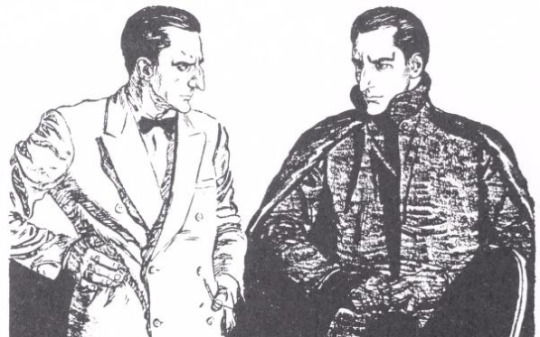
The funny thing about Cranston in the original stories is that, yeah, one of the most famous scenes across all Shadow media is the “Lamont Cranston Talks to Himself” chapter in The Shadow Laughs, where we learn that The Shadow is not Lamont Cranston, but has usurped his identity, and now shows up at his bedside looking like him, talking like him, knowing more about his own life than he himself does, and ordering him to leave town, effectively blackmailing him into letting him use his face. It’s a very iconic scene that exemplifies a lot of what makes The Shadow unique as a character, and you can imagine why so many adaptations have gone with the idea of Cranston being either a hapless stooge bullied into submission, or an actual villain, because that whole scene is very much a horror movie scenario.
Thing is, none of them seem to remember how Cranston and The Shadow’s relationship developed past this. I’ll post this excerpt from Atoms of Death:
"Good morning, Cranston," came a quiet tone from the foot of the bed.
"Good morning, yourself," returned Cranston, rubbing his eyes without noticing the visitor.
"You should say: Good morning, myself," chuckled The Shadow, dryly.
Cranston was pulling down the sleeves of his pajama jacket. He sat bolt upright, staring. Then a slow smile showed on his lips; one that was almost a replica of The Shadow's.
"So it's you," remarked Cranston, sleepily. "Well, I knew that last night. It was about time we crossed paths again. Well, old man, you landed me in for plenty this trip."
Cranston shoved bedclothes aside and perched on the edge of the bed. He found cigarettes on the telephone table; The Shadow supplied a flame from a lighter before Cranston could ignite a match. The millionaire noted that The Shadow's lighter bore the initials "L. C."
"You handle every detail, don't you?" questioned Cranston in admiration. “Jove! I remember the first time I met you. In this very room. You dropped cloak and hat and left me looking at my own face as plainly as if I had seen it in a mirror. Just as it is today."
"And I advised you," recalled The Shadow, in Cranston's own tone, "to take a trip abroad, while I used your identity. You were a bit exasperated at first."
"I must admit that I was. I threatened to have you arrested, as an impostor, until you proved that you knew more about my affairs than I did. I really believe that if it had come to a showdown, I would have been proven the impostor and you the genuine Lamont Cranston. Jove!"
"Jove," repeated The Shadow, quietly, "You have acquired that expression recently, Cranston. I shall remember it for future reference. You have a penchant for acquiring anglicisms during your sojourns in British colonies. Jove!"
"Bounder and blighter," laughed Cranston. "Don't forget those. I still use them occasionally."
Or this excerpt from The Hydra, which is an incredible book where the chemistry between the two really shines:
Lamont Cranston woke up and wondered why his head still whirled. It took him about half a minute to learn that the motion came from the fact he was riding in his limousine. Someone must have put him back in the limousine and Stanley was driving him home.
He didn't have to guess who had helped him on his way, for at that moment Cranston heard a low-toned laugh beside him. He turned to see the black-cloaked figure of The Shadow.
"What did you hit me with?" asked Cranston. "All four of your automatics?"
"I'm only carrying a pair tonight," replied The Shadow
Look at these two dorks, just palling around and getting into shenanigans and The Shadow outright joking around Cranston, like they are just two old chums having a laugh at the weirdness of their lives. The “real” Cranston didn’t show up very often in the original stories, especially in the last stories when Lamont Cranston essentially became the real identity of The Shadow, but when he did, part of what makes him stand out as his own character is that he’s funny. Gibson gets a lot of mileage out of Cranston as this guy who is completely nonchalant and chill about all the weird shit that happens to him, even in The Hydra after he kills a man with an elephant gun, he’s still more or less the same, he largely just walks out of it with a newfound realization.
Relieving Cranston of the elephant gun, The Shadow steered his friend into the closet. Hauling the big weapon with him, The Shadow opened the door to meet and dismiss arriving servants who had dashed upstairs when they felt the house quake.
"Whenever I see this gun," began Cranston, coming from the closet, "I'll remember what I did with it -"
“Quite right," interposed The Shadow approvingly. "What you did to Mance will make amends for any elephants you may have killed. Too bad Mance didn't bring along a few more Hydra Heads.”
Slowly, understanding dawned on Cranston. He'd never compared his big-game hunts with The Shadow's quests for men of crime. He felt that The Shadow's cause was justified, but it had seemed outside the field of sport. It still was, but Cranston, now that he had dealt with a murderer who deserved to die, was realizing that his game hunts were more deserving of rebuke.
His encounters with The Shadow gradually changed Cranston from a useless millionaire wasting his resources and talents on idle pursuits, to...still largely a useless millionaire, except his resources and talents are no longer wasted and he’s gradually grown into a useful ally and friend to The Shadow. The Shadow tends to have that effect on people who work by his side and even Cranston, the guy whose main role in his organization is to just stay away and be useless somewhere else, can’t help but change a little into a better person when he appears.
There’s an interesting article written by Bob Sampson called “The Third Shadow” which refers to the Bruce Elliot run of The Shadow Magazine, which is incredibly maligned by fans and not without reason, the stories all largely suck and the Shadow bears little resemblance to his former self, instead mostly feeling like a diet take on the radio show Lamont, more of an average detective. The theory Sampson puts out is that, during this period, it was actually Lamont Cranston who became active as The Shadow while Allard was busy overseas, and I definitely like this theory. It makes sense specially considering The Hydra sets up for Cranston to become more pro-active and serious:
While not the towering master-mind of Allard, he does become the next best thing: A post-war sleuth. He even indulges in wearing the cloak and slouch hat from time to time (to varying degrees of effectiveness), while trying to laugh like Allard (also to varying degrees of effectiveness) as if to fulfill that forbidden fantasy until he finally gets it out of his system. After all, The Shadow pretended to be him, why not the other way around?
As Bob Sampson put it: “It is always Cranston who explains all and takes the credit”.
Probably very cathartic for Lamont, who for the last 18 years was relegated to being a distant supporting player in his own life. Cranston is still in contact with the agents however. He even receives "assignments" from Burbank.
This entire arrangement could only be with The Shadow's tacit approval. Let us remember, Cranston was not merely some insipid fop. He certainly had done his own share of exploring and was indeed a hunter. He could handle a variety of firearms, was familiar with exotic peoples and their customs, knew how to stalk dangerous animals through the jungle and veldt, but he was not, nor ever claimed to be, a master secret-agent and soldier.
I think it is fitting that the writing is completely different for this period as well. Not the enigmatic journalistic style of Allards exploits, but the witty, modern champagne fizz of Cranston's odyssey in a Post-War world. He feels a full range of emotions. In the Gibson stories, The Shadow is at arms length. In the Elliott stories, Cranston is sitting right next to you on a train or an airplane or roadster.
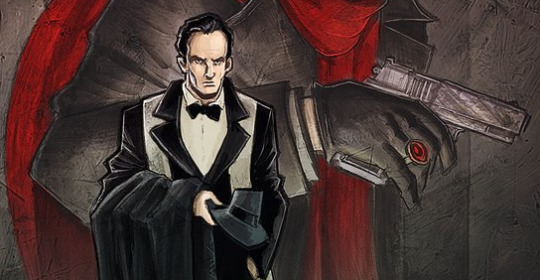
It’s also interesting to consider how Lamont Cranston has basically become the true name of The Shadow in pop culture. Often times it’s the name people use when they specifically want to reference The Shadow, the supposed “Ghost of Gay Street” hauntings in Gibson’s former apartment took the form of Lamont Cranston, and even in the stories, more and more people became aware of it as the years went by (which also helps reinforce the idea that the “real” Cranston eventually took to acting as a fill-in for The Shadow, to draw attention away from the real Shadow’s operations), and Gibson even mentioned a few times that Cranston was The Shadow’s “favorite” identity along with Arnaud. Which is kinda fascinating to think about and does hint at some weird underlying aspects of The Shadow’s psyche, that his favorite identity is one not his own.
And at last, there’s these passages from The Whispering Eyes, a book that does not mention Allard once, and the very last Shadow novel:
From beneath the seat he was taking his black garb. Cloaked and hatted as he stepped from the cab, Cranston merged immediately with the darkness. He had become The Shadow.
Cranston's switch to his other self could well be attributed to a hypnotic mood. The mental lapses produced through hypnosis were the sort that would often cause a subject to revert to habit. Now, as The Shadow, Cranston was still in what might be termed a haphazard mood. He was skirting through darkness, pausing, changing direction, behaving generally as though avoiding something that did not exist.
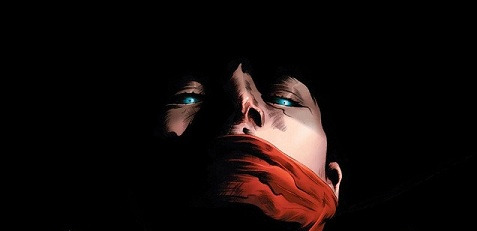
Lang had flung away his glasses; his eyes now showed the shining, hypnotic force that the lenses normally softened. He recognized the eyes that met his above a leveled gun muzzle.
The Shadow's eyes, yet strangely Cranston's, for this was one time The Shadow did not care to disguise them.
Which begs the question: Did Cranston succeed in fully becoming The Shadow? Or did The Shadow succeed in fully becoming Cranston?
23 notes
·
View notes
Link
https://ift.tt/2TIg6iM A NATIVE NEW YORKER, Victor LaValle has been publishing startling and incisive works that feature people of color since his 1999 debut short story collection, Slapboxing with Jesus. His books tackle mental illness, poverty, and parenthood in a variety of genres. LaValle’s most recent publications, the H. P. Lovecraft–inspired novella The Ballad of Black Tom and the American Book Award–winning novel The Changeling, are being developed for the small screen by AMC and FX respectively. In 2017, LaValle created a modern-day Frankenstein story for BOOM! Studios in the form of a graphic novel that has achieved critical and popular acclaim. His exploration of horror, starting with his 2012 novel, The Devil in Silver, pays homage to the genre that first inspired LaValle to write. Though his work has transitioned from the so-called literary to the realm of horror, it still remains lyrical and complex. There’s also been a marked tempo shift, a preference for the slow burn. And yet, perhaps because of his work in genre fiction, LaValle remains an underappreciated sculptor of compelling narratives. We spoke over Skype twice. ¤ AYIZE JAMA-EVERETT: It’s funny. I’ve been writing for years, but I’m just now getting into what it’s like to do literary writing as opposed to genre writing. VICTOR LAVALLE: What made you think about them as distinct things? I think early on I just wanted to get published. But, then in trying to make a career out of this — which seems insane — I know literary authors tend to get better advances than most genre writers … That’s funny because I’m coming at it from the literary side. We don’t know what the comparisons are. We used to talk about science fiction, mystery, thriller, and romance as the four genres that people read. One of our things — that we acknowledged as literary fiction writers — was that if we were really serious no one would ever read us. That was sort of the mantra, at least for some of us. Your badge of honor. Yes, that’s right, and also to make peace with it. You’re going out into the world knowing the thing you’re doing just ain’t going to give you a cushy life. We might joke that we’d sell books to our friends from workshop, but that was it. So some of us would talk about genre writing like, “If we could just figure out a plot that would have people wondering what came next instead of the beauty of the sentence, we’d really get paid.” [Laughs.] Interesting. And so from our perspective, speaking again from basic anecdotal MFA experience, the narrative-focused writers, seemed to be the ones who have people reading them. Walter Mosley talks about that. I’ve heard him say there are a lot of literary cats out there, but people read my work. That’s right. But then, what’s this whole literary fascination with ambiguity, which sometimes seems like it goes against the very nature of engagement with the reader? I think that in almost every genre, including literary realism, you can detect a point of view. A writer’s point of view, and what that writer imagines the reader’s point of view will be. There’s a great deal being communicated about the writer’s expectations, and assumptions. Totally. And so I do think, again speaking very broadly, that literary realism is largely the story of middle-class life. Some common life events occur, but others often do not. You’re talking about individual, life-changing events, like an illness or a divorce to name the top two clichés, but you’re not necessarily talking about war or life in the bottom 20 percent where the whole bottom could fall out of a society and you could all be drawn down into the whirlpool. There are instances of such things in literary fiction, of course, but they’re less likely. This becomes a signal about the writer’s point of view, and what that writer’s imagined reader will find relatable. The joke about The New Yorker: without cancer, divorce, and the suburbs, The New Yorker would have nothing to publish. I think that’s, like, 75 percent true. And then there’re the outliers like Karen Russell, who writes super weird fantastical stuff, and Zadie Smith sometimes publishes the occasional less fantastical piece. Chimamanda [Ngozi Adichie] and Edwidge [Danticat] are regulars in their pages, and they’ve got a different beat. So there’s an outlier wing of the magazine, but it’s about 20 percent. I don’t have any position on this, but it feels like that construction is — you called it middle class, but I want to race it. In the United States, it feels very white. When I read literature from Africa, even from the Caribbean, the concerns are different, and as a result I feel like the stylistic approach is different. There is more of a call for something to happen. It doesn’t seem so interested in maintaining this mythical status quo. I think that white and middle class would be the definite, clearest signifiers, broadly speaking, of that literary realist tradition in the United States. But in more recent years I’ve been making friends with folks in the horror genre. And horror, fantasy, science fiction, romance, every genre, really, is still pretty white and, often, middle class. It’s not a trait of literary fiction alone, that’s all I mean. That’s not to defend The New Yorker, but to indict everyone else too. Let’s make it a class action suit against the monolithic nature of whiteness in publishing. You were being interviewed about your first book and you spoke about writing in resistance to misery porn. I believe it was one of your friends who told you, “But yeah, man, we have some good times, too.” Was that you? I can’t claim that I was writing against misery porn back then. In fact, I leaned into it pretty hard. Misery literature as a particular-path-that-is-rewarded in fiction by “minority” writers is a problem I’ve become more aware of as time passes. I was doing it in my first book, but didn’t realize it. My first book was a set of stories about growing up in Queens mostly, and it was just a litany of bad things happening to black and brown kids and their loved ones. Not every story turned toward the grim or the violent or the hopeless, but a hell of a lot of them did. And then it took an old friend, who I’d hooked up with on Facebook, pointing out those bad things were some of experience but that sure wasn’t all of it. Where was the happiness, the silliness, the dull-ass parts of being working-class folks in Queens? Those parts are just as valid as the misery, and they tend to paint a fuller picture of one’s life, so why didn’t you include them? He didn’t mean it as a smack in the face, but that’s how I felt. Because I knew he was right. And then I had to ask myself what, exactly, I’d been peddling. And why I’d been rewarded for it. Where do you think that inclination came from? Was it fostered in your writing program or in publications? I think many writers are, just by nature, pessimists. A lot of us are misanthropes and sad sacks. As a result, many of us come to believe that a story is only “serious” or “adult” if things don’t go well for people, and then continue to get worse, and then the story ends with some truncated moment of lyrical beauty. Now give me my literary prize. Melancholy is the natural inclination of so many writers, but that doesn’t mean it’s the “truth” of life. Not anymore than optimists who demand that life have meaning and ends happily. It’s all perception. Life itself has no inherent qualities. Consciously or not, I took that on. I thought about my undergraduate program and I thought about which came first, the chicken or the egg. And I have to say that I can’t really blame my MFA. I showed up and said, I’ve got some rough stories for you. I grew up in the ’80s and ’90s and the movies that I saw that had people like me were Beat Street and Juice and Belly, you know, things like that. I love Belly. It’s an underground classic but the beauty of its imagery gets to give balance to the misery of the lives depicted. That’s the thing the written word can’t rely on. If there’s going to be beauty or joy or surprising tenderness, we actually have to write it into the text. But so many of us don’t. And yet you’ve gone more toward horror. I’ve definitely gone more toward horror, but that was embracing the thing that made me love writing as a child — it was horror, being scared. And in my own strange perspective, that is one way I’ve embraced joy. Being scared is a blast, at least for me. It makes me happy. My first two books are literary realism. They have lots of weird wild stuff happening in them, but there’s nothing fantastic or capital-W Weird. But after I’d finished my second book — my first novel — I felt completely drained. I’d mined a great deal of personal material — all the bad stuff — and didn’t want to keep tapping that vein. So I had to bypass the instincts of the 27-year-old who wanted to be taken seriously and rediscover the 10-year-old who simply wanted to devour books. The one whose excitement held as much power as a nuclear reaction. And that child loved vampires and werewolves and ghosts and more. Writing was not making me rich, and it was not making me famous, so it should at least make me happy. Makes sense. The nicest part is that the more I have embraced horror, the more I’ve embraced the joy that comes from horror, the more readers I’ve reached. That was counterintuitive, because I thought I’d be cutting my own throat. Instead that choice gave me new life. One of the things people forget about horror is that it’s not just the fear — it’s people surviving the fear and coming out on the other side of it. Yes. Often. Although there are some times when no one survives, when people don’t make it out and that can be bracing and powerful too. Like a rough massage. You shouldn’t do it to yourself all the time, but once in a while it feels perfect. What were the early horror books that got you excited? Clive Barker, the Books of Blood series, hit me at the right age and I fell hard. Also, he was one of the first people I encountered who actually wrote horror stories that took place in cities. Not exclusively, but it could be kind of tough to find that kind of thing back then. Stephen King was a gateway for sure and his study of the genre, Danse Macabre, helped me discover writers like Richard Matheson, among many others. Shirley Jackson was a foundational writer for me. I can’t overstate how much her stories and novels have meant to me. My mother bought me D’Aulaires’ Book of Greek Myths as a kid, and it remains a favorite. The stories are great, of course, but the illustrations were even better. They border between horror and fantasy, and I couldn’t get enough. What’s the role of myth in your stories? Does it provide structures? Do you find influences in your voice? Definitely with The Ballad of Black Tom there’s a sort of mythos, and even in Big Machine. In The Changeling, there’s an overarching myth that’s present but not fully articulated until about halfway through the story, and even then it’s not fully articulated because the person is just living through it. The Changeling is where I made the most conscious use of fairy tale and myth. Previously, it was certainly there — Big Machine was the beginning of that. Actually, I don’t know if that’s true, because in a way even my first book of stories was me writing the myth about myself. I called them autobiographical at the time, but it’s not entirely true. After all, it’s a parade of pain and disappointment, and that’s not all my childhood consisted of. But there’s the temptation, especially when young, to make yourself seem serious by making yourself seem wretched. I fell victim to that. As time has gone by, book to book, I’m writing a new creation myth for myself. Each book I’ve written has been, in a way, an attempt to figure out who I want to be now. I’m one person at the start of the book and, hopefully, another by the end. I don’t mean that I’m exactly like the character, but that on some essential level I’m mirrored by this person. I want to tell a story, but I also want to work some shit out for myself. Changeling is the most thoughtful about myth and fairy tale, but it was also me trying to write an honest version of myself, both the good and the bad, as father and husband and son, but writing toward that version of Apollo that I could essentially learn from by the end. If I could write him succeeding at becoming a good husband, a good man, then maybe I could become one. Do you find that to be a challenge for you? Being good? Oh, sure. I’m selfish and vain. At times I’m short-tempered with everyone around me; often I’d prefer to be alone. But, I’ve got a wonderful wife, and two wonderful kids. I have friends and co-workers. I’m constantly navigating between my most selfish and vain self and that version of myself that’s selfless and giving. And, is that how you see Apollo? As selfless and giving? No. I see him trying, just trying. Early in the book he thinks he’s succeeding, but he’s deluded himself. He’s got a lot to learn. I hoped other people might identify with that. It’s just a personal thing for me but for some reason, whenever I see a black father with his kids, it just fills me with this sense of joy. I didn’t grow up with my dad or anything, but when I see that scene I think, “Yeah. You know you’re doing something.” And for the kid, I’m thinking, “You don’t know what you’ve got. The longer that guy’s there, the happier you’re going to be overall.” There’s one scene in The Changeling, I think he’s in a basement, and he’s looking through records, and he has the baby on something … On a little blanket. Yes. And, I’m a crate digger. I collect comics and I used to collect vinyl and I’ve been to those swap meets. I’ve been to those yard sales where that dad comes through with the kid and there’s that divided attention: trolling through the garbage to try to find the gold and keeping an eye on the kid at the same time. And I feel like you did that tension so well. You had to have lived it at some point. I still do. I take my son to the comic shop. We go semi-regularly to get my pull list and he comes with me. My daughter’s not quite old enough yet, but he comes with me and he walks the aisles. He walks the length of the new comics, and we have a deal that he can pick one, so he has to look at them, check out the covers, see what looks good to him. If you take it down, let’s look at it together so you don’t rip it. But at the same time I’m like, “Where’s the latest issue of B.P.R.D.? And what’s the new thing to get into? What’s this company do? What’s that company do?” So, that’s the kind of divide. I’m there with my son, but I’m also just a comic-head trolling for the goods. But, to your point about dads. I also didn’t grow up with my dad, and have felt, and assume always will feel, a great deal of pressure to give my son and daughter what I never had. And what a gift that I get to do it. But if I do the job really well they’ll never know what I gave them. The sign that I did it well is that they’ll take it for granted. I lean close to them often and say, “I’ll tell you a secret.” And they roll their eyes and say, in a weary tone, “You love me.” It’s become annoying to them. But, they know. And how amazing is that? Of course, I’m also benefiting from the fact that the bar for good father is so low. Just show up and you’re good. Yeah. The danger in being the dad who does those things is ego. It’s easy to think, “Has there ever been a man as good as me on this earth?” And, to make it worse, the world rewards me for doing the bare minimum. When they were really little I’d walk around with my kids, and people would come up to me and say, “God bless you.” And I’d think, “Yeah, God bless me. I deserve extra blessings from the Lord.” Of course race impacts that as well. And I guess I wonder how your wife deals with that. Does she tell you to get over yourself, or that you can feel that for like 20 minutes and then move on? A slight eyeroll now and then, but really she’s happy for me to receive praise for my parenting. Why not? She thinks I’m a good dad, too. But the nefarious side of all this is that being a “good dad” is easy, being a “good mother” is practically impossible. The par is ridiculously low for the former, impossibly high for the latter. Constant, endless criticism, that’s motherhood. There was a piece in The New Yorker last week that my wife corroborated. Scientists did a study: if a woman goes to the doctor with her partner, her male partner, the doctor will take her complaints more seriously. This is a fact. And it’s awful. So, all of those discrepancies are baked into fatherhood and motherhood too. I think she’s just very tired a lot of the time, because she gets extra layers of criticism. But, it’s not necessarily tension between us. How do you avoid that, given that writers tend to be the worst people to be married to? I’d guess that marriage can be difficult no matter who you’re married to. It’s just the reality of making compromises with another person. There are so many benefits to it as well though. She does nonfiction? She writes fiction and nonfiction. Her last book was nonfiction, but her first book was fiction, a novel, and her next one will be a novel as well. So, the downsides of us both being writers are that we are both moody at times, solitude can be vital to both of us, and we take our projects seriously. But, here’s the nice side: today she and I had lunch before splitting up to do work for the day, and we talked each other through our writing projects. That’s the side of two writers being married that isn’t always talked about. There is a degree of intellectual and artistic back and forth that’s very nurturing. I’d never want to give that up. So, you’re nurturing not only your children, but also your ideas together? Yes. And, having writer friends who are not married to writers is see the other side: the great part is that the non-writer spouse bring something else into the life, into the family, some other interests that aren’t just writing and books. But, the downside can be that they don’t understand what it is to be a writer, and they don’t have a particular care about stories or storytelling, and that can be maddening. Do you believe that? That there are people who don’t care about stories? Definitely, in the technical sense, taking stories apart. If they’re watching a show or reading a book, they don’t want to say, “How could that have been better?” or “This is the moment it all paid off.” As far as they’re concerned, look, that thing is just a show. Why are you taking it apart? Why are you overthinking it? It’s done already. Yeah. It’s just a stupid show. And that would be maddening to me. Even the stupid stuff has been thought through, planned out, and if it’s working on you there’s a reason. McDonald’s thinks quite a bit about how to make you keep eating their french fries. Do you think that writing can be taught? Yes. For example, Ernest Hemingway didn’t go to college. A high school graduate, super well read, but with no writing classes, obviously. But, he was a journalist for years, and he worked under an editor. And that editor pared down the prose, simplified, helped him learn how to communicate his ideas in a way that was better than the original. Essentially, that’s just what a writing class is meant to do. He also sat at the feet of Gertrude Stein, who instructed him as well. They were in her home, but that was a place of instruction. So, to me, writing has been taught forever. Whether working as a journalist or reading the slush pile at an agency or a magazine, that’s all a form of learning writing. Friends who have done that, after they’ve been reading for a month or two, they say that they see the mistakes that people make. They see how people do this, or this, or this, and they say, “I’m not going to do that.” Seeing what doesn’t work. Seeing what doesn’t work and seeing how many people do the same things. And so you think to yourself, “Okay. How am I going to make myself stand out? What’s my angle?” I consider all of those things aspects of teaching writing. What can’t be taught, I think, is personality, a point of view. Teaching writing, as I see it, is no different from teaching painting or teaching sculpture or music. In all those other arts people know you have to take lessons, or if you’re self-taught you have to practice a hell of a lot before you get good. But somehow people think that writing is meant to just come to you. It doesn’t. One way or the other, you’re going to have to apprentice to someone and learn. But, make that choice. Make a choice. Gertrude Stein at her most experimental isn’t just sitting down and writing any word that pops into her head. There’s always a method to it, a structure, some deeper idea. Teaching writing to me means helping the person learn the skills, the craft, that will allow some personality, some point of view, to be communicated. Let me ask you about that other side of communication. When you write, I always think you’re writing to me personally, and I appreciate it. I grew up in Harlem; I was born in 1974. Ah, yes. So, if we weren’t friends then, we could have been. We could have been. So, when you write, do you have an ideal reader in mind, or do you write for yourself? I have this trick. Every single book, I pick a specific person that I’m writing the book for. It’s not someone I’m extremely close to and it’s not a stranger. If they’re too close, then we have a private language, shorthand, that will keep another person out of the story. If it’s a stranger, then I won’t sound like myself because we share no intimacy. So, I pick a person who I’m medium-range intimate with, someone I went to college with that I don’t see anymore, but we’re still in touch on Facebook. A kid I grew up with, someone like that. And I specifically say, “This book is for Aki. This book is for Cameron. This book is for Genene.” When I sit down to write, I am thinking of that person. So, there’s a way that I’m making jokes that sound like jokes I would tell to him or her. I’m describing things that would make sense to that friend. I’m using slang or not using slang that would talk to them. If I’ve done a good enough job, then my hope is anyone who picks up the book will, essentially, be sitting in my friend’s chair and that reader will feel like a friend, too. I came up with this method as a way for me to get around a problem I was having early on: how to sound like a “real” writer. Well, what does a “real” writer mean? Does it mean high lyricism? Does it mean Shirley Jackson? Stephen King? Octavia Butler? The risk is that I’ll only be imitating one of those people and I’ll never sound as good as they do. So, this method of telling the story to a friend was a way to trick me out of my own insecurity, vanity, and hero worship. And to find your own voice, it sounds like. And to sound like me. I heard that. Before I knew who you were, I was like, “This dude’s from New York.” I just knew it. “That’s a New York cat. I don’t care what anybody says. That’s a total New York cat.” New York for sure. I can hear this continuity in voice, even in books as different as The Ballad of Black Tom and The Changeling. You’re very assured. You have so much authority — you take these huge chunks of time to set up the plot, but it’s not time that’s wasted. It’s time getting to know your main characters intimately, and I think you can only do that if you have total assurance in what you’re doing. Well, I’m very happy if it sounds that way in its final iteration. But it takes time to have the confidence to take your time. My earlier books didn’t have that kind of assurance. Instead, they lead with bluster and try to swagger through till the end. I’m very proud of them, but they are definitely snapshots of a young writer. Back then, I had this idea that every sentence had to be a killer. I still have that idea. Nowadays, my idea of what’s a killer sentence has changed. I used to think it has to be like a punch in the face. First sentence kinda thing. The first sentence in a story in my first book, this story called “Slave” that’s about a child prostitute — the first sentence is “Rob eats pussy like a champ.” And I was like, “Yeah! That’s what I’ve got to do!” [Laughs.] I’m still proud of the story; the story goes in interesting directions, but then, nowadays when I see a thing like that, my first thought is, “Come on. What are you trying to prove?” That’s why it’s good that I wrote that story then, because I couldn’t write it now. Right. It would have to come out a different way. I don’t have to do that now. I can say, “Hey. You wanna hear this thing? It’s interesting, but if you want to hear it I’m going to have to go back to like 1862 for just a little while to tell you these things, but I promise you it’s going to mean something to the story I gotta tell you.” That’s a different kinda energy. What’s your rush? We’ve got all night. If I do my job right, you won’t want to get away. I think because you have such a mastery of craft, even that, “Hey, let me tell you this story,” even that’s such a convention that’s used very well, but it’s the confidence with which you present that, it’s the same confidence as “Robby eats pussy like a champ.” It doesn’t have to be so, I don’t want to say vulgar, but it doesn’t have to be so … Vulgar. I think that’s right. I mean, I didn’t write that line because I wanted to be demure. The content doesn’t have to be so arresting, because you have a greater control of the form. And I was thinking about Alfred Bester. Have you ever read his stuff? I know his name, but I haven’t read his stuff. He’s pretty cool. He says the book is the boss, and you’ve got to let the book go where it wants to go, and you just follow along with it. The book is the boss. I like that. Do you agree with that? I would say that, at a certain point, the book is the boss. I don’t know his method of writing and I don’t know yours either. My old way of doing it is that I would just have an opening line, or an opening scene, and I would just write that scene and I would go from there. Go, go, go, go, go. And I would just write everything, everything, everything that came out. And then, at some point, a hundred pages, three hundred pages, whatever it was, I ran out of steam. Then I’d figure the book was done. But that’s not a book, that’s just a bunch of pages. For me, it takes two or three drafts before a real spine, a real idea, a real character became solid. “Okay, this is the territory…” That you’re going to map out. Yeah. And, where I feel the spark of energy and where I feel like I want to explore. And then that shapes the book. So, I would say that the book is eventually the boss, but it first it has to be a book. And not just a catalog of ideas. I’d like to go back to race for a second if that’s okay. Please. So, there used to be this idea that white people don’t read books by black people. Black women don’t read books by black men. Black men don’t read. Yes. These were the assumptions. Probably still are in certain circles. None of that has ever seemed to impact your career or at least the stories that you tell. You tell stories from lots of different vantage points, and I wonder if that has ever impacted you. Anyone editing your stories is like, “This doesn’t seem like a black guy story”? Do you get any of that? Well, I will say two things. We have a storage closet where I keep all of my old papers because our apartment’s not big enough to keep it all here. You’re in New York. It’s New York. And I found, just yesterday, I was looking around at all of the old rejection letters for Slapboxing. My agent sent it around the first time to eight or 10 editors. All of them rejected it, and what was interesting to look at now is that some of them were like, “This isn’t for me,” and with some distance now I respect that because I can appreciate someone who will say, “I’m not even saying that these are bad, I know I’m not the reader for this.” And then there were the folks who were like, “He’s clearly a talented writer, but these stories seem plotless, aimless, and there’s just a lot of atmosphere and place.” And I don’t think that’s wrong, but aren’t you publishing lots of MFA fiction? I’ve seen your list, that’s why we sent the book to you. Lack of plot is what you’re giving me shit for? But then, one of those eight rejections basically said, “These are powerful stories, but they are essentially not as gritty, not as grim as Push, so I can’t buy it.” At the time that the book Push came out by Sapphire. I’ve met Sapphire, did an event with her many years back, and she’s wonderful. I mean from top to bottom, she’s an excellent person and a writer I respect. A wonderful mind. So, this is not about her. But it was the first time that I had felt that thing from the establishment, the “machine.” The idea that there was a “black” story and it could be clearly delineated and, for this editor, it was Push. Now the messed-up part is that if I lacked perspective I might’ve turned my anger toward Sapphire instead of that editor. But I’d taken a few Africana courses as an undergrad and had my coat properly pulled. Sapphire’s success has nothing to do with my rejection except in the mind of this person who rejected my book. And yet, that person’s perspective wasn’t simply a “difference of opinion.” It had real-world effects. Namely, that I didn’t get my stories out in the world, and I didn’t make a little money to help me live as a writer. If enough editors think that way then, effectively, there is only one kind of black story. And if a few years, or decades, reinforce this perspective, then how many other black stories have been silenced or overlooked? The editor who finally bought my collection was a white woman who was super smart, astute, and thankfully did not have those hang-ups. Her thing was all about, “We need to make a sense of structure, some sort of feeling of movement even if there’s not a plot.” And so that helped me, number one, to see that here was this white woman who was willing to take the stories as they were, treat them seriously, not demand that I make them “blacker” or more “miserable” or more redemptive or ask, “Where’s the good white person?” She didn’t ask for any of that, and that was a great gift. She published that book and started my career, and I’ve remained eternally grateful. Then the second great luck of my career happened. I met Chris Jackson. He’s been my editor since my second book — my first novel. He’s a black man who grew up in Harlem, worked as an editor at a religious textbook publisher and is now vice president and executive editor of his own imprint at Random House. My man is a force. But he’s also someone who is familiar with my voice, my context, my history, in a global sense. There were so many things in my books that might’ve been flagged as confusing or unbelievable or not relatable by a different editor. But Chris is quite familiar with the complexity of black life, of all life, and that’s exactly what he encourages in his writers. So when I gave him my novel, Big Machine, he was like, “This is kind of Ishmael Reed and Gayle Jones.” And I’m like, “Exactly. That’s exactly what it is. Plus, the X-Men.” Right. There’s some people for whom the critiques are sometimes not about the work, they’re about not knowing the lineage in which a person is writing. And that’s their critique. It’s not about the work. Yes. It’s just them saying, “I don’t know enough about this.” But, the hard part is that they don’t realize that’s what they’re saying. There’s always the argument about representation, about diversity in who’s published. But what matters just as much is who is at those editorial desk. Who gets it through their transom and says, “I recognize this. I grew up in Alaska. I understand native culture there. I see how this fantasy novel is actually talking about native life in Alaska. And, I see how to make this thing better within that understanding.” But, if you don’t have that person on the editorial side, on the publishing side, it becomes a tougher sell. Even the most well-meaning person can’t understand every canon, can’t understand every experience. And they shouldn’t have to. But if there’s a greater variety of experiences at the publishing house, there’s at least a chance that book will find a person who can understand it. Did you read The Luminous Heart of Jonah S.? Really great book by a Persian-American novelist, Gina Nahai, and it’s the history of a curse on an Iranian Jewish family from pre-Shah times to modern-day L.A. And it’s such a Persian tale. You know the history of every character; every character gets a full history, and it comes back, a hundred pages later through their child or grandchild. It’s not structured like an American novel. And because of that — not just because of that, because of great writing, it’s a brilliant book — I’m thinking more and more about how the writer is one part, but it’s also the community around the writer that supports the book. Changing gears. Why did you choose comics, why did you choose an updated version of Frankenstein? The first independent reading that I did was comics from the spinner rack at the candy store. In a way, I’ve been spending my whole life trying to get back to them. I had to write novels in order to get to write comics. I never read Frankenstein when I was younger. I just read pieces of it here or there, and I watched movies and I read tons of comics that were inspired by it. But in 2014 or so my wife, the writer Emily Raboteau, taught a course on the literature of birth. She included Frankenstein in that syllabus. One night she said, “You think you know the book, but you don’t. You should read the whole thing.” So I read it, truly read it this time, and she was right. It was weirder, and more boring, than I remembered. It was clearly such a work of genius that I came away feeling energized, inspired. The iterations of Frankenstein that have existed follow some paths that make sense and have been wonderful in various ways, but I thought I could see a new way to play with the material. On top of everything else, Frankenstein is definitely a political work by a young woman who had been raised by an incredibly political mother. This was not a person who wrote something fantastical because it seemed like simple fun. She meant to talk seriously about the world she lived in, the times. I wanted to do the same. Why did you choose BOOM! Studios instead of trying to do something with Marvel or DC? I like BOOM!. I like the stuff that they do. They did a fun version of the Santa Claus story with Grant Morrison and Dan Mora. It’s called, simply, Klaus. I like the work they’ve done with creators like Delilah S. Dawson and Cullen Bunn. They’ve done a great comic with Saladin Ahmed called Abbott. That last one came out after my comic, Destroyer, but I mean to say I liked their sensibilities. Also, I wanted to own this idea and this property, and with Marvel and DC, you don’t have that option. That makes sense. Just tangentially. One of the things that I find fascinating with Frankenstein is that she wrote it while she was taking care of her infant son who would later die. God, yes. She found him in the crib. Yes, and it adds this extra layer of tragedy to the whole narrative. This woman writing a story about this man creating a child by putting together the pieces of the dead while her own child has died. It kills me. And her mother died giving birth to her. Right. So, she was definitely a person who was acquainted with death and also the desire to cross the boundary between the living and the dead. She might’ve been young, but she’d already been through more than many experience in a lifetime. What comic books are you reading now that get you hyped, that you want to tell your students, “Ah. You gotta check this out.” I’ve been enjoying a lot of independent comics these last few years: Manifest Destiny, Southern Bastards, Infidel, and The Wilds. Evan Narcisse’s recent run on Black Panther. My boy Mat Johson’s Incognegro. Paper Girls by Brian Vaughan. I enjoy Tom King on Batman. There’s Warren Ellis’s Injection that I think is amazing. I like Kelly Sue DeConnick’s Bitch Planet. Gabby Rivera had a fun run with America — I wish it hadn’t ended. And Shade, the Changing Girl. What are the differences in writing a novel, writing a novella, and writing a comic? You can write comics where people just talk and talk and talk and talk and you can write so that every panel is just talking. But as someone who reads comics, frankly, I hate when I open one and see 40 panels of dialogue bubbles. I put those down, because I feel that’s a writer who doesn’t understand that the words aren’t as important as the image. I’m a prose writer, I live and die by the word, but images are simply the most important part of a comic book. You read Alan Moore’s scripts From Hell and you see how much description goes into what should be in the panel. Oh my God. It’s insane. It’s insane, but it’s worth pointing out that the amount of dialogue doesn’t match the amount of description in the script. He goes on so long so the artist knows what to put inside the panel, but the characters themselves don’t need to be as long-winded. I feel this is related to the critique of literary fiction versus genre. There has to be some impetus in genre to keep the plot going. You can’t really have two people sitting at a cafe talking about whether or not to have an abortion, you know, as you could with somebody like Hemingway. That’s probably true, but I would also point out that in Lord of the Rings no one ever shuts up. They talk and talk and talk and sing and so on, and no one is doing a damn thing. I’m looking at you fucking Tom Bombadil. That said, rather than thinking of plot or action, think of visual storytelling instead. Paying attention to what people are doing, where they’re located, this kind of thing is vital to any good story. It sounds simple, and it is. So simple that most writers, in any genre, forget to pay attention to it. But those things aren’t simply about moving characters around, but about communicating something essential about each character through the actions they take. Salinger, to use a very old example, could do more with two characters smoking cigarettes than most of us do with a whole novel’s worth of story. So then there’s a lot of crossover, there’s a lot of similarity with visual storytelling. There’s no difference, if you look at it schematically. Really good literature, really good genre fiction, whatever you want to call these things, they might use different story elements, but the actual structure, the craft, is all the same. Do you think that’s the common understanding of storytelling, or do you think you’re unique in that approach? I wouldn’t say unique, but I don’t think that’s the common take. I’m thinking about the literary/genre divide here. There are a lot of people who only read one thing or another. They are well read within the genre they prefer — historical fiction, literary realism, zombie novels, but they’ve got very little experience outside of that narrow vein. And yet, almost all of us hold strong opinions about genre that we have hardly encountered at all. We swear we know what’s good or bad, when really we only know what we’re used to. Did you ever read Hellblazer? There’s a Garth Ennis issue where it’s just classic, beautiful, literary horror, where he doesn’t show it, but there’s this constant threat of a priest who is a weirdo. And then, off panel, he says, “And then the priest took out two pencils and shoved them in his eyeballs and headbutted the pew in front of him.” And I threw the comic away because, it literally shocked me, disturbed me. And it’s one of those things with comics; you can only do these things with comics. All the visual horror earlier of this priest set you up to see this guy do something horrific. And then to not see it made it even worse. Right. It is maybe a cliché of the genre but it’s usually better to keep the worst horrors just outside the panel, just off screen. How do you start a project? I used to start with a great first sentence. If it sounded like a gunshot going off, felt like a slap in the reader’s face, then I knew I was ready to begin something. Right. These days I see that tendency as a sign of my ambition but also my insecurity. I wanted to show my swagger right from the first words. But I was also deathly afraid that you wouldn’t keep reading unless I made a lot of noise. That can be effective when you’re 27, but when you’re 46 it’s just … kind of sad. You can’t be a bad boy of literature once you hit middle age. So these days my process is less about having the killer opener, and more about creating a story that will, in its entirety, affect the reader deeply. I use a book called The Anatomy of Story by John Truby as a reliable way to think about the many different aspects of a story I need to know and understand before I write. I work faster and smarter these days. My younger self would be impressed. Who’s your team? Who looks at your work before it’s polished or before it’s done? It’s my wife, Emily Raboteau. Then my best friend, Mat Johnson, my agents (Gloria Loomis and Julia Masnik), and then my editor (Chris Jackson). Those five people. I don’t tend to show it to any of them until I think it’s done. Like I mean, it’s ready to be published. And then I brace myself because it is never ready to be published. It’s only as good as I could make it on my own. That’s why I need, and cherish, every single one of them. They make my books better than I could have done on my own. I find it very interesting when authors know their stories are not working. And I guess I wonder if you have a metric, or if it’s other people’s reads on it, your team’s reads. There are plenty of times when it’s obvious to me that a scene, or a chapter, or a character, isn’t working. By that I mean they’re unconvincing. It doesn’t matter if we’re on Mars or in Montana, I simply don’t believe these characters in their actions, thoughts, or dialogue. That’s the easiest to deal with, in a way, because if I can see it’s false then I know other readers will, too. The harder part is when my readers can see the problems, but I can’t. Of course, in the end, the book is mine and I have to feel right about all the choices within it. But if readers I trust are telling me there’s a problem, then I’ve learned to listen to the critique rather than always taking their solutions. They’re telling me they’ve sensed a weak spot, but their ideas of how to fix it seem off to me. When I was younger, I might assume this meant I should just keep it the way I originally had it. Better my own flawed choices than someone else’s incorrect solutions. But now I see that they’re telling something true — this part isn’t working — and it’s not their responsibility to also tell me how to repair the issue. I go off with the pages for a while and usually, with a few days of thinking, some third option will come to me. Even if it’s not perfect, it’s usually better than what I had originally. You said Chris Jackson has been your editor for a while, now. Five out of seven of my books. How did you establish that relationship? He was the only person who wanted my second book. The rest of the world said, “Meh.” Part of this goes back to our conversation about the importance of having people on both sides of the desk, people who understand you on both sides of the desk. Chris Jackson is a black male editor. There aren’t too many of those, not in big or small publishing. So when he read the manuscript, he saw the story of a black weirdo, a black weirdo kid who is just breaking down and falling apart. And he said, “I’ve been a black weirdo kid. I can do something with this.” And my gift and curse was that most of the people who the book went to had never been a black weird kid, and had never even known a black weird kid. And so they couldn’t empathize with in a way that, say, generations of white women can understand, and mytholgize, say, Sylvia Plath, just to be specific … Yeah. They can understand the dilemma that Plath’s in and when they find books that in some way echo that experience, they go, “Oh. It’s just like The Bell Jar. That was so formative to me. I want to publish this so that it will be formative to other young women like me.” And thank god for that. That kind of continuity is vital. But if the only people in your office identify primarily with The Bell Jar, then what are you going to be publish? Lucky for me, Chris gets it. And he’s at Little, Brown now, right? No. So, he started his own imprint under Random House. One World. He’s had a really good run. Ta-Nehisi Coates, Michelle Alexander, Eddie Huang. Go to the One World website, it’s a squad. You’ve come up as Afrofuturism has been gaining steam. And yet, I don’t hear your voice in that conversation, and I wonder how you feel about that. Is that your experience, do you know why it is? I think it hasn’t come up terribly much because I don’t write Afrofuturism. I write horror. Afro-horror, is that a thing? Because I’d gladly join that crew. I just never read sci-fi or fantasy as a kid. I found sci-fi too optimistic and fantasy too, capital-R Romantic. Sci-fi, to speak way too broadly maybe, presumes that human beings will live on into the future and do things. Good or bad, humans are usually there. I’m skeptical that we will be and always have been. And fantasy seems to find a misty, storied past to be worth living in. But whenever I read books that are set in a quasi-European or North American past, I know exactly how people like me would be living. We’d be fucking orcs, if we were in the books at all. So fuck that, and fuck them. Though I admit I have been dipping into fantasy much more in recent years as folks like Maurice Broaddus and N. K. Jemisin and so many others are making their presence felt. Like, I can’t wait to unwrap Marlon James’s new novel, too. An African Lord of the Rings? Yes, please. Can I push back just a little bit? I do think Afrofuturism is a weird umbrella term that isn’t accurate; Tananarive Due is a total Afrofuturist, but all of her stuff is horror. And none of it is all that positive. And Octavia Butler: all of her projections into the future around black people generally tend to be linked in some shape or form with a new form of slavery. There’s a biological form of slavery, or a psychic form of slavery, and the polemic is, “How much are the people participating in their own slavery and how much are the struggling to get out of it?” You know what I mean? Right. So for me, Afrofuturism has very little to do with sci-fi. It’s not spaceships and faster-than-light drive, but the same themes that we’re dealing with in the present day, in the past, projected into the future. And that’s why I was putting you into that box a little bit because I see you in that. Well then I’d love to be included, if that’s the definition. For a number of years now I have been saying that I write horror, and I still embrace the term. I feel purposeful in saying this. As a result, if there is any crew of black writers who I find myself blending with they’re usually black horror folks. Tananarive Due is absolutely one them. Also, Chesya Burke, Wrath James White, Linda Addison, who has been great for a long time. But maybe none of us all fall into one category alone. It’s almost like, whoever’s making the list determines who’s Afrofuturist, who’s black horror, who’s black sci-fi, and so on. I also wonder how useful those lists are. The best use of those lists is if they can introduce readers to someone new. You love Octavia Butler? How about Nnedi Okorafor? Or you might try Justina Ireland. Tade Thompson. The danger is just for anyone to think, “I’ve written the definitive list.” Without fail, people will be making lists of their interesting but still limited reading. Right. Which is a problem that we all have. So. It would be better to choose 10 great Afrofuturists knowing that if you’re just sticking to 10, you’ve already made this list way too small. But there’s no pretense of being complete, or definitive. There are always more great books, great writers. And that’s a beautiful thing. Right. Just say that and that’d be fine. Even at this point I’d say you’re not allowed to say Octavia Butler. She’s elevated to a form where she’s just taken for granted. You’ve read her, so now what? Just like with black essayists. You can’t keep saying Baldwin … ¤ Ayize Jama-Everett is the author of the novels The Liminal People, The Liminal War, and The Entropy of Bones, and of the graphic novel Box of Bones. Originally from New York, he now calls the Bay Area his home. The post The Craft Is All the Same: A Conversation with Victor LaValle appeared first on Los Angeles Review of Books. from Los Angeles Review of Books https://ift.tt/2r2ctr2
0 notes
Link
A NATIVE NEW YORKER, Victor LaValle has been publishing startling and incisive works that feature people of color since his 1999 debut short story collection, Slapboxing with Jesus. His books tackle mental illness, poverty, and parenthood in a variety of genres. LaValle’s most recent publications, the H. P. Lovecraft–inspired novella The Ballad of Black Tom and the American Book Award–winning novel The Changeling, are being developed for the small screen by AMC and FX respectively. In 2017, LaValle created a modern-day Frankenstein story for BOOM! Studios in the form of a graphic novel that has achieved critical and popular acclaim. His exploration of horror, starting with his 2012 novel, The Devil in Silver, pays homage to the genre that first inspired LaValle to write. Though his work has transitioned from the so-called literary to the realm of horror, it still remains lyrical and complex. There’s also been a marked tempo shift, a preference for the slow burn. And yet, perhaps because of his work in genre fiction, LaValle remains an underappreciated sculptor of compelling narratives. We spoke over Skype twice.
¤
AYIZE JAMA-EVERETT: It’s funny. I’ve been writing for years, but I’m just now getting into what it’s like to do literary writing as opposed to genre writing.
VICTOR LAVALLE: What made you think about them as distinct things?
I think early on I just wanted to get published. But, then in trying to make a career out of this — which seems insane — I know literary authors tend to get better advances than most genre writers …
That’s funny because I’m coming at it from the literary side. We don’t know what the comparisons are. We used to talk about science fiction, mystery, thriller, and romance as the four genres that people read. One of our things — that we acknowledged as literary fiction writers — was that if we were really serious no one would ever read us. That was sort of the mantra, at least for some of us.
Your badge of honor.
Yes, that’s right, and also to make peace with it. You’re going out into the world knowing the thing you’re doing just ain’t going to give you a cushy life. We might joke that we’d sell books to our friends from workshop, but that was it. So some of us would talk about genre writing like, “If we could just figure out a plot that would have people wondering what came next instead of the beauty of the sentence, we’d really get paid.”
[Laughs.] Interesting.
And so from our perspective, speaking again from basic anecdotal MFA experience, the narrative-focused writers, seemed to be the ones who have people reading them.
Walter Mosley talks about that. I’ve heard him say there are a lot of literary cats out there, but people read my work.
That’s right.
But then, what’s this whole literary fascination with ambiguity, which sometimes seems like it goes against the very nature of engagement with the reader?
I think that in almost every genre, including literary realism, you can detect a point of view. A writer’s point of view, and what that writer imagines the reader’s point of view will be. There’s a great deal being communicated about the writer’s expectations, and assumptions.
Totally.
And so I do think, again speaking very broadly, that literary realism is largely the story of middle-class life. Some common life events occur, but others often do not. You’re talking about individual, life-changing events, like an illness or a divorce to name the top two clichés, but you’re not necessarily talking about war or life in the bottom 20 percent where the whole bottom could fall out of a society and you could all be drawn down into the whirlpool. There are instances of such things in literary fiction, of course, but they’re less likely. This becomes a signal about the writer’s point of view, and what that writer’s imagined reader will find relatable.
The joke about The New Yorker: without cancer, divorce, and the suburbs, The New Yorker would have nothing to publish.
I think that’s, like, 75 percent true. And then there’re the outliers like Karen Russell, who writes super weird fantastical stuff, and Zadie Smith sometimes publishes the occasional less fantastical piece. Chimamanda [Ngozi Adichie] and Edwidge [Danticat] are regulars in their pages, and they’ve got a different beat. So there’s an outlier wing of the magazine, but it’s about 20 percent.
I don’t have any position on this, but it feels like that construction is — you called it middle class, but I want to race it. In the United States, it feels very white. When I read literature from Africa, even from the Caribbean, the concerns are different, and as a result I feel like the stylistic approach is different. There is more of a call for something to happen. It doesn’t seem so interested in maintaining this mythical status quo.
I think that white and middle class would be the definite, clearest signifiers, broadly speaking, of that literary realist tradition in the United States. But in more recent years I’ve been making friends with folks in the horror genre. And horror, fantasy, science fiction, romance, every genre, really, is still pretty white and, often, middle class. It’s not a trait of literary fiction alone, that’s all I mean. That’s not to defend The New Yorker, but to indict everyone else too. Let’s make it a class action suit against the monolithic nature of whiteness in publishing.
You were being interviewed about your first book and you spoke about writing in resistance to misery porn. I believe it was one of your friends who told you, “But yeah, man, we have some good times, too.” Was that you?
I can’t claim that I was writing against misery porn back then. In fact, I leaned into it pretty hard. Misery literature as a particular-path-that-is-rewarded in fiction by “minority” writers is a problem I’ve become more aware of as time passes. I was doing it in my first book, but didn’t realize it.
My first book was a set of stories about growing up in Queens mostly, and it was just a litany of bad things happening to black and brown kids and their loved ones. Not every story turned toward the grim or the violent or the hopeless, but a hell of a lot of them did. And then it took an old friend, who I’d hooked up with on Facebook, pointing out those bad things were some of experience but that sure wasn’t all of it. Where was the happiness, the silliness, the dull-ass parts of being working-class folks in Queens? Those parts are just as valid as the misery, and they tend to paint a fuller picture of one’s life, so why didn’t you include them? He didn’t mean it as a smack in the face, but that’s how I felt. Because I knew he was right. And then I had to ask myself what, exactly, I’d been peddling. And why I’d been rewarded for it.
Where do you think that inclination came from? Was it fostered in your writing program or in publications?
I think many writers are, just by nature, pessimists. A lot of us are misanthropes and sad sacks. As a result, many of us come to believe that a story is only “serious” or “adult” if things don’t go well for people, and then continue to get worse, and then the story ends with some truncated moment of lyrical beauty. Now give me my literary prize. Melancholy is the natural inclination of so many writers, but that doesn’t mean it’s the “truth” of life. Not anymore than optimists who demand that life have meaning and ends happily. It’s all perception. Life itself has no inherent qualities.
Consciously or not, I took that on. I thought about my undergraduate program and I thought about which came first, the chicken or the egg. And I have to say that I can’t really blame my MFA. I showed up and said, I’ve got some rough stories for you. I grew up in the ’80s and ’90s and the movies that I saw that had people like me were Beat Street and Juice and Belly, you know, things like that.
I love Belly.
It’s an underground classic but the beauty of its imagery gets to give balance to the misery of the lives depicted. That’s the thing the written word can’t rely on. If there’s going to be beauty or joy or surprising tenderness, we actually have to write it into the text. But so many of us don’t.
And yet you’ve gone more toward horror.
I’ve definitely gone more toward horror, but that was embracing the thing that made me love writing as a child — it was horror, being scared. And in my own strange perspective, that is one way I’ve embraced joy. Being scared is a blast, at least for me. It makes me happy.
My first two books are literary realism. They have lots of weird wild stuff happening in them, but there’s nothing fantastic or capital-W Weird. But after I’d finished my second book — my first novel — I felt completely drained. I’d mined a great deal of personal material — all the bad stuff — and didn’t want to keep tapping that vein. So I had to bypass the instincts of the 27-year-old who wanted to be taken seriously and rediscover the 10-year-old who simply wanted to devour books. The one whose excitement held as much power as a nuclear reaction. And that child loved vampires and werewolves and ghosts and more. Writing was not making me rich, and it was not making me famous, so it should at least make me happy.
Makes sense.
The nicest part is that the more I have embraced horror, the more I’ve embraced the joy that comes from horror, the more readers I’ve reached. That was counterintuitive, because I thought I’d be cutting my own throat. Instead that choice gave me new life.
One of the things people forget about horror is that it’s not just the fear — it’s people surviving the fear and coming out on the other side of it.
Yes. Often. Although there are some times when no one survives, when people don’t make it out and that can be bracing and powerful too. Like a rough massage. You shouldn’t do it to yourself all the time, but once in a while it feels perfect.
What were the early horror books that got you excited?
Clive Barker, the Books of Blood series, hit me at the right age and I fell hard. Also, he was one of the first people I encountered who actually wrote horror stories that took place in cities. Not exclusively, but it could be kind of tough to find that kind of thing back then. Stephen King was a gateway for sure and his study of the genre, Danse Macabre, helped me discover writers like Richard Matheson, among many others. Shirley Jackson was a foundational writer for me. I can’t overstate how much her stories and novels have meant to me. My mother bought me D’Aulaires’ Book of Greek Myths as a kid, and it remains a favorite. The stories are great, of course, but the illustrations were even better. They border between horror and fantasy, and I couldn’t get enough.
What’s the role of myth in your stories? Does it provide structures? Do you find influences in your voice? Definitely with The Ballad of Black Tom there’s a sort of mythos, and even in Big Machine. In The Changeling, there’s an overarching myth that’s present but not fully articulated until about halfway through the story, and even then it’s not fully articulated because the person is just living through it.
The Changeling is where I made the most conscious use of fairy tale and myth. Previously, it was certainly there — Big Machine was the beginning of that. Actually, I don’t know if that’s true, because in a way even my first book of stories was me writing the myth about myself. I called them autobiographical at the time, but it’s not entirely true. After all, it’s a parade of pain and disappointment, and that’s not all my childhood consisted of. But there’s the temptation, especially when young, to make yourself seem serious by making yourself seem wretched. I fell victim to that.
As time has gone by, book to book, I’m writing a new creation myth for myself. Each book I’ve written has been, in a way, an attempt to figure out who I want to be now. I’m one person at the start of the book and, hopefully, another by the end. I don’t mean that I’m exactly like the character, but that on some essential level I’m mirrored by this person. I want to tell a story, but I also want to work some shit out for myself. Changeling is the most thoughtful about myth and fairy tale, but it was also me trying to write an honest version of myself, both the good and the bad, as father and husband and son, but writing toward that version of Apollo that I could essentially learn from by the end.
If I could write him succeeding at becoming a good husband, a good man, then maybe I could become one.
Do you find that to be a challenge for you?
Being good? Oh, sure. I’m selfish and vain. At times I’m short-tempered with everyone around me; often I’d prefer to be alone. But, I’ve got a wonderful wife, and two wonderful kids. I have friends and co-workers. I’m constantly navigating between my most selfish and vain self and that version of myself that’s selfless and giving.
And, is that how you see Apollo? As selfless and giving?
No. I see him trying, just trying. Early in the book he thinks he’s succeeding, but he’s deluded himself. He’s got a lot to learn. I hoped other people might identify with that.
It’s just a personal thing for me but for some reason, whenever I see a black father with his kids, it just fills me with this sense of joy. I didn’t grow up with my dad or anything, but when I see that scene I think, “Yeah. You know you’re doing something.” And for the kid, I’m thinking, “You don’t know what you’ve got. The longer that guy’s there, the happier you’re going to be overall.” There’s one scene in The Changeling, I think he’s in a basement, and he’s looking through records, and he has the baby on something …
On a little blanket.
Yes. And, I’m a crate digger. I collect comics and I used to collect vinyl and I’ve been to those swap meets. I’ve been to those yard sales where that dad comes through with the kid and there’s that divided attention: trolling through the garbage to try to find the gold and keeping an eye on the kid at the same time. And I feel like you did that tension so well. You had to have lived it at some point.
I still do. I take my son to the comic shop. We go semi-regularly to get my pull list and he comes with me. My daughter’s not quite old enough yet, but he comes with me and he walks the aisles. He walks the length of the new comics, and we have a deal that he can pick one, so he has to look at them, check out the covers, see what looks good to him. If you take it down, let’s look at it together so you don’t rip it. But at the same time I’m like, “Where’s the latest issue of B.P.R.D.? And what’s the new thing to get into? What’s this company do? What’s that company do?” So, that’s the kind of divide. I’m there with my son, but I’m also just a comic-head trolling for the goods.
But, to your point about dads. I also didn’t grow up with my dad, and have felt, and assume always will feel, a great deal of pressure to give my son and daughter what I never had. And what a gift that I get to do it. But if I do the job really well they’ll never know what I gave them. The sign that I did it well is that they’ll take it for granted. I lean close to them often and say, “I’ll tell you a secret.” And they roll their eyes and say, in a weary tone, “You love me.” It’s become annoying to them. But, they know. And how amazing is that?
Of course, I’m also benefiting from the fact that the bar for good father is so low.
Just show up and you’re good.
Yeah. The danger in being the dad who does those things is ego. It’s easy to think, “Has there ever been a man as good as me on this earth?” And, to make it worse, the world rewards me for doing the bare minimum. When they were really little I’d walk around with my kids, and people would come up to me and say, “God bless you.” And I’d think, “Yeah, God bless me. I deserve extra blessings from the Lord.”
Of course race impacts that as well. And I guess I wonder how your wife deals with that. Does she tell you to get over yourself, or that you can feel that for like 20 minutes and then move on?
A slight eyeroll now and then, but really she’s happy for me to receive praise for my parenting. Why not? She thinks I’m a good dad, too. But the nefarious side of all this is that being a “good dad” is easy, being a “good mother” is practically impossible. The par is ridiculously low for the former, impossibly high for the latter.
Constant, endless criticism, that’s motherhood. There was a piece in The New Yorker last week that my wife corroborated. Scientists did a study: if a woman goes to the doctor with her partner, her male partner, the doctor will take her complaints more seriously. This is a fact. And it’s awful. So, all of those discrepancies are baked into fatherhood and motherhood too. I think she’s just very tired a lot of the time, because she gets extra layers of criticism. But, it’s not necessarily tension between us.
How do you avoid that, given that writers tend to be the worst people to be married to?
I’d guess that marriage can be difficult no matter who you’re married to. It’s just the reality of making compromises with another person. There are so many benefits to it as well though.
She does nonfiction?
She writes fiction and nonfiction. Her last book was nonfiction, but her first book was fiction, a novel, and her next one will be a novel as well. So, the downsides of us both being writers are that we are both moody at times, solitude can be vital to both of us, and we take our projects seriously. But, here’s the nice side: today she and I had lunch before splitting up to do work for the day, and we talked each other through our writing projects. That’s the side of two writers being married that isn’t always talked about. There is a degree of intellectual and artistic back and forth that’s very nurturing. I’d never want to give that up.
So, you’re nurturing not only your children, but also your ideas together?
Yes. And, having writer friends who are not married to writers is see the other side: the great part is that the non-writer spouse bring something else into the life, into the family, some other interests that aren’t just writing and books. But, the downside can be that they don’t understand what it is to be a writer, and they don’t have a particular care about stories or storytelling, and that can be maddening.
Do you believe that? That there are people who don’t care about stories?
Definitely, in the technical sense, taking stories apart. If they’re watching a show or reading a book, they don’t want to say, “How could that have been better?” or “This is the moment it all paid off.” As far as they’re concerned, look, that thing is just a show. Why are you taking it apart? Why are you overthinking it?
It’s done already.
Yeah. It’s just a stupid show. And that would be maddening to me. Even the stupid stuff has been thought through, planned out, and if it’s working on you there’s a reason. McDonald’s thinks quite a bit about how to make you keep eating their french fries.
Do you think that writing can be taught?
Yes. For example, Ernest Hemingway didn’t go to college. A high school graduate, super well read, but with no writing classes, obviously. But, he was a journalist for years, and he worked under an editor. And that editor pared down the prose, simplified, helped him learn how to communicate his ideas in a way that was better than the original. Essentially, that’s just what a writing class is meant to do. He also sat at the feet of Gertrude Stein, who instructed him as well. They were in her home, but that was a place of instruction. So, to me, writing has been taught forever. Whether working as a journalist or reading the slush pile at an agency or a magazine, that’s all a form of learning writing. Friends who have done that, after they’ve been reading for a month or two, they say that they see the mistakes that people make. They see how people do this, or this, or this, and they say, “I’m not going to do that.”
Seeing what doesn’t work.
Seeing what doesn’t work and seeing how many people do the same things. And so you think to yourself, “Okay. How am I going to make myself stand out? What’s my angle?” I consider all of those things aspects of teaching writing. What can’t be taught, I think, is personality, a point of view. Teaching writing, as I see it, is no different from teaching painting or teaching sculpture or music. In all those other arts people know you have to take lessons, or if you’re self-taught you have to practice a hell of a lot before you get good. But somehow people think that writing is meant to just come to you. It doesn’t. One way or the other, you’re going to have to apprentice to someone and learn.
But, make that choice.
Make a choice. Gertrude Stein at her most experimental isn’t just sitting down and writing any word that pops into her head. There’s always a method to it, a structure, some deeper idea. Teaching writing to me means helping the person learn the skills, the craft, that will allow some personality, some point of view, to be communicated.
Let me ask you about that other side of communication. When you write, I always think you’re writing to me personally, and I appreciate it. I grew up in Harlem; I was born in 1974.
Ah, yes. So, if we weren’t friends then, we could have been.
We could have been. So, when you write, do you have an ideal reader in mind, or do you write for yourself?
I have this trick. Every single book, I pick a specific person that I’m writing the book for. It’s not someone I’m extremely close to and it’s not a stranger. If they’re too close, then we have a private language, shorthand, that will keep another person out of the story. If it’s a stranger, then I won’t sound like myself because we share no intimacy. So, I pick a person who I’m medium-range intimate with, someone I went to college with that I don’t see anymore, but we’re still in touch on Facebook. A kid I grew up with, someone like that. And I specifically say, “This book is for Aki. This book is for Cameron. This book is for Genene.” When I sit down to write, I am thinking of that person. So, there’s a way that I’m making jokes that sound like jokes I would tell to him or her. I’m describing things that would make sense to that friend. I’m using slang or not using slang that would talk to them. If I’ve done a good enough job, then my hope is anyone who picks up the book will, essentially, be sitting in my friend’s chair and that reader will feel like a friend, too.
I came up with this method as a way for me to get around a problem I was having early on: how to sound like a “real” writer. Well, what does a “real” writer mean? Does it mean high lyricism? Does it mean Shirley Jackson? Stephen King? Octavia Butler? The risk is that I’ll only be imitating one of those people and I’ll never sound as good as they do. So, this method of telling the story to a friend was a way to trick me out of my own insecurity, vanity, and hero worship.
And to find your own voice, it sounds like.
And to sound like me.
I heard that. Before I knew who you were, I was like, “This dude’s from New York.” I just knew it. “That’s a New York cat. I don’t care what anybody says. That’s a total New York cat.”
New York for sure.
I can hear this continuity in voice, even in books as different as The Ballad of Black Tom and The Changeling. You’re very assured. You have so much authority — you take these huge chunks of time to set up the plot, but it’s not time that’s wasted. It’s time getting to know your main characters intimately, and I think you can only do that if you have total assurance in what you’re doing.
Well, I’m very happy if it sounds that way in its final iteration. But it takes time to have the confidence to take your time. My earlier books didn’t have that kind of assurance. Instead, they lead with bluster and try to swagger through till the end. I’m very proud of them, but they are definitely snapshots of a young writer. Back then, I had this idea that every sentence had to be a killer.
I still have that idea.
Nowadays, my idea of what’s a killer sentence has changed. I used to think it has to be like a punch in the face. First sentence kinda thing. The first sentence in a story in my first book, this story called “Slave” that’s about a child prostitute — the first sentence is “Rob eats pussy like a champ.” And I was like, “Yeah! That’s what I’ve got to do!”
[Laughs.]
I’m still proud of the story; the story goes in interesting directions, but then, nowadays when I see a thing like that, my first thought is, “Come on. What are you trying to prove?” That’s why it’s good that I wrote that story then, because I couldn’t write it now.
Right.
It would have to come out a different way. I don’t have to do that now. I can say, “Hey. You wanna hear this thing? It’s interesting, but if you want to hear it I’m going to have to go back to like 1862 for just a little while to tell you these things, but I promise you it’s going to mean something to the story I gotta tell you.” That’s a different kinda energy. What’s your rush? We’ve got all night. If I do my job right, you won’t want to get away.
I think because you have such a mastery of craft, even that, “Hey, let me tell you this story,” even that’s such a convention that’s used very well, but it’s the confidence with which you present that, it’s the same confidence as “Robby eats pussy like a champ.” It doesn’t have to be so, I don’t want to say vulgar, but it doesn’t have to be so …
Vulgar. I think that’s right. I mean, I didn’t write that line because I wanted to be demure.
The content doesn’t have to be so arresting, because you have a greater control of the form. And I was thinking about Alfred Bester. Have you ever read his stuff?
I know his name, but I haven’t read his stuff.
He’s pretty cool. He says the book is the boss, and you’ve got to let the book go where it wants to go, and you just follow along with it.
The book is the boss. I like that.
Do you agree with that?
I would say that, at a certain point, the book is the boss. I don’t know his method of writing and I don’t know yours either. My old way of doing it is that I would just have an opening line, or an opening scene, and I would just write that scene and I would go from there. Go, go, go, go, go. And I would just write everything, everything, everything that came out. And then, at some point, a hundred pages, three hundred pages, whatever it was, I ran out of steam. Then I’d figure the book was done. But that’s not a book, that’s just a bunch of pages. For me, it takes two or three drafts before a real spine, a real idea, a real character became solid. “Okay, this is the territory…”
That you’re going to map out.
Yeah. And, where I feel the spark of energy and where I feel like I want to explore. And then that shapes the book. So, I would say that the book is eventually the boss, but it first it has to be a book.
And not just a catalog of ideas. I’d like to go back to race for a second if that’s okay.
Please.
So, there used to be this idea that white people don’t read books by black people. Black women don’t read books by black men. Black men don’t read.
Yes. These were the assumptions. Probably still are in certain circles.
None of that has ever seemed to impact your career or at least the stories that you tell. You tell stories from lots of different vantage points, and I wonder if that has ever impacted you. Anyone editing your stories is like, “This doesn’t seem like a black guy story”? Do you get any of that?
Well, I will say two things. We have a storage closet where I keep all of my old papers because our apartment’s not big enough to keep it all here.
You’re in New York.
It’s New York. And I found, just yesterday, I was looking around at all of the old rejection letters for Slapboxing. My agent sent it around the first time to eight or 10 editors. All of them rejected it, and what was interesting to look at now is that some of them were like, “This isn’t for me,” and with some distance now I respect that because I can appreciate someone who will say, “I’m not even saying that these are bad, I know I’m not the reader for this.”
And then there were the folks who were like, “He’s clearly a talented writer, but these stories seem plotless, aimless, and there’s just a lot of atmosphere and place.” And I don’t think that’s wrong, but aren’t you publishing lots of MFA fiction? I’ve seen your list, that’s why we sent the book to you. Lack of plot is what you’re giving me shit for? But then, one of those eight rejections basically said, “These are powerful stories, but they are essentially not as gritty, not as grim as Push, so I can’t buy it.” At the time that the book Push came out by Sapphire.
I’ve met Sapphire, did an event with her many years back, and she’s wonderful. I mean from top to bottom, she’s an excellent person and a writer I respect. A wonderful mind. So, this is not about her.
But it was the first time that I had felt that thing from the establishment, the “machine.” The idea that there was a “black” story and it could be clearly delineated and, for this editor, it was Push. Now the messed-up part is that if I lacked perspective I might’ve turned my anger toward Sapphire instead of that editor. But I’d taken a few Africana courses as an undergrad and had my coat properly pulled. Sapphire’s success has nothing to do with my rejection except in the mind of this person who rejected my book. And yet, that person’s perspective wasn’t simply a “difference of opinion.” It had real-world effects. Namely, that I didn’t get my stories out in the world, and I didn’t make a little money to help me live as a writer. If enough editors think that way then, effectively, there is only one kind of black story. And if a few years, or decades, reinforce this perspective, then how many other black stories have been silenced or overlooked?
The editor who finally bought my collection was a white woman who was super smart, astute, and thankfully did not have those hang-ups. Her thing was all about, “We need to make a sense of structure, some sort of feeling of movement even if there’s not a plot.” And so that helped me, number one, to see that here was this white woman who was willing to take the stories as they were, treat them seriously, not demand that I make them “blacker” or more “miserable” or more redemptive or ask, “Where’s the good white person?” She didn’t ask for any of that, and that was a great gift. She published that book and started my career, and I’ve remained eternally grateful.
Then the second great luck of my career happened. I met Chris Jackson. He’s been my editor since my second book — my first novel. He’s a black man who grew up in Harlem, worked as an editor at a religious textbook publisher and is now vice president and executive editor of his own imprint at Random House. My man is a force.
But he’s also someone who is familiar with my voice, my context, my history, in a global sense. There were so many things in my books that might’ve been flagged as confusing or unbelievable or not relatable by a different editor. But Chris is quite familiar with the complexity of black life, of all life, and that’s exactly what he encourages in his writers. So when I gave him my novel, Big Machine, he was like, “This is kind of Ishmael Reed and Gayle Jones.” And I’m like, “Exactly. That’s exactly what it is. Plus, the X-Men.”
Right. There’s some people for whom the critiques are sometimes not about the work, they’re about not knowing the lineage in which a person is writing. And that’s their critique. It’s not about the work.
Yes. It’s just them saying, “I don’t know enough about this.” But, the hard part is that they don’t realize that’s what they’re saying. There’s always the argument about representation, about diversity in who’s published. But what matters just as much is who is at those editorial desk. Who gets it through their transom and says, “I recognize this. I grew up in Alaska. I understand native culture there. I see how this fantasy novel is actually talking about native life in Alaska. And, I see how to make this thing better within that understanding.”
But, if you don’t have that person on the editorial side, on the publishing side, it becomes a tougher sell. Even the most well-meaning person can’t understand every canon, can’t understand every experience. And they shouldn’t have to. But if there’s a greater variety of experiences at the publishing house, there’s at least a chance that book will find a person who can understand it.
Did you read The Luminous Heart of Jonah S.? Really great book by a Persian-American novelist, Gina Nahai, and it’s the history of a curse on an Iranian Jewish family from pre-Shah times to modern-day L.A. And it’s such a Persian tale. You know the history of every character; every character gets a full history, and it comes back, a hundred pages later through their child or grandchild. It’s not structured like an American novel. And because of that — not just because of that, because of great writing, it’s a brilliant book — I’m thinking more and more about how the writer is one part, but it’s also the community around the writer that supports the book.
Changing gears. Why did you choose comics, why did you choose an updated version of Frankenstein?
The first independent reading that I did was comics from the spinner rack at the candy store. In a way, I’ve been spending my whole life trying to get back to them. I had to write novels in order to get to write comics. I never read Frankenstein when I was younger. I just read pieces of it here or there, and I watched movies and I read tons of comics that were inspired by it.
But in 2014 or so my wife, the writer Emily Raboteau, taught a course on the literature of birth. She included Frankenstein in that syllabus. One night she said, “You think you know the book, but you don’t. You should read the whole thing.” So I read it, truly read it this time, and she was right. It was weirder, and more boring, than I remembered. It was clearly such a work of genius that I came away feeling energized, inspired. The iterations of Frankenstein that have existed follow some paths that make sense and have been wonderful in various ways, but I thought I could see a new way to play with the material.
On top of everything else, Frankenstein is definitely a political work by a young woman who had been raised by an incredibly political mother. This was not a person who wrote something fantastical because it seemed like simple fun. She meant to talk seriously about the world she lived in, the times. I wanted to do the same.
Why did you choose BOOM! Studios instead of trying to do something with Marvel or DC?
I like BOOM!. I like the stuff that they do. They did a fun version of the Santa Claus story with Grant Morrison and Dan Mora. It’s called, simply, Klaus. I like the work they’ve done with creators like Delilah S. Dawson and Cullen Bunn. They’ve done a great comic with Saladin Ahmed called Abbott. That last one came out after my comic, Destroyer, but I mean to say I liked their sensibilities. Also, I wanted to own this idea and this property, and with Marvel and DC, you don’t have that option.
That makes sense. Just tangentially. One of the things that I find fascinating with Frankenstein is that she wrote it while she was taking care of her infant son who would later die.
God, yes. She found him in the crib.
Yes, and it adds this extra layer of tragedy to the whole narrative. This woman writing a story about this man creating a child by putting together the pieces of the dead while her own child has died. It kills me.
And her mother died giving birth to her.
Right.
So, she was definitely a person who was acquainted with death and also the desire to cross the boundary between the living and the dead. She might’ve been young, but she’d already been through more than many experience in a lifetime.
What comic books are you reading now that get you hyped, that you want to tell your students, “Ah. You gotta check this out.”
I’ve been enjoying a lot of independent comics these last few years: Manifest Destiny, Southern Bastards, Infidel, and The Wilds. Evan Narcisse’s recent run on Black Panther. My boy Mat Johson’s Incognegro. Paper Girls by Brian Vaughan. I enjoy Tom King on Batman. There’s Warren Ellis’s Injection that I think is amazing. I like Kelly Sue DeConnick’s Bitch Planet. Gabby Rivera had a fun run with America — I wish it hadn’t ended. And Shade, the Changing Girl.
What are the differences in writing a novel, writing a novella, and writing a comic?
You can write comics where people just talk and talk and talk and talk and you can write so that every panel is just talking. But as someone who reads comics, frankly, I hate when I open one and see 40 panels of dialogue bubbles. I put those down, because I feel that’s a writer who doesn’t understand that the words aren’t as important as the image. I’m a prose writer, I live and die by the word, but images are simply the most important part of a comic book. You read Alan Moore’s scripts From Hell and you see how much description goes into what should be in the panel.
Oh my God. It’s insane.
It’s insane, but it’s worth pointing out that the amount of dialogue doesn’t match the amount of description in the script. He goes on so long so the artist knows what to put inside the panel, but the characters themselves don’t need to be as long-winded.
I feel this is related to the critique of literary fiction versus genre. There has to be some impetus in genre to keep the plot going. You can’t really have two people sitting at a cafe talking about whether or not to have an abortion, you know, as you could with somebody like Hemingway.
That’s probably true, but I would also point out that in Lord of the Rings no one ever shuts up. They talk and talk and talk and sing and so on, and no one is doing a damn thing. I’m looking at you fucking Tom Bombadil.
That said, rather than thinking of plot or action, think of visual storytelling instead. Paying attention to what people are doing, where they’re located, this kind of thing is vital to any good story. It sounds simple, and it is. So simple that most writers, in any genre, forget to pay attention to it. But those things aren’t simply about moving characters around, but about communicating something essential about each character through the actions they take. Salinger, to use a very old example, could do more with two characters smoking cigarettes than most of us do with a whole novel’s worth of story.
So then there’s a lot of crossover, there’s a lot of similarity with visual storytelling.
There’s no difference, if you look at it schematically. Really good literature, really good genre fiction, whatever you want to call these things, they might use different story elements, but the actual structure, the craft, is all the same.
Do you think that’s the common understanding of storytelling, or do you think you’re unique in that approach?
I wouldn’t say unique, but I don’t think that’s the common take. I’m thinking about the literary/genre divide here. There are a lot of people who only read one thing or another. They are well read within the genre they prefer — historical fiction, literary realism, zombie novels, but they’ve got very little experience outside of that narrow vein. And yet, almost all of us hold strong opinions about genre that we have hardly encountered at all. We swear we know what’s good or bad, when really we only know what we’re used to.
Did you ever read Hellblazer? There’s a Garth Ennis issue where it’s just classic, beautiful, literary horror, where he doesn’t show it, but there’s this constant threat of a priest who is a weirdo. And then, off panel, he says, “And then the priest took out two pencils and shoved them in his eyeballs and headbutted the pew in front of him.” And I threw the comic away because, it literally shocked me, disturbed me. And it’s one of those things with comics; you can only do these things with comics. All the visual horror earlier of this priest set you up to see this guy do something horrific. And then to not see it made it even worse.
Right. It is maybe a cliché of the genre but it’s usually better to keep the worst horrors just outside the panel, just off screen.
How do you start a project?
I used to start with a great first sentence. If it sounded like a gunshot going off, felt like a slap in the reader’s face, then I knew I was ready to begin something.
Right.
These days I see that tendency as a sign of my ambition but also my insecurity. I wanted to show my swagger right from the first words. But I was also deathly afraid that you wouldn’t keep reading unless I made a lot of noise. That can be effective when you’re 27, but when you’re 46 it’s just … kind of sad. You can’t be a bad boy of literature once you hit middle age.
So these days my process is less about having the killer opener, and more about creating a story that will, in its entirety, affect the reader deeply. I use a book called The Anatomy of Story by John Truby as a reliable way to think about the many different aspects of a story I need to know and understand before I write. I work faster and smarter these days. My younger self would be impressed.
Who’s your team? Who looks at your work before it’s polished or before it’s done?
It’s my wife, Emily Raboteau. Then my best friend, Mat Johnson, my agents (Gloria Loomis and Julia Masnik), and then my editor (Chris Jackson). Those five people. I don’t tend to show it to any of them until I think it’s done. Like I mean, it’s ready to be published. And then I brace myself because it is never ready to be published. It’s only as good as I could make it on my own. That’s why I need, and cherish, every single one of them. They make my books better than I could have done on my own.
I find it very interesting when authors know their stories are not working. And I guess I wonder if you have a metric, or if it’s other people’s reads on it, your team’s reads.
There are plenty of times when it’s obvious to me that a scene, or a chapter, or a character, isn’t working. By that I mean they’re unconvincing. It doesn’t matter if we’re on Mars or in Montana, I simply don’t believe these characters in their actions, thoughts, or dialogue. That’s the easiest to deal with, in a way, because if I can see it’s false then I know other readers will, too.
The harder part is when my readers can see the problems, but I can’t. Of course, in the end, the book is mine and I have to feel right about all the choices within it. But if readers I trust are telling me there’s a problem, then I’ve learned to listen to the critique rather than always taking their solutions. They’re telling me they’ve sensed a weak spot, but their ideas of how to fix it seem off to me. When I was younger, I might assume this meant I should just keep it the way I originally had it. Better my own flawed choices than someone else’s incorrect solutions. But now I see that they’re telling something true — this part isn’t working — and it’s not their responsibility to also tell me how to repair the issue. I go off with the pages for a while and usually, with a few days of thinking, some third option will come to me. Even if it’s not perfect, it’s usually better than what I had originally.
You said Chris Jackson has been your editor for a while, now.
Five out of seven of my books.
How did you establish that relationship?
He was the only person who wanted my second book. The rest of the world said, “Meh.” Part of this goes back to our conversation about the importance of having people on both sides of the desk, people who understand you on both sides of the desk. Chris Jackson is a black male editor. There aren’t too many of those, not in big or small publishing.
So when he read the manuscript, he saw the story of a black weirdo, a black weirdo kid who is just breaking down and falling apart. And he said, “I’ve been a black weirdo kid. I can do something with this.” And my gift and curse was that most of the people who the book went to had never been a black weird kid, and had never even known a black weird kid. And so they couldn’t empathize with in a way that, say, generations of white women can understand, and mytholgize, say, Sylvia Plath, just to be specific …
Yeah.
They can understand the dilemma that Plath’s in and when they find books that in some way echo that experience, they go, “Oh. It’s just like The Bell Jar. That was so formative to me. I want to publish this so that it will be formative to other young women like me.” And thank god for that. That kind of continuity is vital. But if the only people in your office identify primarily with The Bell Jar, then what are you going to be publish? Lucky for me, Chris gets it.
And he’s at Little, Brown now, right?
No. So, he started his own imprint under Random House. One World. He’s had a really good run. Ta-Nehisi Coates, Michelle Alexander, Eddie Huang. Go to the One World website, it’s a squad.
You’ve come up as Afrofuturism has been gaining steam. And yet, I don’t hear your voice in that conversation, and I wonder how you feel about that. Is that your experience, do you know why it is?
I think it hasn’t come up terribly much because I don’t write Afrofuturism. I write horror. Afro-horror, is that a thing? Because I’d gladly join that crew. I just never read sci-fi or fantasy as a kid. I found sci-fi too optimistic and fantasy too, capital-R Romantic.
Sci-fi, to speak way too broadly maybe, presumes that human beings will live on into the future and do things. Good or bad, humans are usually there. I’m skeptical that we will be and always have been. And fantasy seems to find a misty, storied past to be worth living in. But whenever I read books that are set in a quasi-European or North American past, I know exactly how people like me would be living. We’d be fucking orcs, if we were in the books at all. So fuck that, and fuck them. Though I admit I have been dipping into fantasy much more in recent years as folks like Maurice Broaddus and N. K. Jemisin and so many others are making their presence felt. Like, I can’t wait to unwrap Marlon James’s new novel, too. An African Lord of the Rings? Yes, please.
Can I push back just a little bit? I do think Afrofuturism is a weird umbrella term that isn’t accurate; Tananarive Due is a total Afrofuturist, but all of her stuff is horror. And none of it is all that positive. And Octavia Butler: all of her projections into the future around black people generally tend to be linked in some shape or form with a new form of slavery. There’s a biological form of slavery, or a psychic form of slavery, and the polemic is, “How much are the people participating in their own slavery and how much are the struggling to get out of it?” You know what I mean?
Right.
So for me, Afrofuturism has very little to do with sci-fi. It’s not spaceships and faster-than-light drive, but the same themes that we’re dealing with in the present day, in the past, projected into the future. And that’s why I was putting you into that box a little bit because I see you in that.
Well then I’d love to be included, if that’s the definition. For a number of years now I have been saying that I write horror, and I still embrace the term. I feel purposeful in saying this. As a result, if there is any crew of black writers who I find myself blending with they’re usually black horror folks. Tananarive Due is absolutely one them. Also, Chesya Burke, Wrath James White, Linda Addison, who has been great for a long time. But maybe none of us all fall into one category alone. It’s almost like, whoever’s making the list determines who’s Afrofuturist, who’s black horror, who’s black sci-fi, and so on.
I also wonder how useful those lists are.
The best use of those lists is if they can introduce readers to someone new. You love Octavia Butler? How about Nnedi Okorafor? Or you might try Justina Ireland. Tade Thompson. The danger is just for anyone to think, “I’ve written the definitive list.” Without fail, people will be making lists of their interesting but still limited reading.
Right. Which is a problem that we all have.
So. It would be better to choose 10 great Afrofuturists knowing that if you’re just sticking to 10, you’ve already made this list way too small. But there’s no pretense of being complete, or definitive. There are always more great books, great writers. And that’s a beautiful thing.
Right. Just say that and that’d be fine.
Even at this point I’d say you’re not allowed to say Octavia Butler. She’s elevated to a form where she’s just taken for granted. You’ve read her, so now what? Just like with black essayists. You can’t keep saying Baldwin …
¤
Ayize Jama-Everett is the author of the novels The Liminal People, The Liminal War, and The Entropy of Bones, and of the graphic novel Box of Bones. Originally from New York, he now calls the Bay Area his home.
The post The Craft Is All the Same: A Conversation with Victor LaValle appeared first on Los Angeles Review of Books.
from Los Angeles Review of Books https://ift.tt/2r2ctr2
0 notes